AnthillHacks 2022
"An inconvenience is only an adventure wrongly considered; an adventure is an inconvenience rightly considered."
Introduction
My friend Vivek told me about AnthillHacks. It seemed like an interesting event - art, free software, free hardware, decentralized networks, and open data are all among my interests. I was really socially isolated of late, and could stand to meet new people with similar interests. The Calcutta International Classical Guitar Festival did not seem to be taking place this year, so I was free to go.
This is one of my longest blog posts, and it took me almost 70 hours across 32 (active) days to make. As I wrote it, I became conscious of a conflict between three roles for this post - whether to be an introduction to AnthillHacks for people who have never been there, or a retrospective for the participants, or a personal diary of my time there.
I guess it ended up being a mix of all three. Participants may find content they already know about, but may also discover things from my perspective. Those looking to learn about AnthillHacks might also find deeply personal experiences and thoughts, which they may not be interested in reading. Oh well.
The photographs marked with † come from Amudhan's Fujifilm X100V. In many cases, I don't know who took them.
All the other photographs are from my fairly old Nokia 6.1. I'll admit that the quality of these is not to my liking - mostly because I hadn't thought of making a blog post when I took them. I also don't have photographs to accompany many of the things I will talk about, for the same reason. It's unfortunate, but here we are.
If I've misremembered some sequence of events, or somebody has some changes to suggest, knows who took a certain photograph, or has something they wish to redact, please contact me.
Big thanks to -
- Vivek for helping me with the Leaflet maps, the rendering of the GPS traces, proofreading, and making useful suggestions for the content.
- Amudhan, Rām, Sanaj, Tanya, and Dinesh for either directly suggesting edits to me, or helping me remember some things (which led to edits) by communicating with me.
Departure from Delhi • Arrival in Bangalore
Delhi
For certain reasons, I opted to fly from Delhi to Bangalore. A two hour flight versus a two day train journey, for a few thousand bucks more—seems like a no-brainer, doesn't it?
…that is, until you factor in the whole day of running the gauntlet of packing, weighing, and readjusting to fit the economy-class luggage limit. Which left me without a few things I'd normally keep, whose absence would be felt throughout the trip. After having to arrive hours before departure, and having to unpack and repack fifty things at the airport security; after I realized that I could have spent all that time on a train, working on something creative…I swore to never take a flight again if I could avoid it.1 There's also the matter of planes releasing more emissions than trains.
I took the Pink Line and then the Airport Line of the Delhi Metro to reach the airport. Never having been on the Airport Line, I thought it would be dominated by rich folks. The platform is swank as heck, which reinforced the impression. But as I was joined by passengers during my wait for the train, they turned out to all be middle class…makes sense, when you think about it. Rich folks take a cab.
It was when I was changing to the Airport Line that I realized that the Metro security did not stop me (as they have done in the past) for the knives I was carrying.2 I had volunteered to cook for the event. Consequently, the kitchen equipment I was carrying included a chef's knife, a paring knife, a honing rod, a peeler, and a whetstone. Thank heavens for that, because it would have complicated the journey to the airport significantly. It's funny how you can carry knives in a bus, on a train, or on a plane (in the check-in baggage), but God forbid you take them on the Metro…jeez.
The last adventure before take-off had to do with my guitar. Mine is an Alhambra 7C that cost me about 55k INR, which I usually carry in its hardcase, and place in the plane cabin's overhead compartments. Today, however, these compartments were all chock-full of suitcases. The supervisor asked me if I could keep it in the check-in baggage, to which I explained the issues involved with the idea. However, the passenger next to me had not yet turned up, so I watched with bated breath until the boarding ended. Nobody claimed the seat next to mine on the otherwise-crowded flight, and I secured the guitar with a seatbelt.
Kempegowda International Airport
I exited the terminal, watching the signs in Kannada and speaking to the cab driver over the phone in what little English and Hindi he understood. I felt a sense of dread - I was alone at night in an unfamiliar city3 I am told that I have been to Bangalore as a kid, but I was so little that I don't remember any of it. with no place to call home, where people may not know my language, and I may not know theirs.
As the cab sped away in the night, I noted the greenery flash past and the cold wind in my face. Cooped up at home since October to escape Delhi's pollution, stepping out only for my weekly class and for grocery-shopping, and that too behind the restrictive protection of two tightly-worn masks—I had forgotten that such experiences were possible.
Day 1 (16th): Arriving at IruWay the hard way
![Selfie of two men outside a wall with a wooden doorway. Man on the left is Kashish, wearing an orange T-shirt. There are two masks pulled below his chin, and he has a Bluetooth headset around his neck. Man on the right is Vivek, wearing a green T-shirt and a black backpack, smiling and flashing a V-sign. The wall has signs saying "OFFICE & ENQUIR[Y]" to the left of the door and "OUTSIDE EATABLES NOT ALLOWED" to the right of the door.](img/anthillhacks-2022/small/IMG_20221216_152421.jpg)
The next day, Vivek and I met up and had lunch at Airlines Hotel. We then took a cab to Hālekote4 In retrospect, I could have avoided taking a cab and saved some money. Even with my luggage, taking a bus is perfectly feasible, as I discovered on my way back to Bangalore. , the location of AnthillHacks. It took roughly 2.5 hours, during which I had a nap. As we entered the mountains, the driver turned off the air conditioner, and we were greeted with fresh mountain air from the windows.
We disembarked at Hālekote, took our luggage, and proceeded to walk along the uphill dirt road to IruWay.
We followed the path recommended by the map. The uneven dirt road dwindled to a small pedestrian trail, and then to farmland, with no houses or people in sight. I dragged my 15kg suitcase through rough, overgrown terrain not at all suited to its tiny wheels. Carrying my guitar (which weighs roughly 7kg in its hardcase) and backpack (which probably weighed 10kg) was getting tiresome. With all this luggage, climbing a steep, narrow, and slippery section of the path—conveniently situated at the edge of a deep reservoir of water—was one of the highlights of the route.
It's when we reached the house that we realized there was a significantly shorter and smoother path to IruWay.5 OpenStreetMap had no buildings on the map of IruWay at that time - only the streets and a boundary of the farm were present. Whoops.
It was here that I first met Dinesh. From his voice on the phone, I thought he was someone in his twenties. Picture my surprise when I realized he was basically my father's age. The people of his age I've met tend to be irritable and arrogant…not so Dinesh, who is the very definition of "mild-mannered".
The first thing I did after setting down my luggage was to grab a broom and sweep the floor. I don't like walking on dusty floors, and I'm not above cleaning them myself if necessary…besides, I rather enjoy doing it, especially if the floor is really dusty - the freshly-cleaned floor makes for quite a satisfying contrast. Over the course of the event, I would sweep the floor of Jāgā at least once every day.
We met a number of people today -
- Hiuré
Hails from Brazil, here to work on COWmesh. Dinesh introduced us to him at the house we would come to know as the Red Cottage, and we talked to him about his interests at the doorstep, notably decentralized technology (including Secure Scuttlebutt).
Figure 2: Hiuré and Amudhan. Photograph by Amudhan…it would seem.† - Pseudo
A mathematician from California; a person as unusual as his name. I stared blankly as I struggled to keep up with his discussion of four dimensional space with Vivek. His propensity to speak about complex subjects at high speed reminded me of the superintelligent and quick-speaking Salarian race from Mass Effect.6 I hope nobody is upset to hear that. I say it out of admiration, in case it isn't extremely obvious.
Figure 3: Pseudo †
- Sanketh
was nursing sore palms from cycling from Bangalore to Hālekote on this day. Sanketh's relaxed manner and appearance belies his impressive wealth of information on a variety of subjects. I didn't run into him as often as the others - I imagine he, like Shālinī, was one of the few keeping the show running.
Figure 4: Sanketh † - Rithikhā
A student as well as a teaching assistant at a university in New Jersey. For reasons unknown to me, I was initially hesitant to speak to her. Like Sanketh, she cycled from Bangalore to Hālekote. Bicycle tourists have my admiration (not least because they have to ignore social "wisdom" - "you can't do a bike tour in India", etc), a girl doing it all the more so ("a girl can't do a bike tour in India", etc). Her voice strongly reminded me of that of a friend who died of COVID, which initially made talking to her an eerie experience.
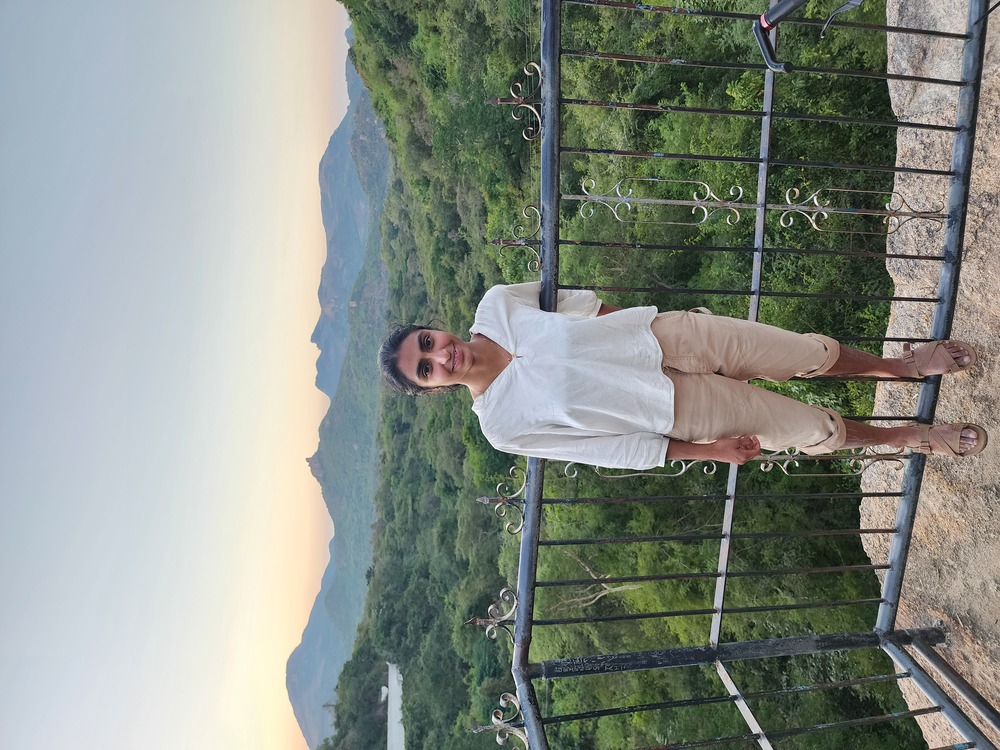
Figure 5: Rithikha † - Dinesh's ginger cat
- She lived in a cupboard with her three newly-born kittens. Serving her loud demands for food (and mimicking her yells) became a routine for me during the event.
- Havoc
The resident doggo. Spends most of the day outside, doing dog stuff. Comes to Jāgā at night to sleep. Honestly not as much of a troublemaker as the name may lead you to believe.
Figure 6: Havoc †
It so happened that the dinner that night was not vegetarian (let alone vegan), so I made aloo aur patta-gobhi ki sabzi (stir-fried potato and cabbage), with Vivek providing valuable assistance. It'd normally take me between 40-60 minutes to make it, but this time it took me almost 2 hours, mainly because I wasn't familiar with this kitchen which was organized so differently from mine and was missing many ingredients.7 Not sure about the reason, really. It could just as well be that the pan lid had three holes in it, letting out steam and slowing down cooking - the cabbage was a little chewy, even though I had covered and cooked it for quite a while. The stove also seemed to not heat as much as mine does, even on the highest flame setting. I think we ate it with red rice provided by Dinesh.
Day 2 (17th): The lay of the land
As I went to bed, the temperature was comfortably cool - enough to not require a blanket. At 4 AM, I woke with a start, found myself shivering, and hurriedly looked for an unoccupied blanket. This change in temperature was a routine nightly occurrence during my time there, and I was more prepared for it in the following days.
We were situated in IruWay Farm, in the village of Hālekote, Tumkur, Karnātakā. There was greenery everywhere, it was quiet, and the air was clean - a welcome change from the urban hell I was living in.
There's no cellular connectivity if you use Vodafone - BSNL and Jio were perhaps the only ones with coverage. The community runs a WiFi mesh network - the Community-Owned Wireless Mesh, abbreviated to COWmesh - which provides Internet access and local network services to the village. The link was down a lot, but it's still a lifesaver if you don't have cell reception. You can read more about it at https://cowmesh.net/ and https://open.janastu.org/projects/cowmesh.
Jāgā
The house I was living in was Dinesh's house, known to the participants as Jāgā. I mentally associated "Jāgā" with its Hindī meaning, i.e. some variation of "awake", but turns out it simply meant "place" or "space".
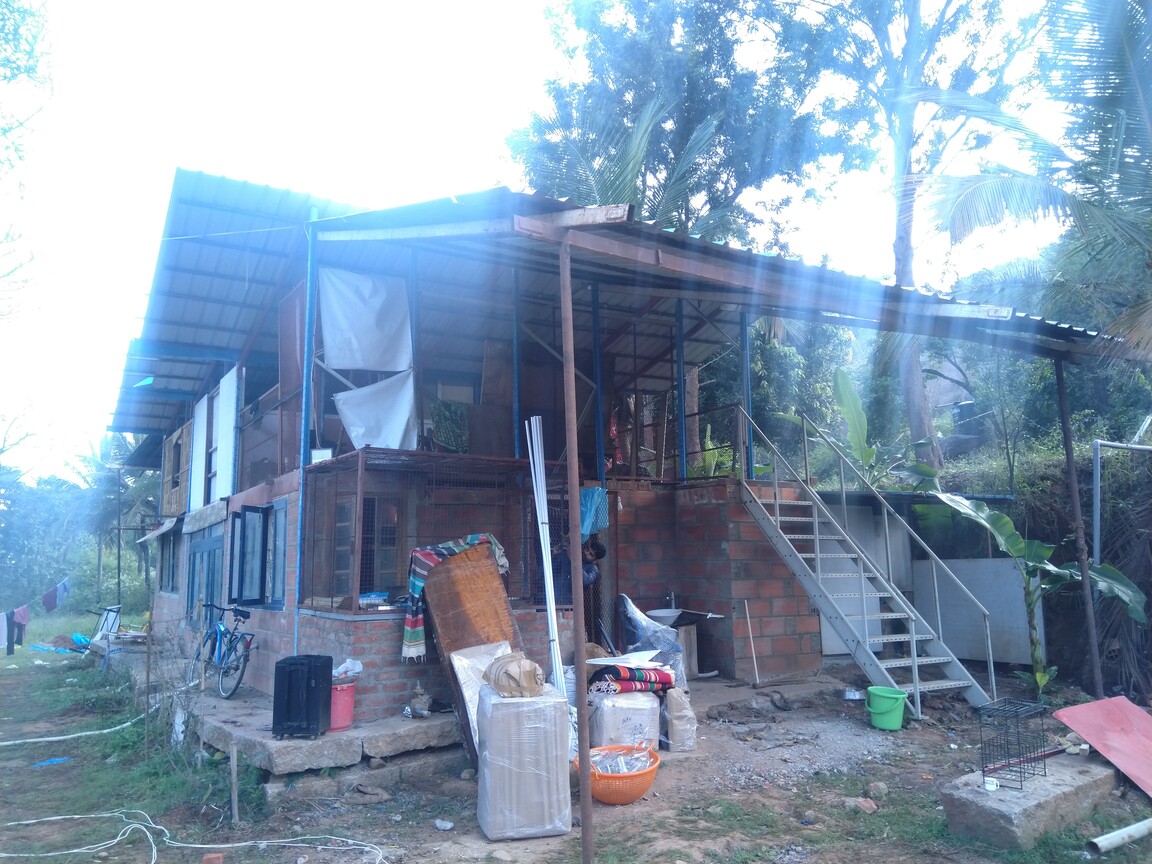
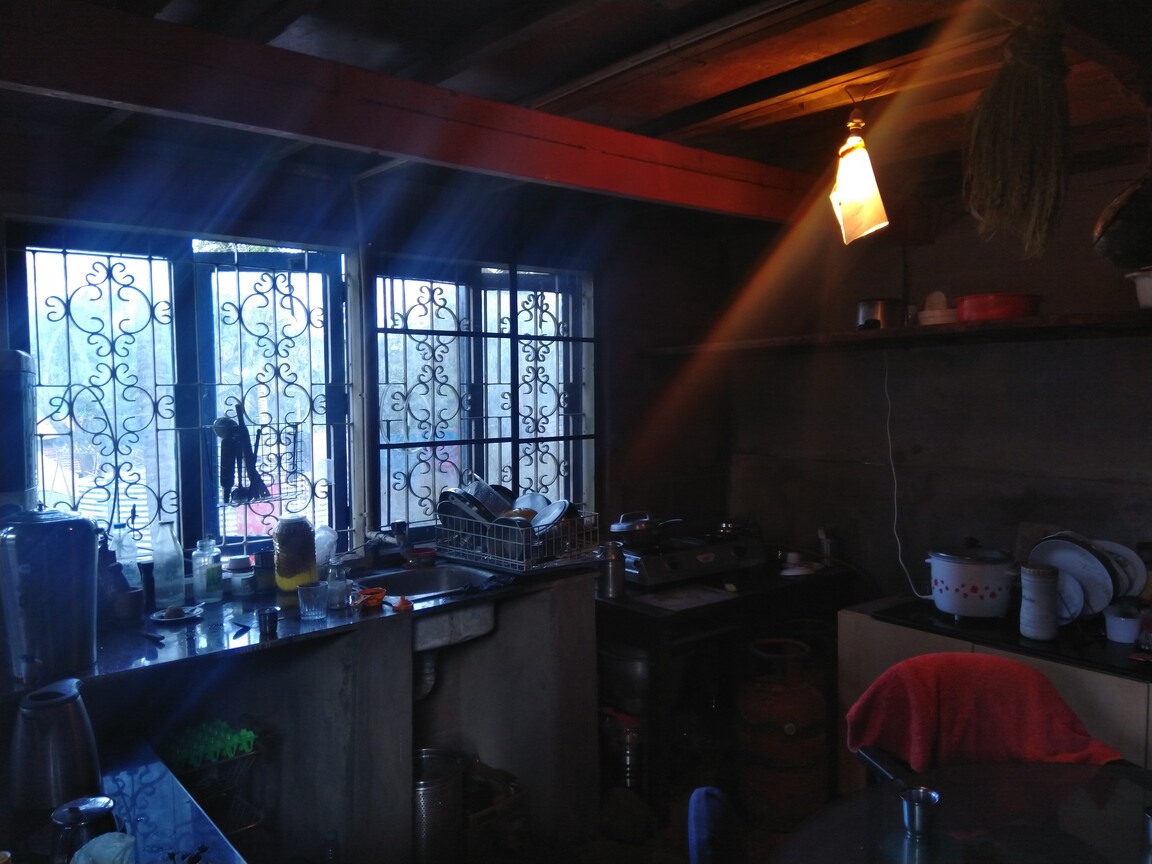
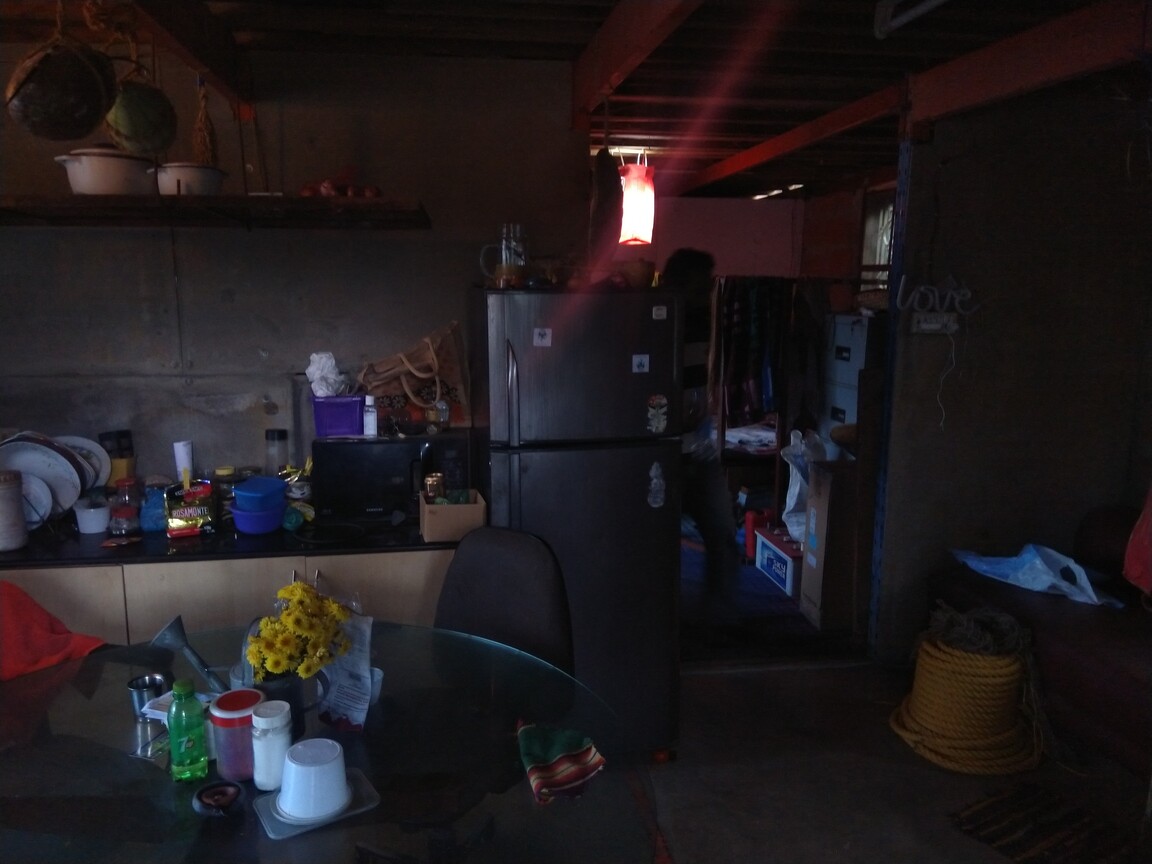
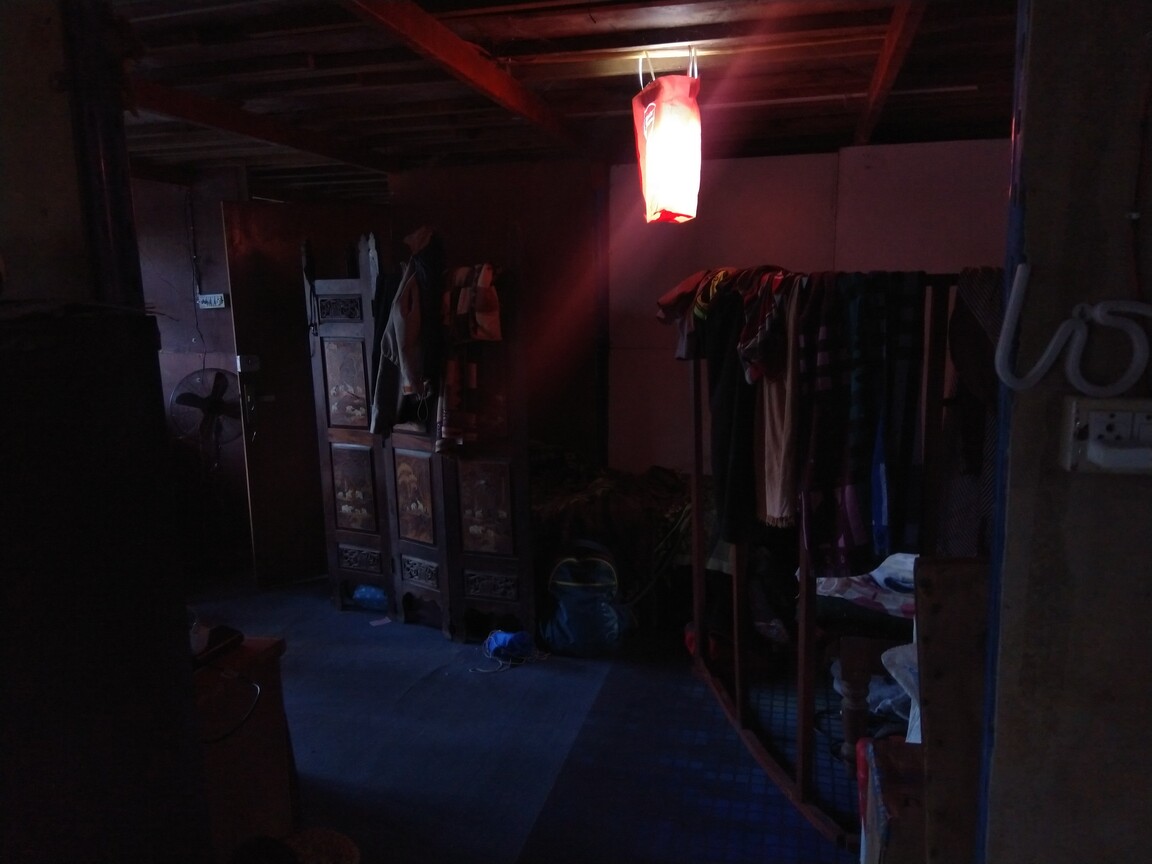
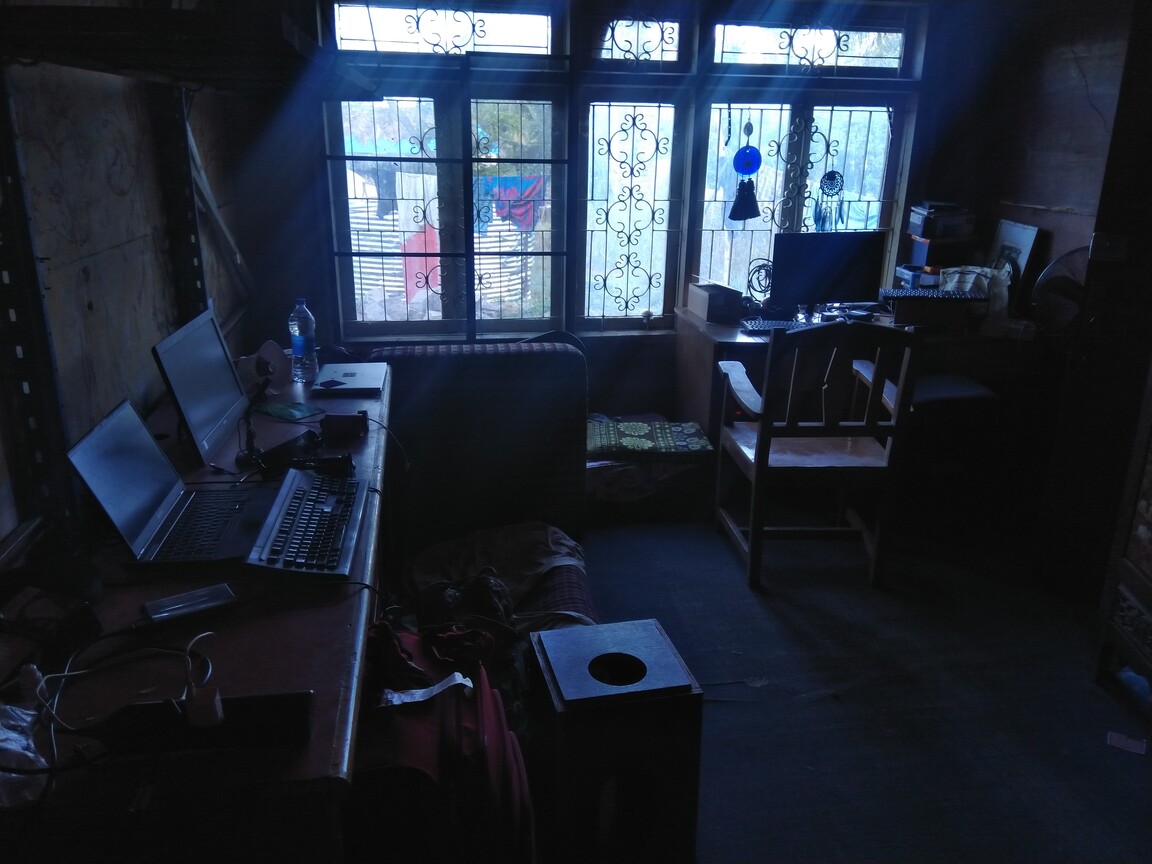
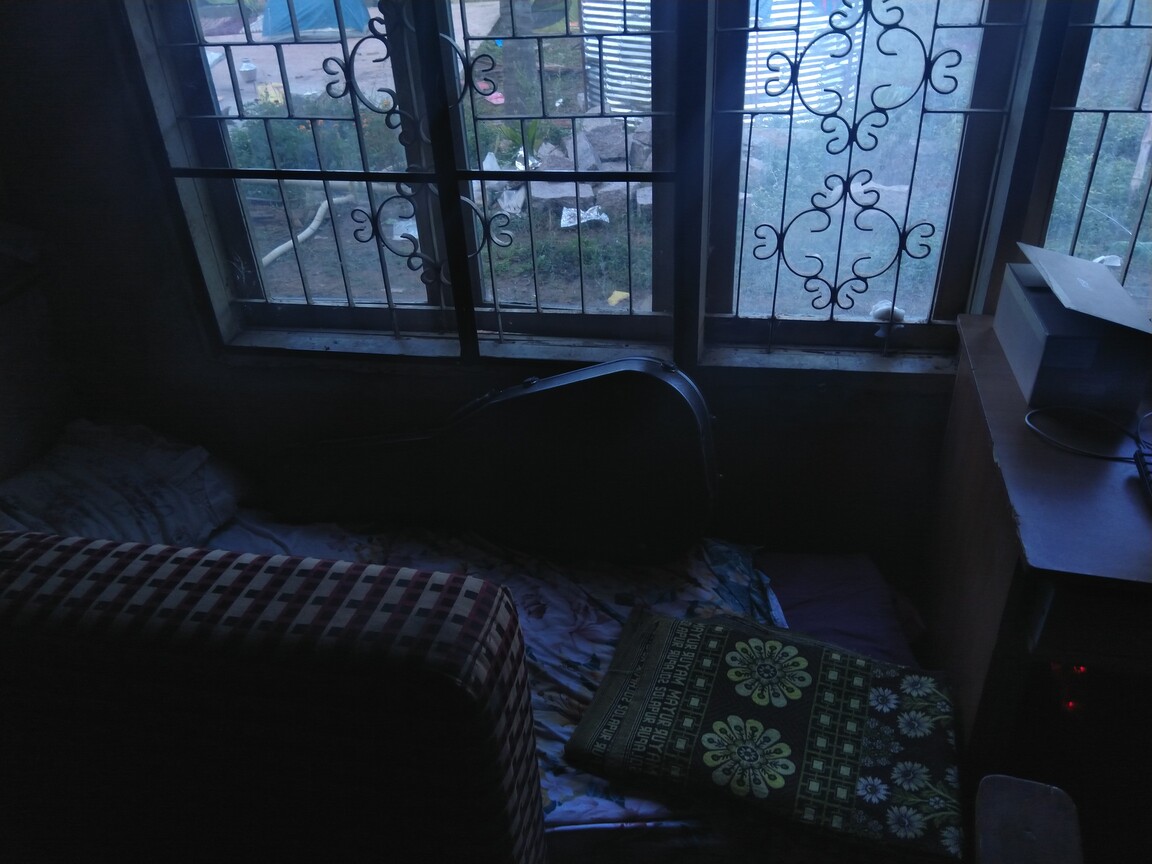
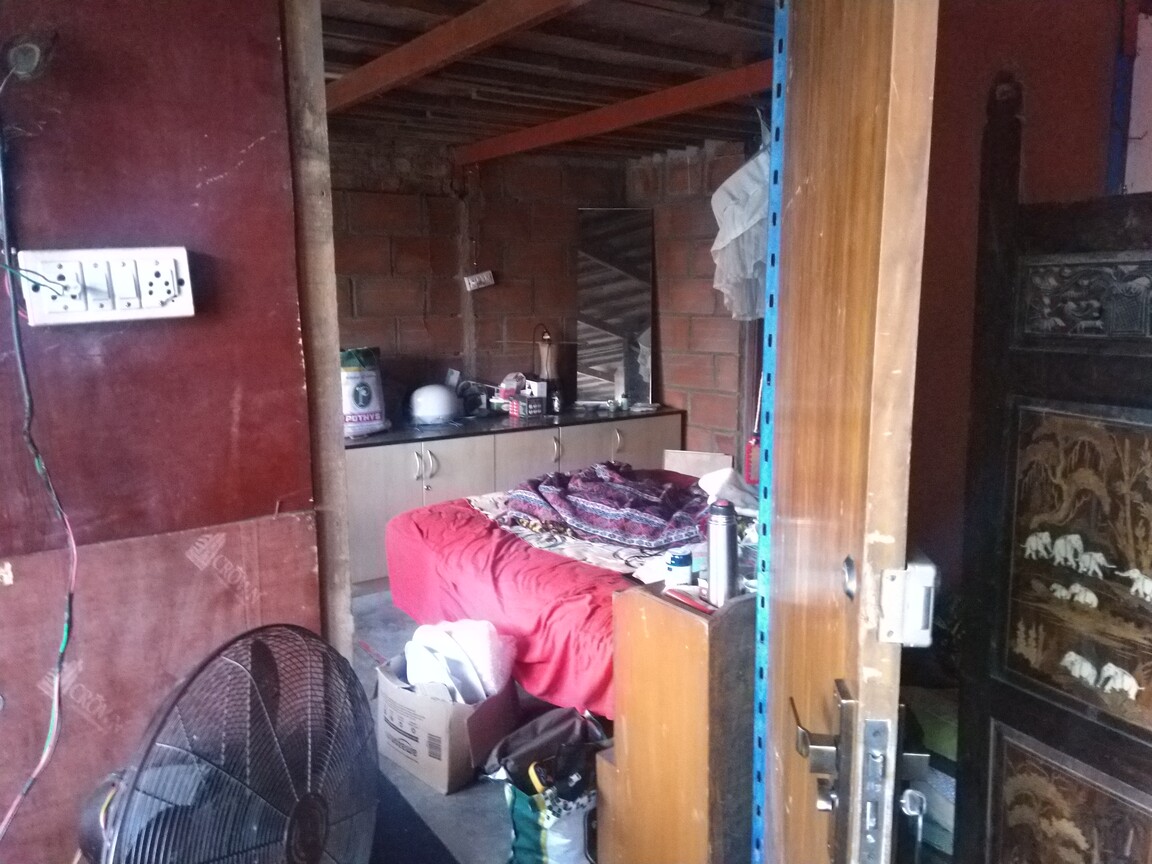
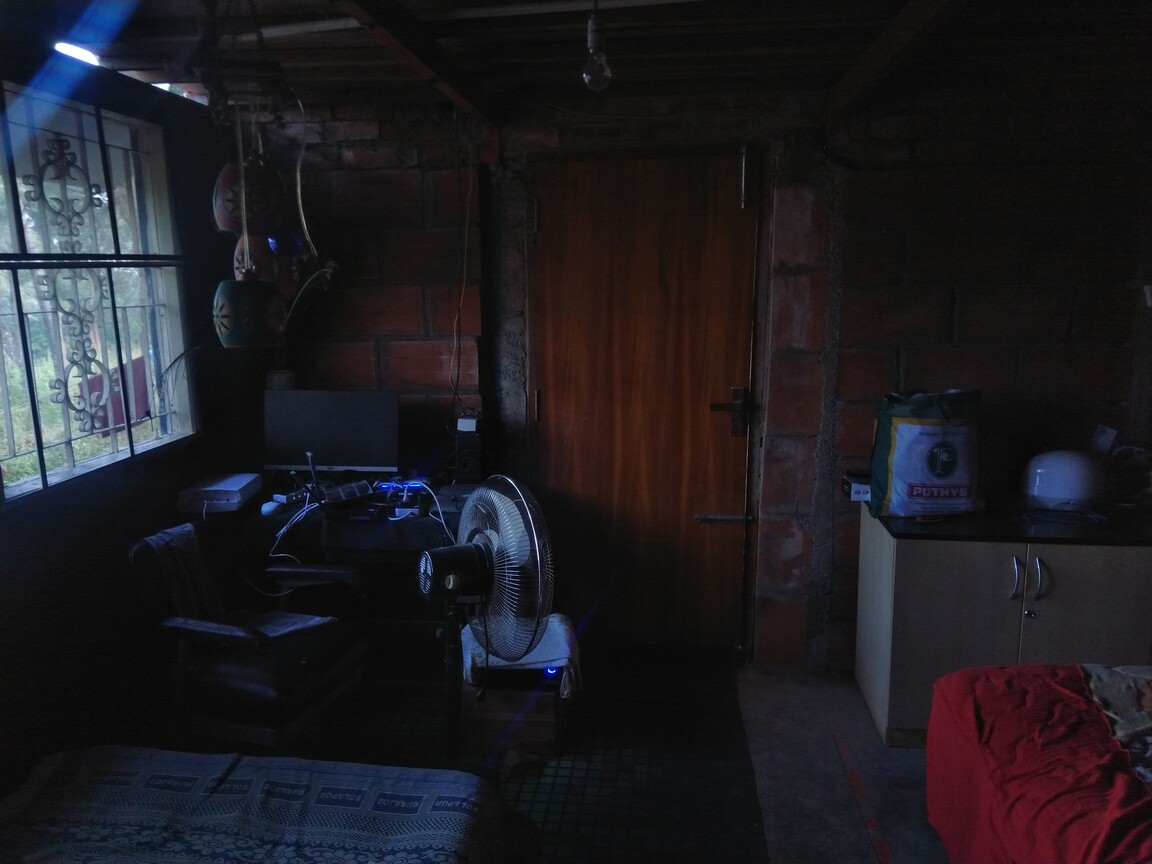
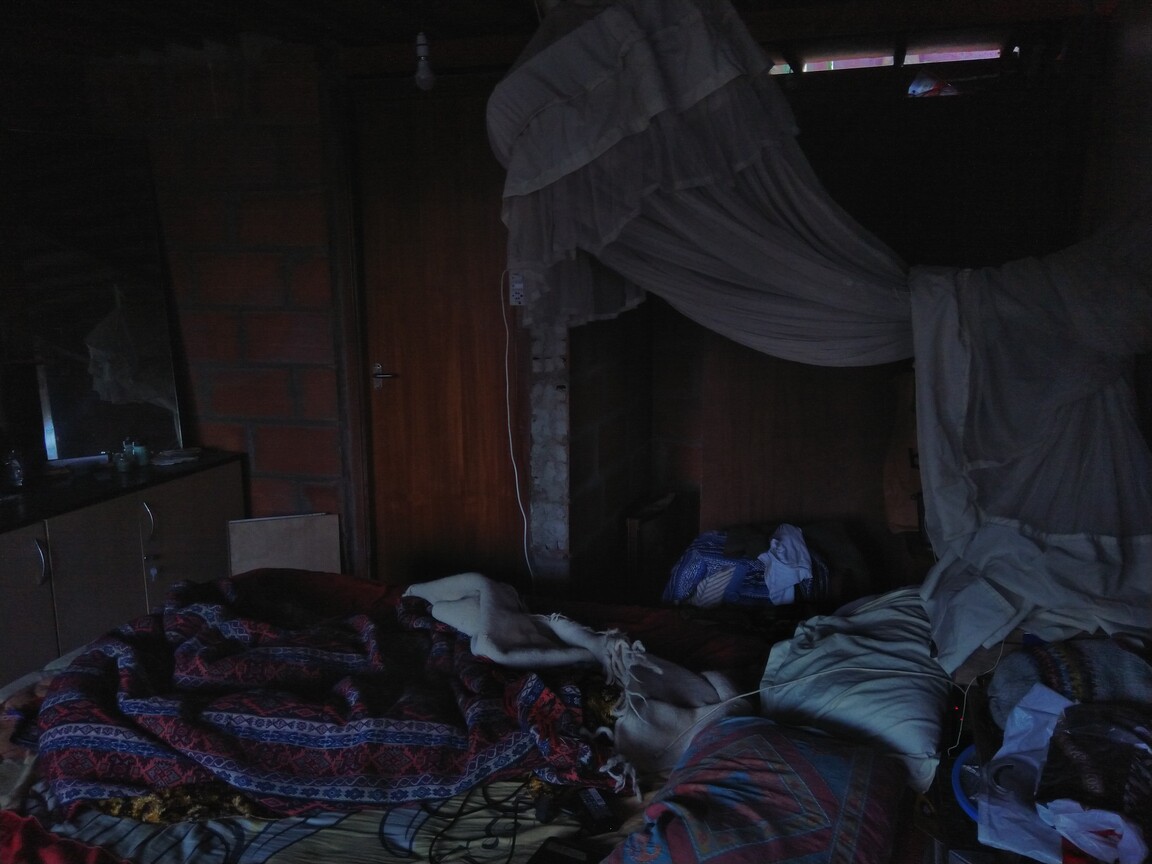
Just outside Jāgā lies a square of concrete where, every morning, one can see people practicing yoga (taught by Sanaj) and capoeira (taught by Hiuré).
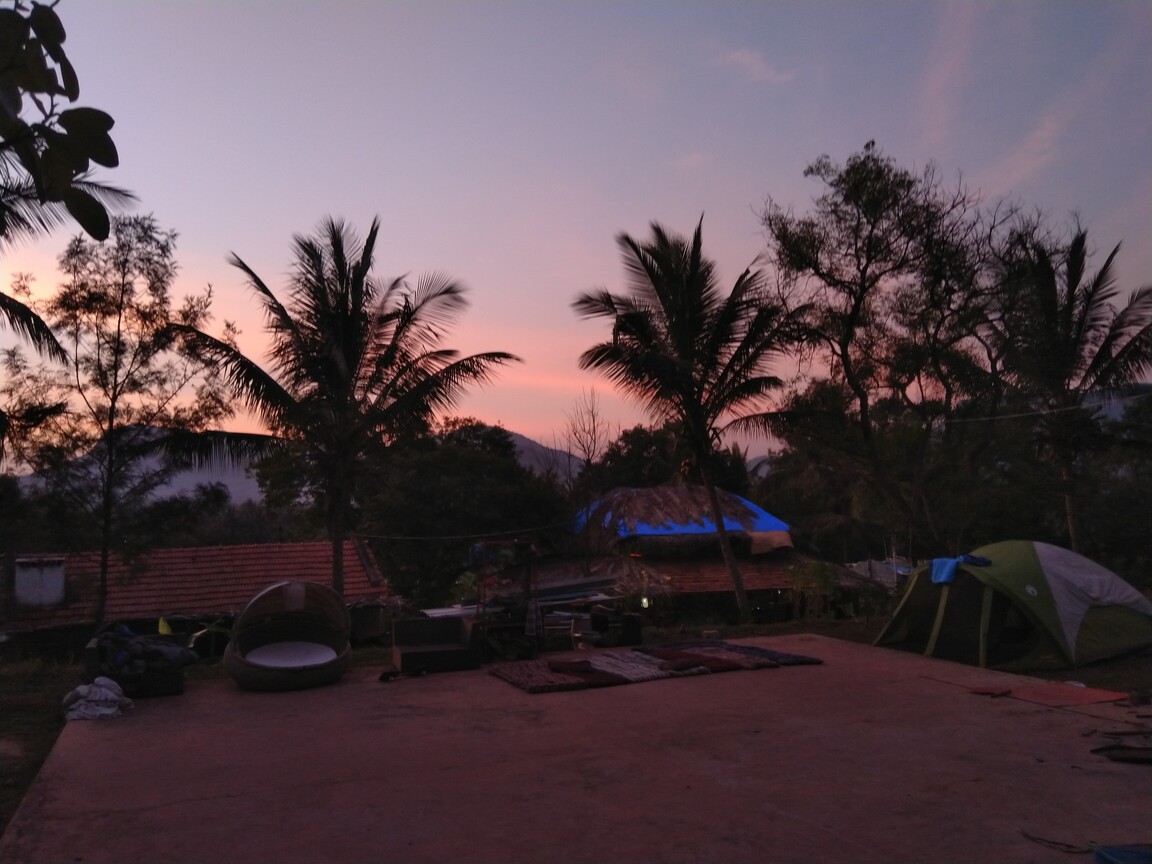
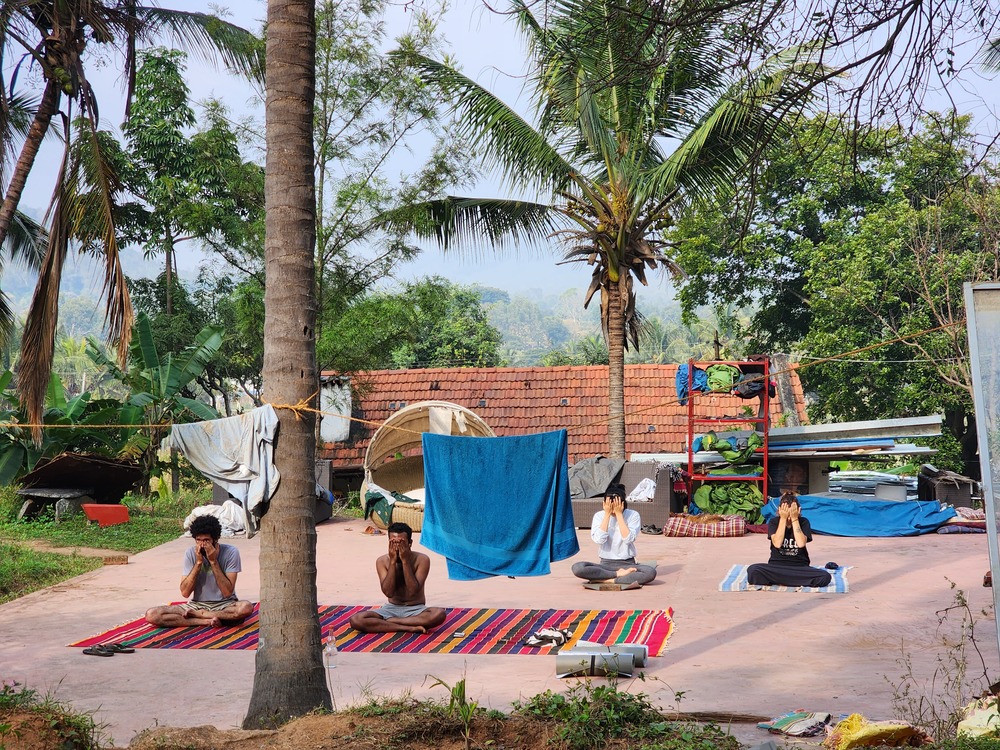
The White House
Walking down the steps leading away from Jāgā brings you to the White House - which is a rather amusing name, since the one in IruWay is nothing like its famous American namesake in aesthetics. It was a dirty white in color. The verandah housed the community kitchen and served as a dining area. The kitchen also had a large sink with three taps, where we would clean up our dishes after eating. Inside was another living space for participants.
I got to meet a number of people at the White House -
- Rām
AKA Voidspace. Sometimes referred to as "Chiguru Rām", to disambiguate him from his other two namesakes at AnthillHacks. I always got a good laugh out of the programming and sysadmin slogans featured on his clothing.
Figure 21: Rām and Sanaj in the White House.† - Tanya
From Brazil. I saw her fixing the Jāgā water filter one day, and an inverter the other - the first instances of hacking (in the sense of tinkering) I encountered at AnthillHacks. Nicknamed "Āloo" and "Batātā" for her love of potatoes.
Figure 22: Tanya in the Red Cottage † - Max Fowler
A soft-spoken programmer and visual artist. He always seemed simultaneously younger and older than me - but he was a year younger. He was one of the people who lived in a tent, set up in the Gazebo at first, and later moved to a relatively remote corner of the mountain. If you have a sharp eye, he may be spotted in the mornings at a great distance uphill, exercising and meditating. Living in Germany for the past few years made him the only person here who knew any German, so we would sometimes converse in German. For some reason, I'd often mistakenly call him "Alex", despite knowing his name.
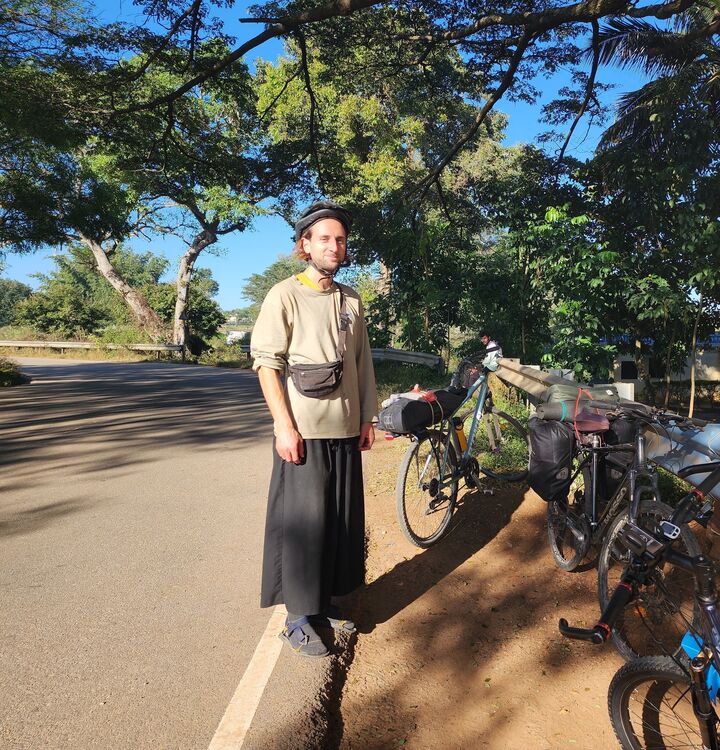
Figure 23: Max. Photograph by Rithikhā.†
The Red Cottage
A few meters downhill from the White House lies the Red Cottage8 Am I the only one who is reminded of the Red Baron? - the de facto headquarters of COWmesh maintenance; the place which puts the 'Hacks' in 'AnthillHacks'. I like how it has four little glass panels in the roof, which allow in enough sunlight that the room does not need any electric lighting during the day.
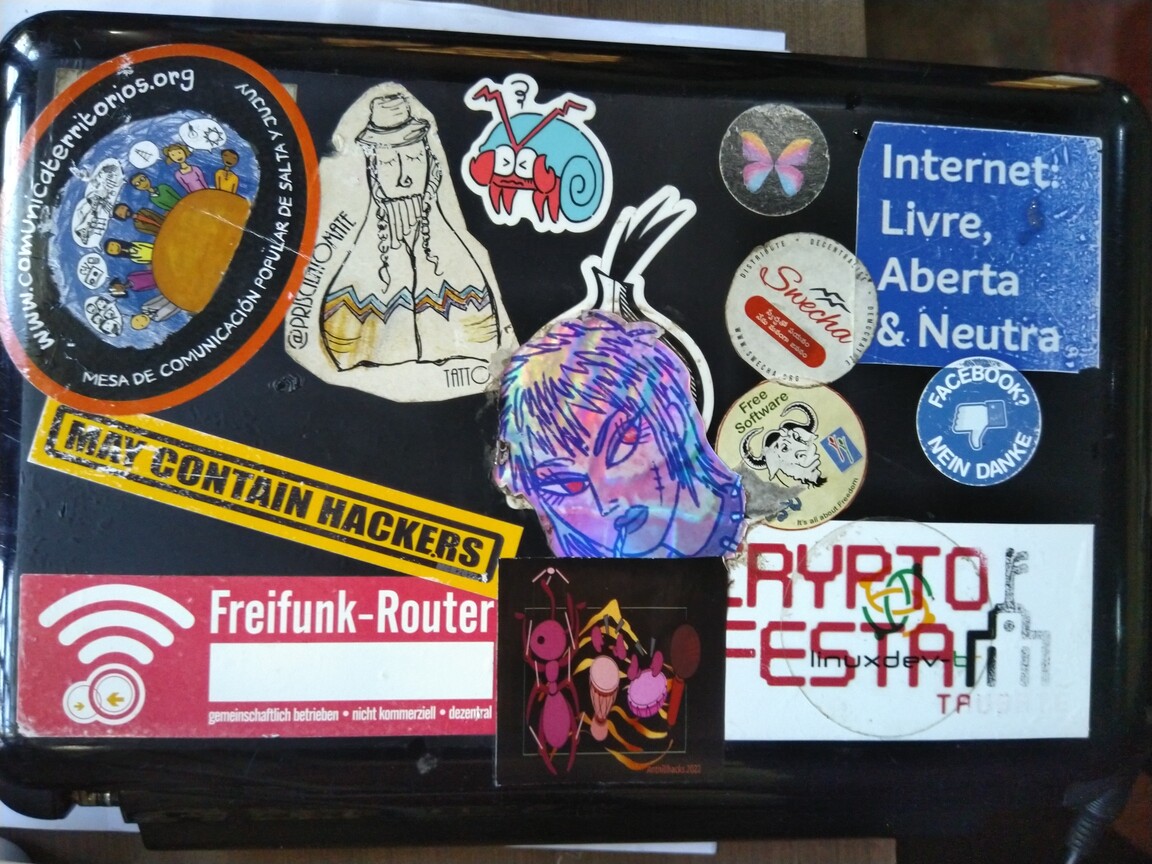
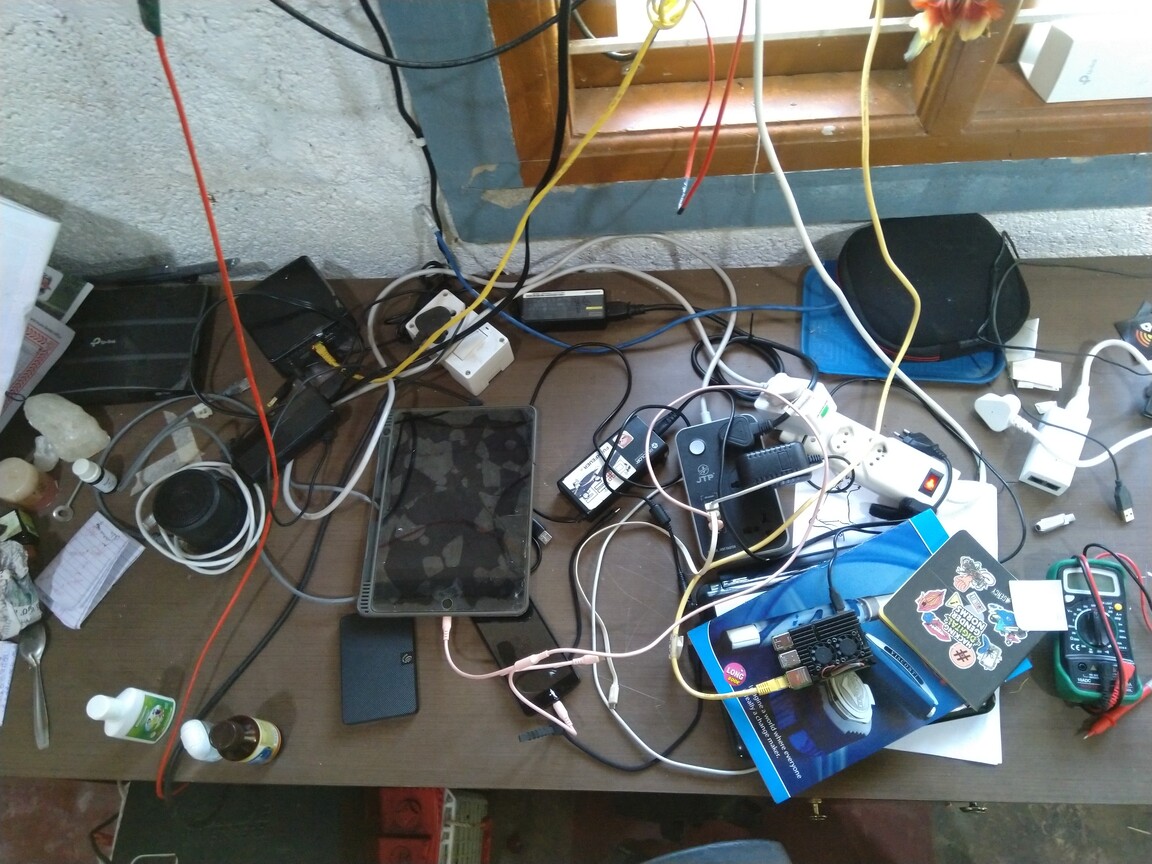
The Gazebo
Right next to the White House is the Gazebo, where the shops were set up, where evening tea and snacks were prepared and served, and where the majority of talks and sessions were held.
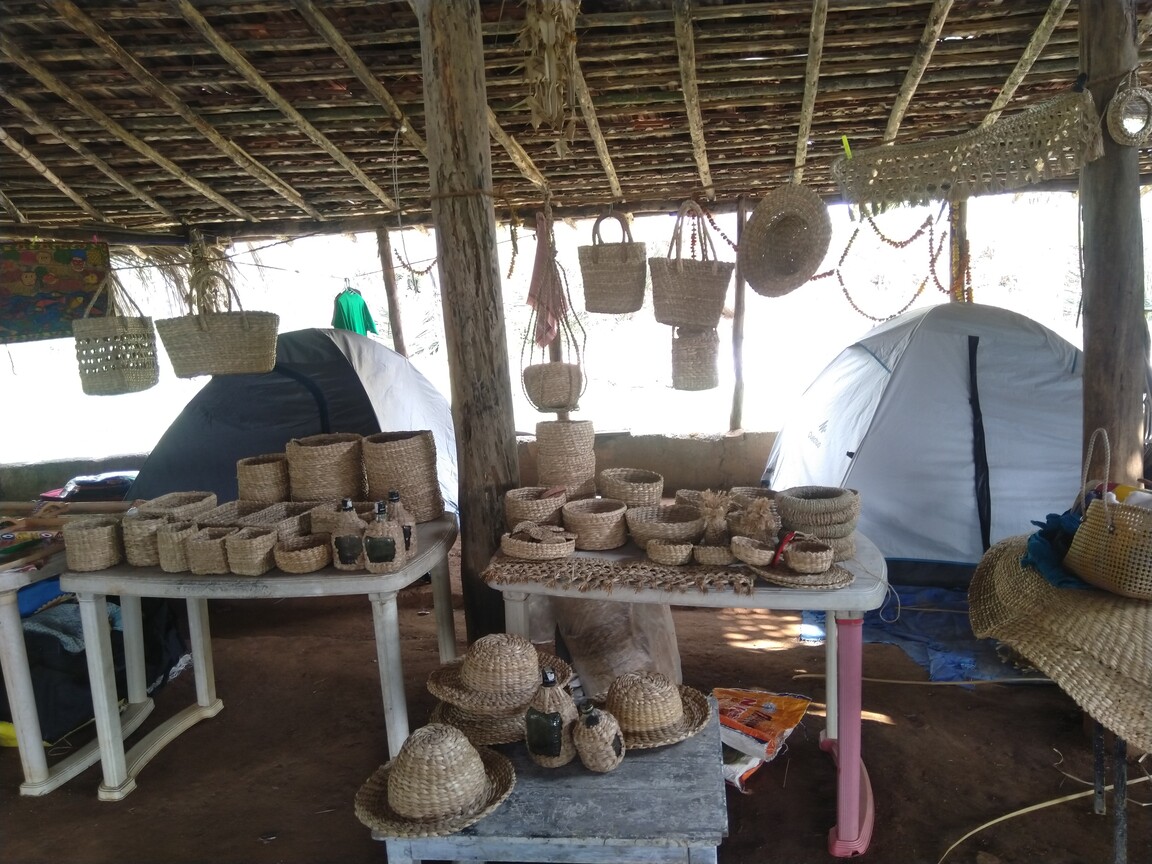
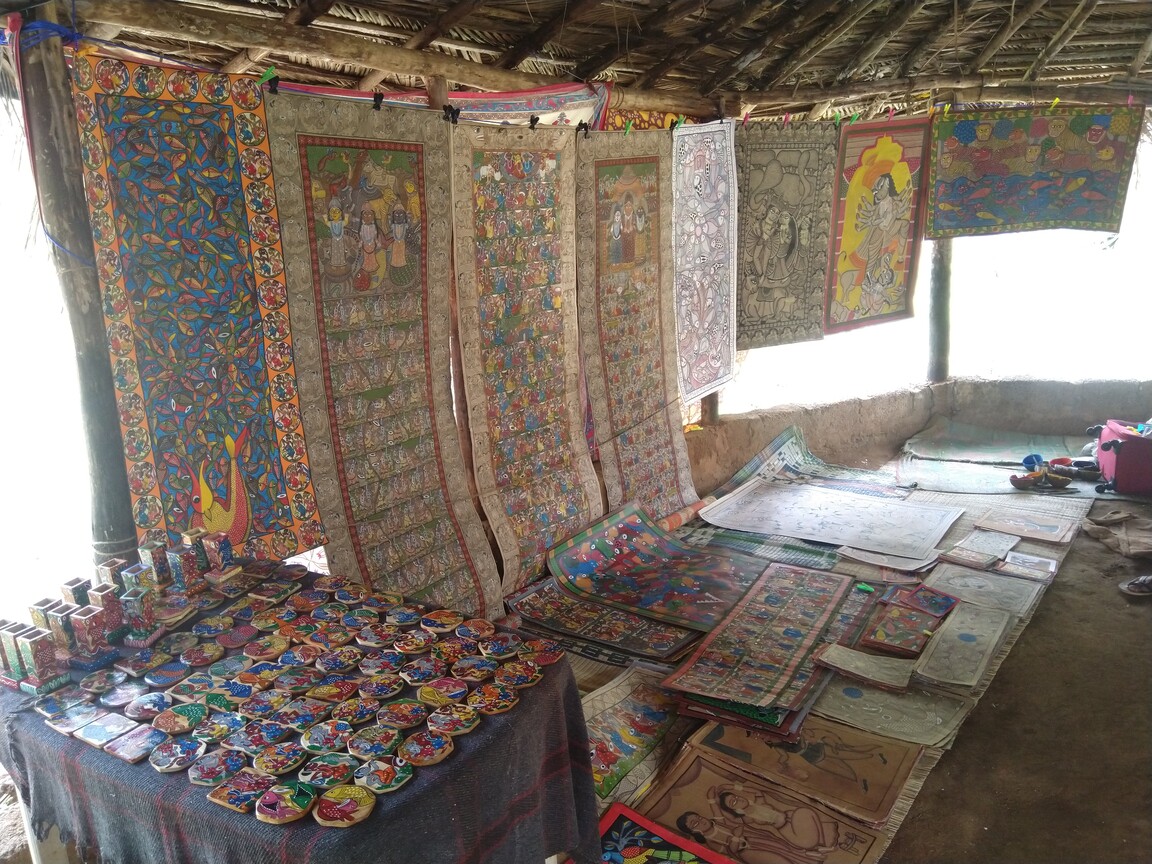
In the afternoon, a trio of transgender women - who were part of a sect of singers known as the Jyogtīs - held a concert in the Gazebo. They sang folk songs, which I regrettably did not understand the lyrics of, although Dinesh did explain the themes of some of them.
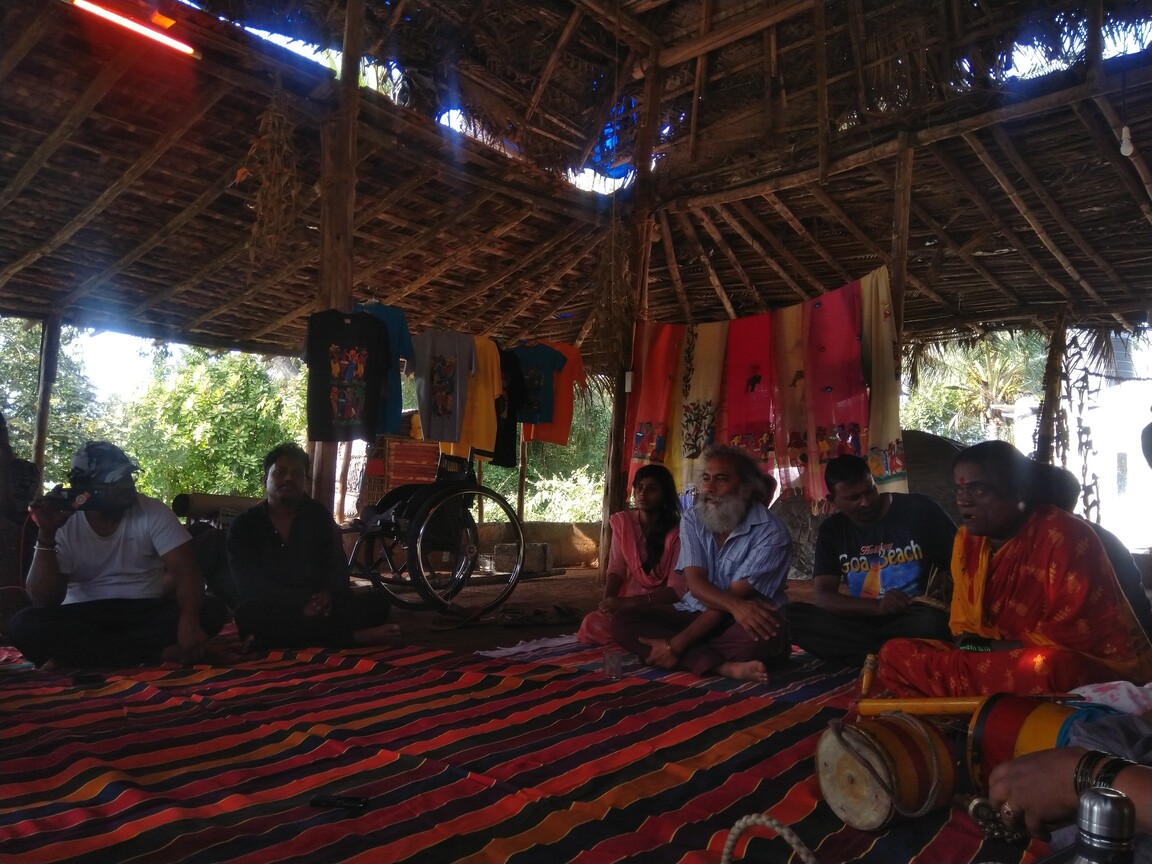
In the evening, I helped prepare pyāz ke pakore 9 At home, pyāz ke pakore meant cutting onions into roundels and dipping them into the wet besan batter - taking care to preserve their shape - before frying them. Consequently, I was a little surprised when Ms. Sarbani asked me to cut them into slices and mix them with dry besan, breaking up the slices in the process. I'm happy to have learned a whole new way of making pyāz ke pakore that day. and ginger-lemon tea for snacks and tea. The participants went down shortly afterwards to help erect the Bamboo Tower, which is exactly what it says on the tin - a bamboo tower, made to bolster the COWmesh's coverage.
Later, we had the session with Agnii, where participants were taught the basics of playing the djembe. It reminded me of my time doing musical theatre, in which I would provide singing lessons to the actors.
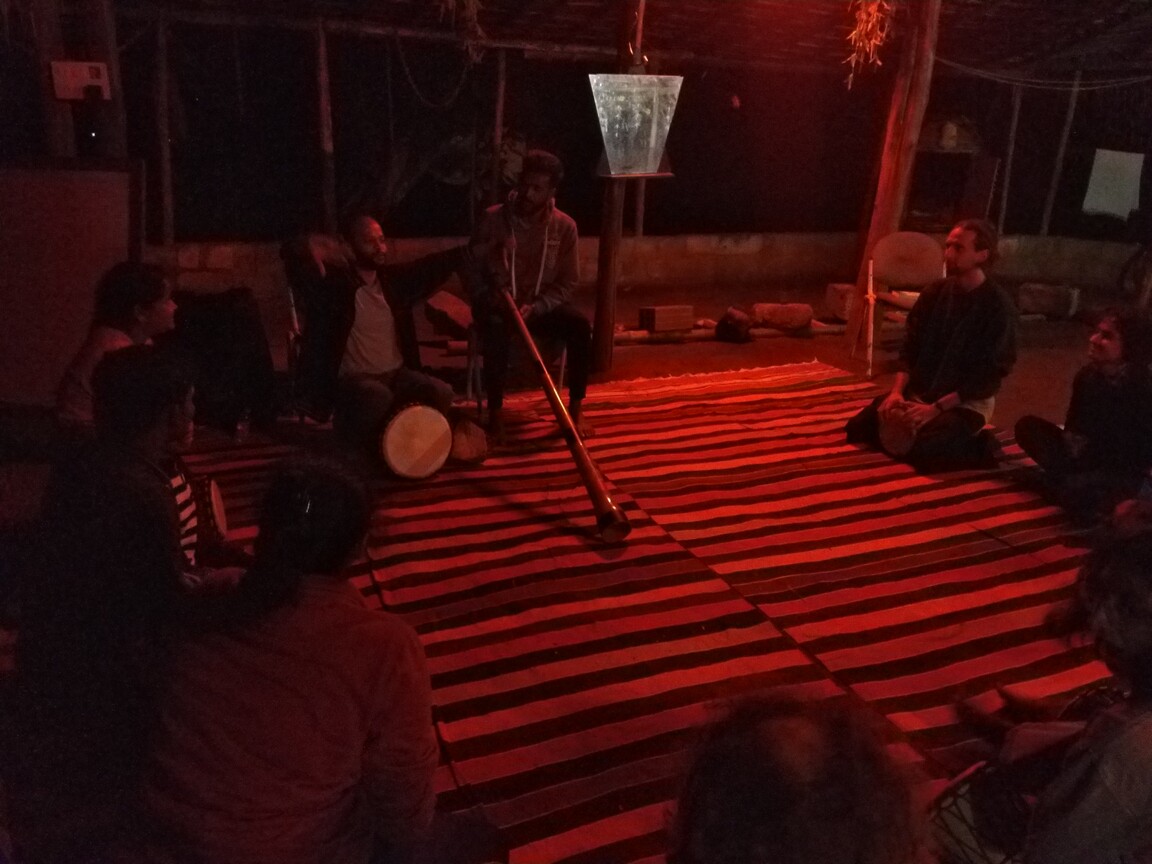
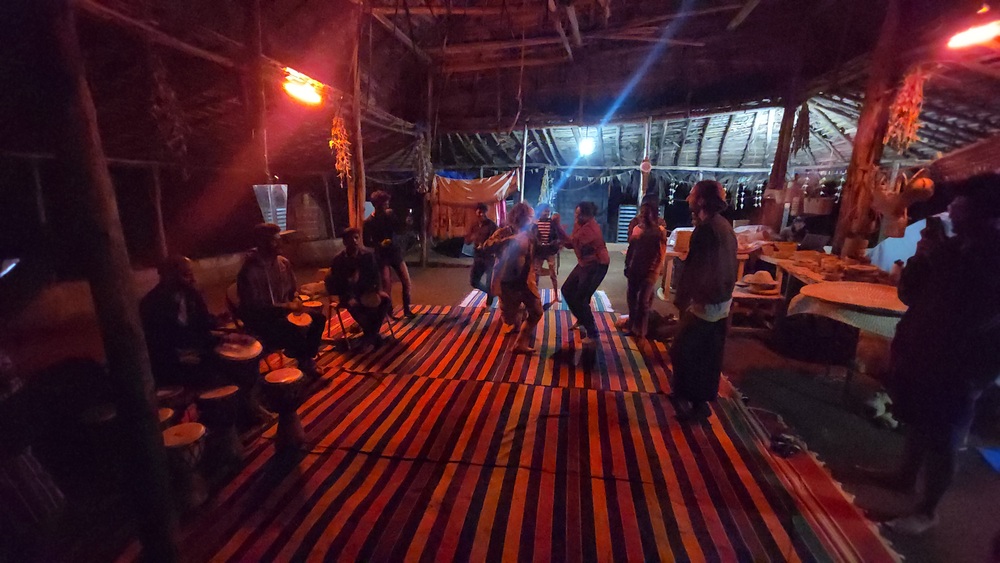
Day 3 (18th): Mud wall, Bamboo Tower
The cat did something in the morning that no cat has done before - she walked over and sat in my lap. A surprise, to be sure, but a welcome one.
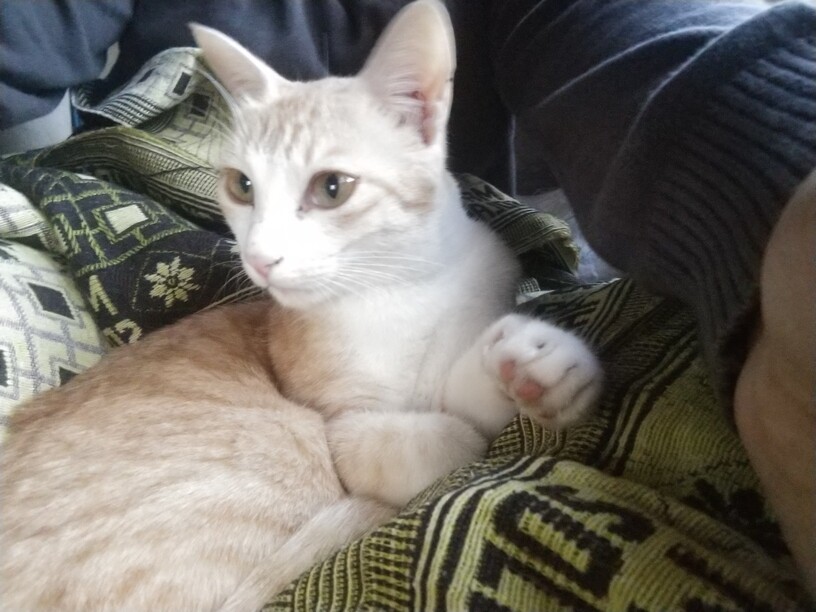
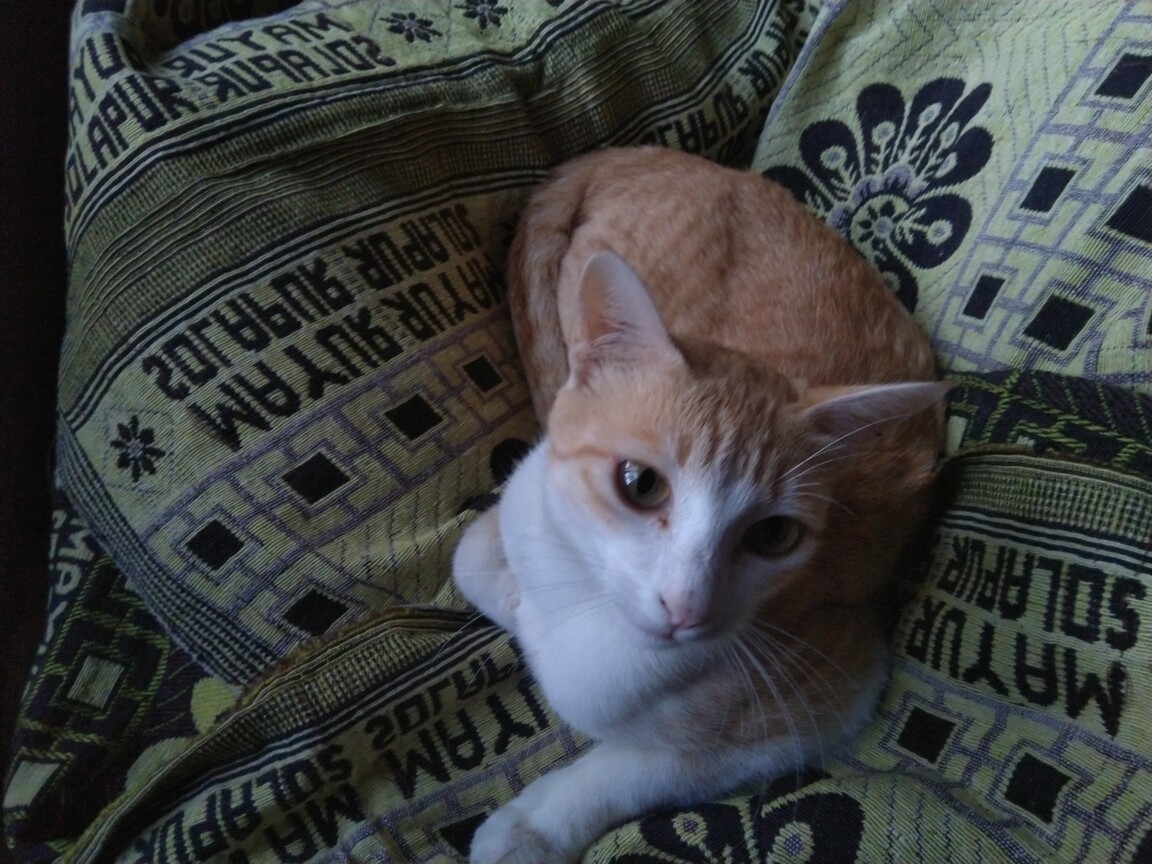
Dinesh was heading to Devarayanadurga to pick up Subrata and Amudhan. I and Vivek accompanied him there, and Dinesh drove us in his ancient Maruti 800 (!)10 I noticed many old cars on Karnātakā roads, like the Maruti 800, the Contessa Classic, the HM Ambassador, and others - cars I saw in my childhood, ones you no longer see running on Delhi roads. I never realized that Delhi's ban on cars older than 15 years was not some global phenomenon. at terrifying speeds.
When we reached Devarayanadurga, my phone surprised me by showing a bar of cell coverage. I took the opportunity to call a few folks as we waited for our co-passengers. We had a breakfast of idli-sambhar, which was a welcome change from the mostly (if not entirely) whole-rice-based dishes the community kitchen had been serving until that point.
Back in IruWay, I was asked (by Sanketh, if I remember correctly) if I would be hosting any talks or workshops. I thought of teaching basic singing techniques for European classical music, like I did in my theatre work, and pitched the idea to Dinesh. A time and place were decided - 11 AM, everyday, at the Gazebo - and I put it up on the events whiteboard at the White House.
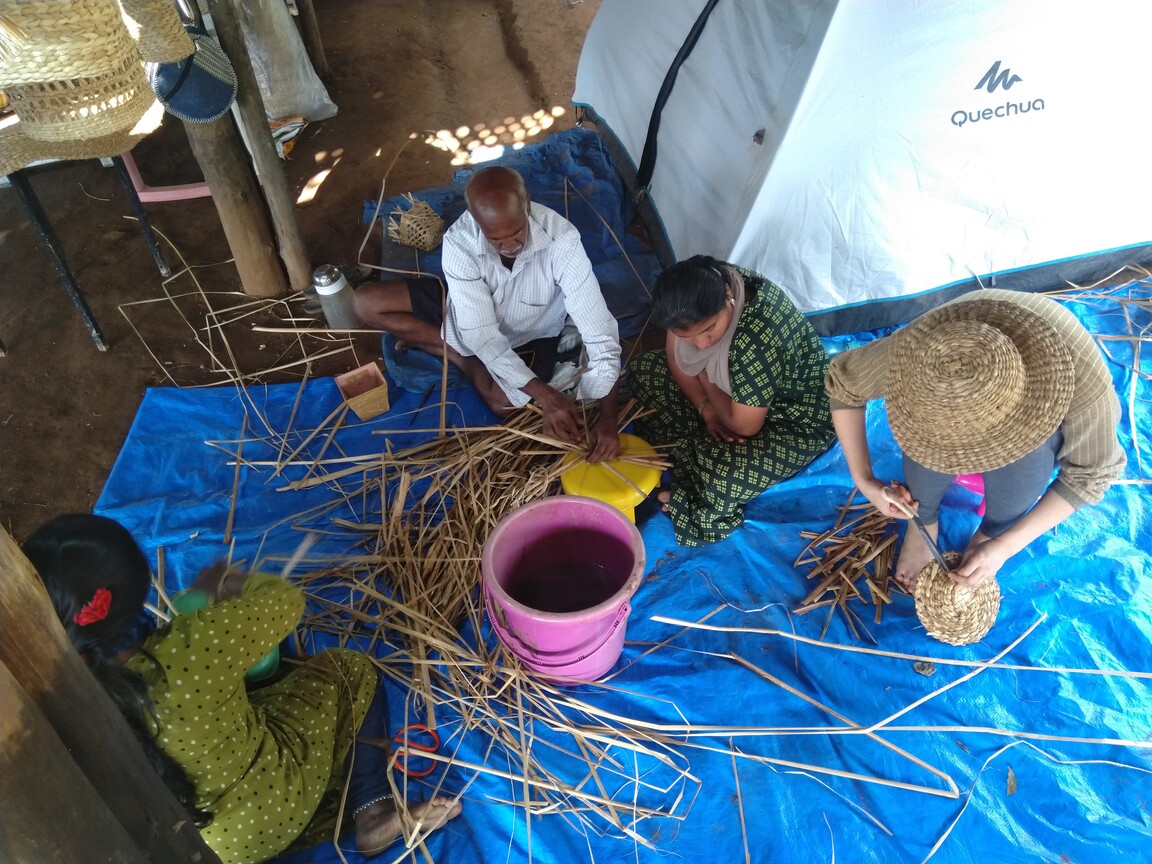
Natural building
Vijaylakshmī, an architect, had been trying to rope in support for her natural building project, in this case with mud. Natural building has been an interest of mine ever since I looked into permaculture. I tried to help by removing stones from the dry soil. Next, I saw Max cutting straw for the project, and helped him with that for a bit11 An unexpected use for my chef's knife. . Next, I observed the three of them prepare the mud by stepping on it with their feet (what Vijaylakshmī called "mud therapy"). The mud-straw-lime mixture was then applied onto the wooden frame which formed a wall on the upper storey of Jāgā.
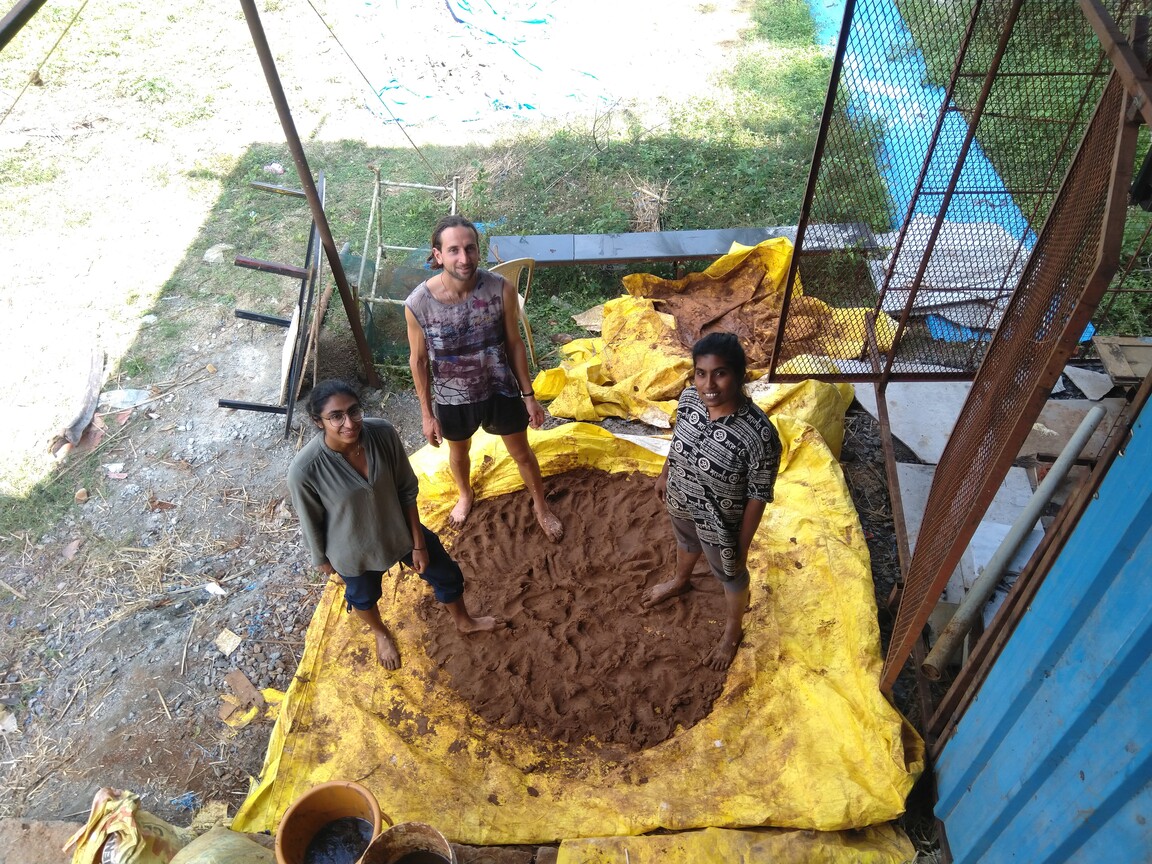
A peaceful, lazy day
One of the highlights of the event for me was Sanaj and I sitting down to listen to Rithikhā sing while accompanying herself on the guitar. We sat just behind Jāgā amidst the unkempt weeds and the trees. The sunlight was strong, but the shade of Jāgā and a mild breeze kept us comfortably cool. It was an utterly serene and idyllic moment of quiet relaxation. Rithikhā's soft singing and plucking of the guitar complemented this setting, reminding me of the music of Nick Drake and Mountain Man.
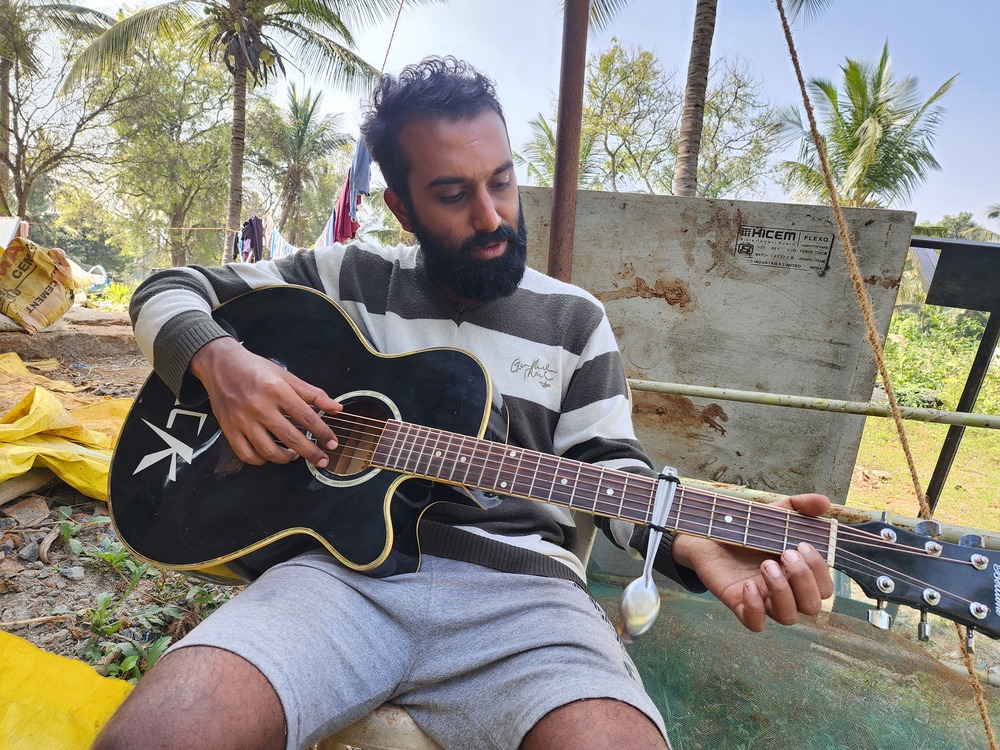
Later, the three of us joined Max in repairing his bicycle - which for the three of us mostly involved lazing on a couch outside Jāgā, trying to download relevant videos on bicycle repair and serving as rubber ducks for Max. I got to introduce someone to F-Droid and NewPipe, which is always a pleasure. (The download functionality of the latter was helpful for watching videos over the patchy network we were experiencing.)
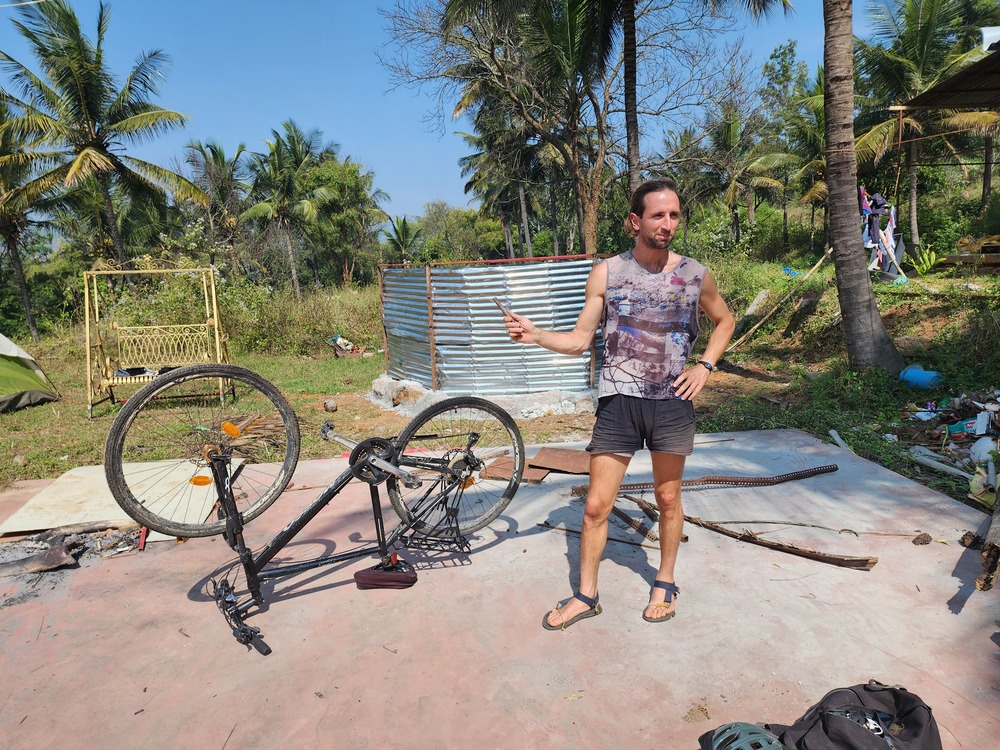
Inaugurating the Bamboo Tower
In the evening, I was asked to get my guitar to the Bamboo Tower, to accompany a performance by the Jyogtīs. The Jyogtīs and the audience were all seated on a carpet placed over tilled land, which made sitting uncomfortable for me. I wasn't confident in my improvisation skills, but ended up feeling satisfied with my output that evening. Especially considering that the songs I was accompanying were songs I had never heard before. Not sure how much of the guitar made it into the recordings, however.
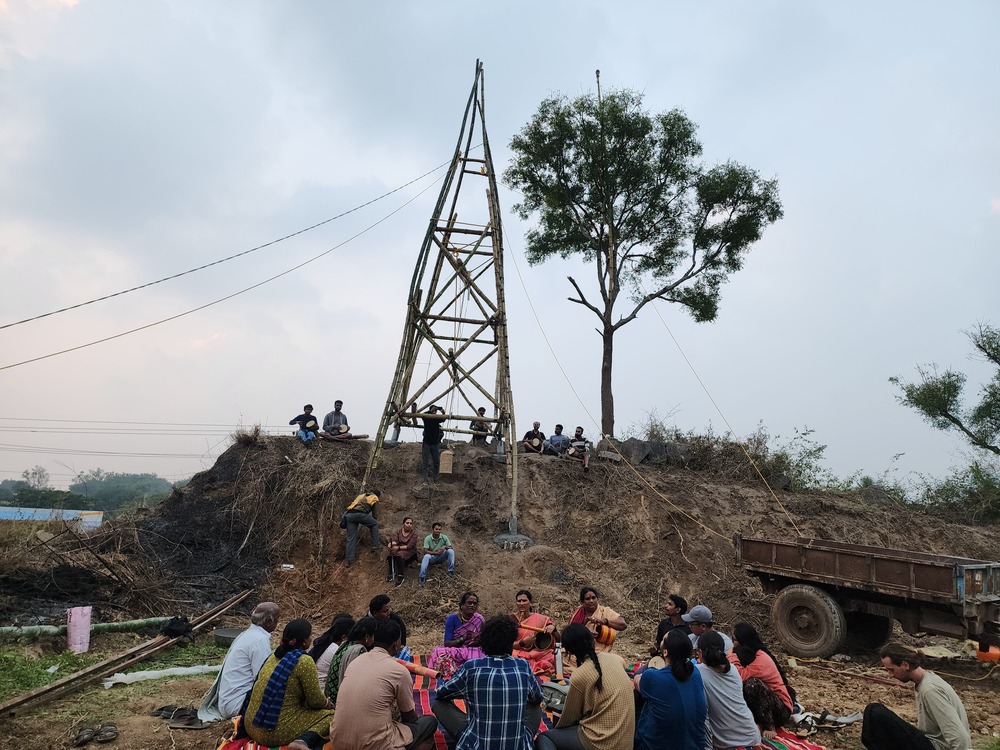
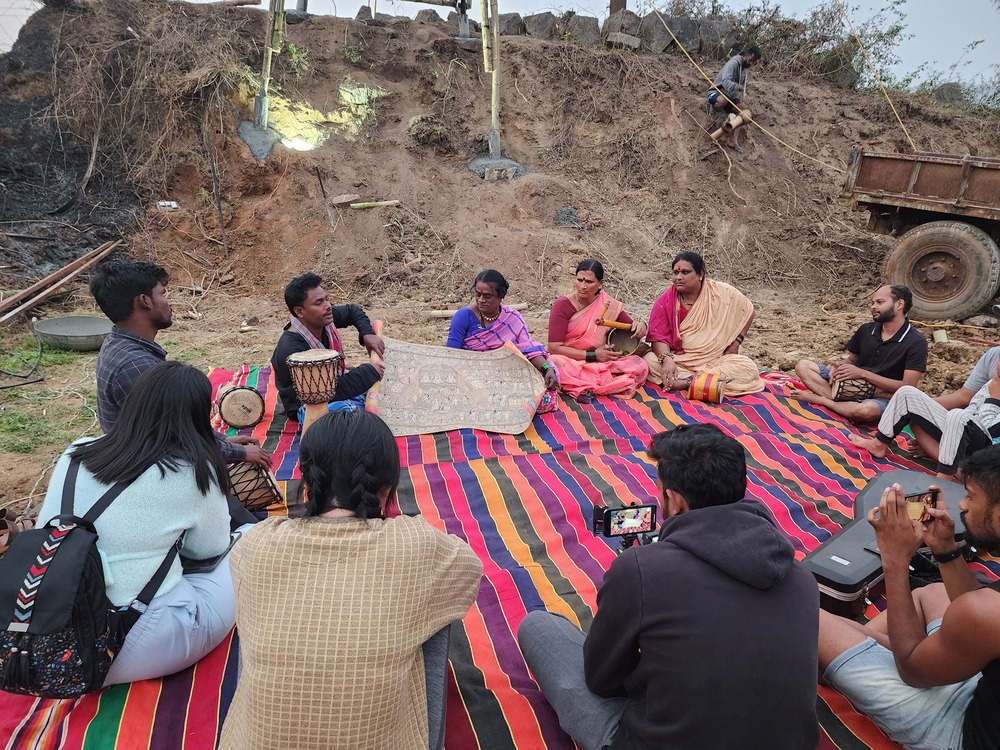
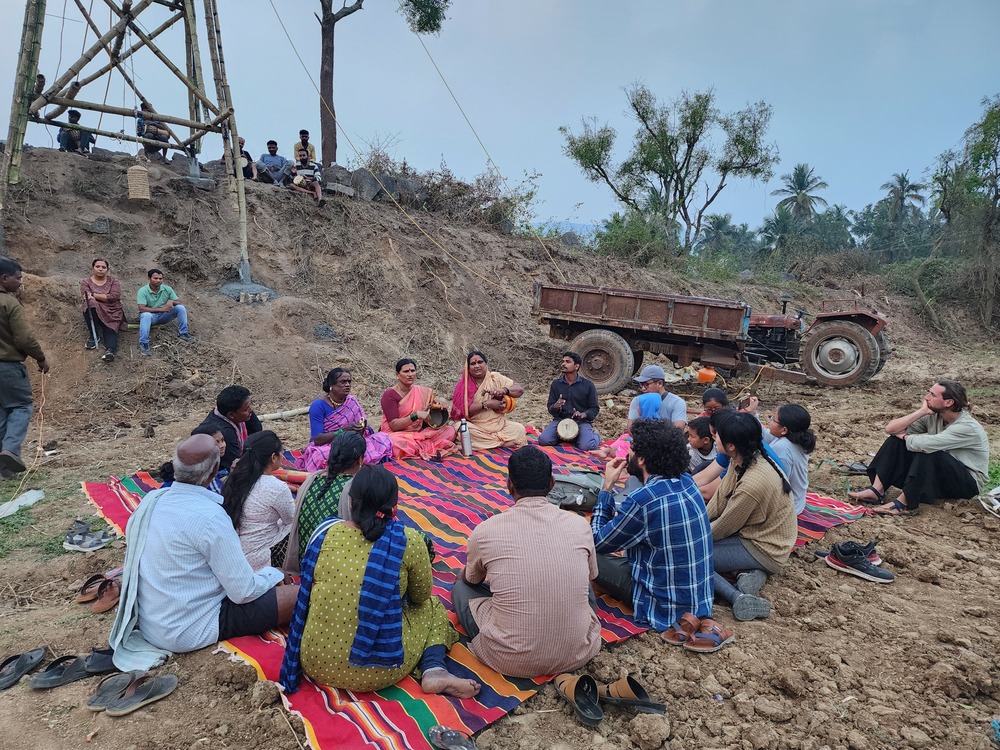
One of the Jyogtīs performed a ceremony to ward off the evil eye. A few photos were taken, and we all walked back up to IruWay.
Cooking with Vijaylakshmī
It turned out that there was no dinner made that day. I looked around the ingredients in Jāgā and the community kitchen, but there wasn't enough of any ingredient to serve ten or twenty…I couldn't think of anything I could make with what was available. Fortunately, Vijaylakshmī came to the rescue and guided me and the others to prepare a pulao-like dish.
Jenugundu
Many people had mentioned this place called "Jenugundu", and I had struggled to understand where it was located. Amudhan was staying there and wanted somebody to drop him off, and I wanted to know where it was, so Sanaj drove us both there on a scooter. I was a little nervous about triple-riding without a helmet on such a bumpy road, although we made it through the 5-minute ride without incident. The scooter struggled to get the three of us through the uphill road which led to the main gate. After entering, the road took up an even steeper incline and had a surface of large rocks, so I opted to disembark and walk.
"Jenugundu" referred to Jenugundu Jungle Trail, a hotel/resort in Hālekote. It was a pretty large establishment, with rooms spread across various buildings, multiple campfire sites with benches, and a swimming pool. I tried to add as many waypoints as I could to the GPS trace I was recording, with the aim of adding the data to OSM when I got back to an area with Internet connectivity.
Movie night
A small group (including Sanketh and Hiuré) gathered in the kitchen of Jāgā, watching the FIFA World Cup Final on a laptop and my Bluetooth speaker.
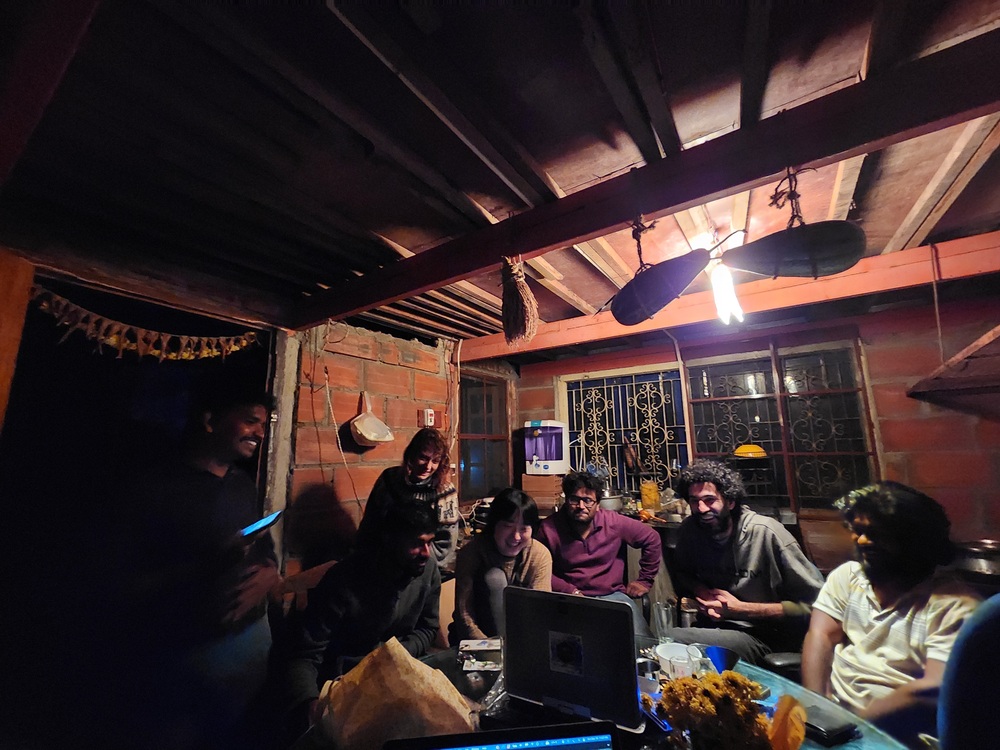
Perhaps taking inspiration from that, I proposed later that night that we - Rithikhā, Sanaj, Vijaylakshmī, Rashmī, and Shālinī - watch a film. Somehow, we ended up choosing Studio Ghibli's popular anime movie, Spirited Away - a few of us had seen it already, but wanted to see it again. I set up my laptop and speaker in the middle room of Jāgā - the laptop on a stool, and us sitting on the (carpeted) floor. Dinesh joined us midway. Most were asleep by the end, worn out from the long day…but it's not often that I get to watch a movie with others, nor very often that I get to introduce somebody to the experience of a film that I trust they will like, and I was happy for that.
Day 4 (19th): Cycling for pizza
At 11 AM, I taught my first singing session of the event. We worked on breathing, posture, and lifting the soft palate, before going into some simple songs. The students included a group of women from the village, who had prepared a song of their own.
For the past few days, I and some other participants had been asking for the addition of fruits to the food provided. Today, I decided to see if I could get some fruit from the nearby village of Durgadahallī. Additionally, there was talk that we would be making pizzas in the evening. I've seen recipes for vegan mozzarella which use tapioca powder as a base, but had never tried making them. In Delhi, tapioca powder is only available in South Indian grocery stores, so I figured I might find it in Durgadahallī.
I asked Sanketh if I could borrow his bicycle.12 AnthillHacks provided some rental bicycles for the participants, but I preferred to ride one which had gears. It had been many years since I had had a bicycle to ride, and the terrain going downhill from IruWay was a tricky one to begin with - the slope provided dangerous boosts to speed going downhill, slowed you down to unstable speeds going uphill, and the highly bumpy path further complicated matters. Regardless, it was exciting to be back in the saddle again - a world of possibilities had opened up.
The nearby villages
I cycled to Durgadahallī with Max and Pseudo, taking note of any grocery stores we could find. We had heard about lakes in the vicinity of IruWay, and it was to one such lake we now headed, through the neighbouring village of Timmanayakanahallī.
The road to the lake was, like the one leading to IruWay, dusty and very uneven - the kind you might hold motocross events on - but mercifully without the steep inclines you find on the hill. I struggled to get used to the shifters - I would always shift down when I meant to shift up, and vice versa, Eventually, I figured out a mnemonic - if you're struggling to push yourself uphill, push the bottom lever; if you're pulling along just fine, pull the top lever. That takes care of the right hand shifter - the left hand shifter works in the opposite way. 🙃
At the lake, I was a little surprised to see that my companions went in for a swim; more so when I realized that they were skinny dipping. I've never known anybody be so comfortable in their skin as to do that. I did not join them, and contented myself with taking pictures of the lake and guarding the bicycles. While I find the world's hangups about the human body not merely superfluous but also harmful, I did not possess that kind of confidence.
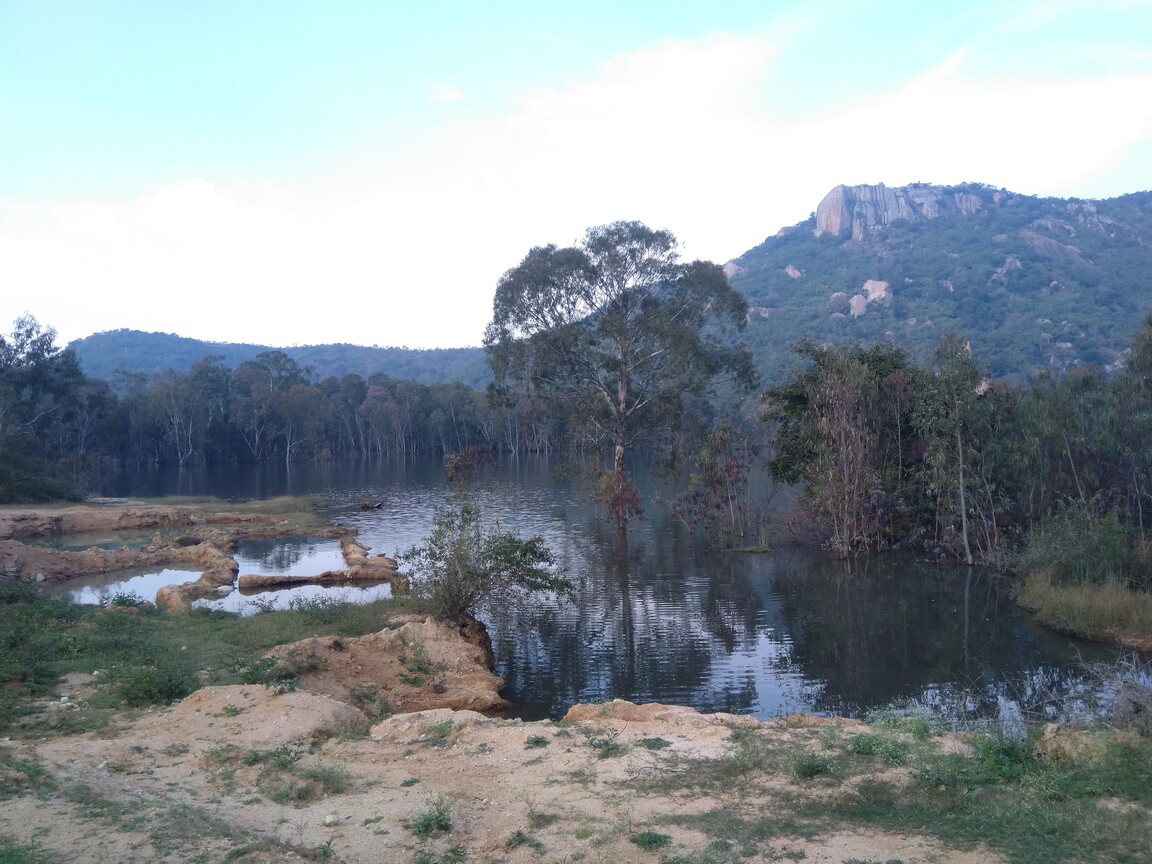
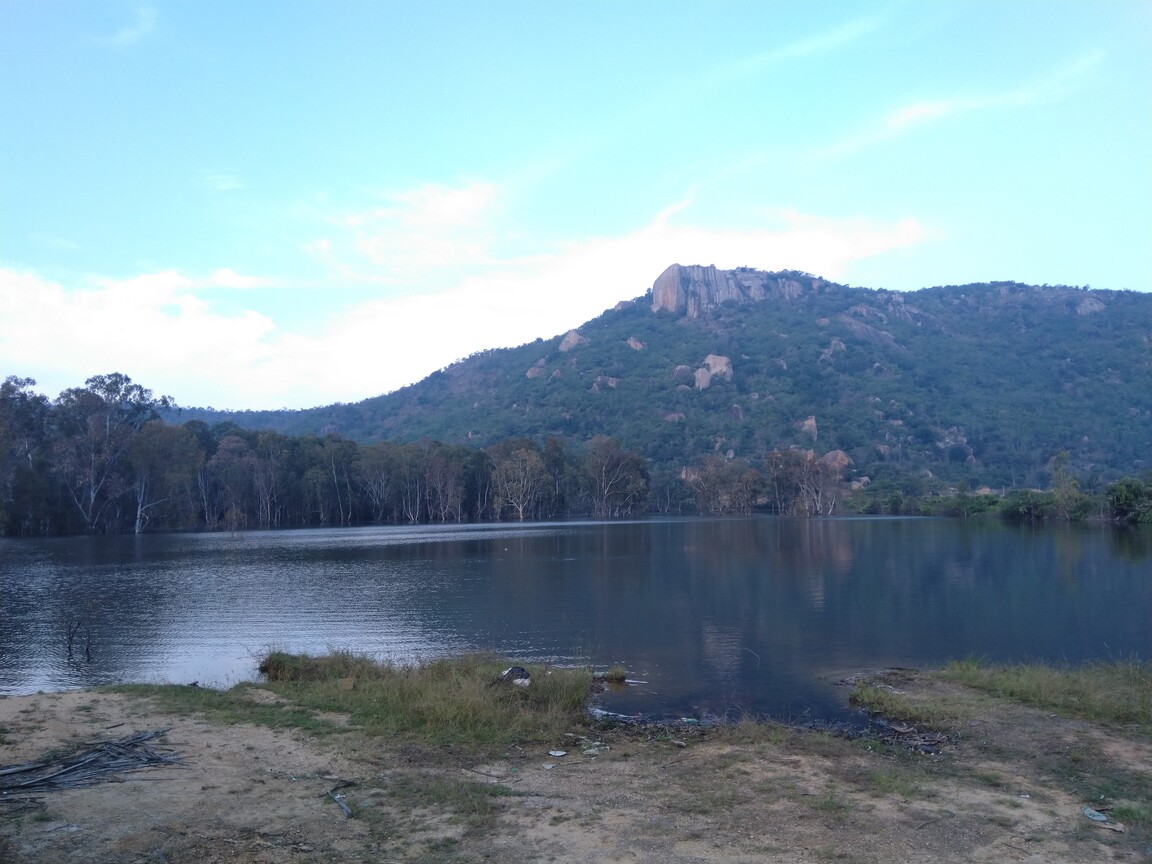
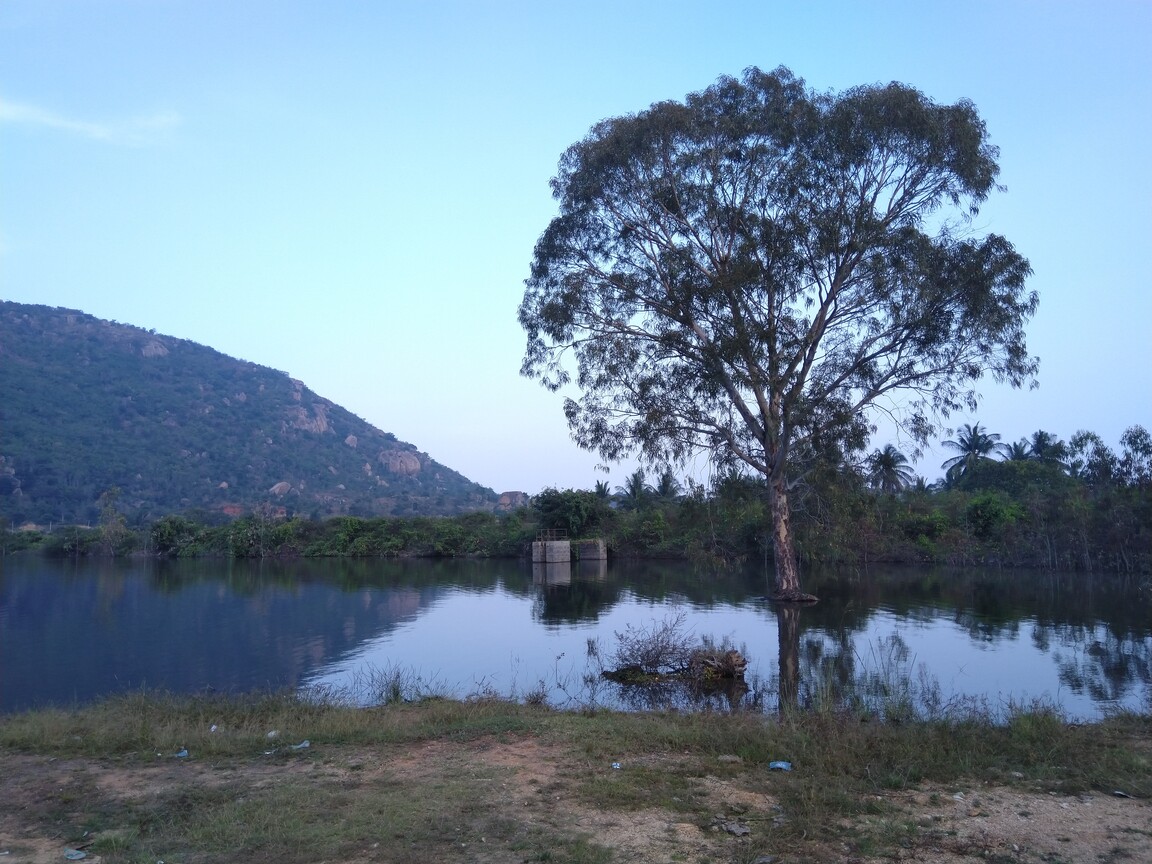
Back in Durgadahallī, I picked up some tiny little bananas from a grocery store selling them by the kilo,13 A first for me - in Delhi, bananas are twice or thrice as big, and are sold by the dozen. as well as two kilos of the reddest tomatoes I could find for the pizza sauce…but no amount of searching yielded any tapioca powder. The language barrier did not help matters, and nor did the lack of network (which meant that I could not show them a picture of the stuff).
To Urdigere
With no tapioca powder to be found in the vicinity of Hālekote, I was told that I might be able to get it in the nearby town of Urdigere. We were told that it's difficult to get there on bicycle, but I was determined to have a look, and Max was raring to go on a long distance ride with his newly-repaired 14 See previous day. bicycle.
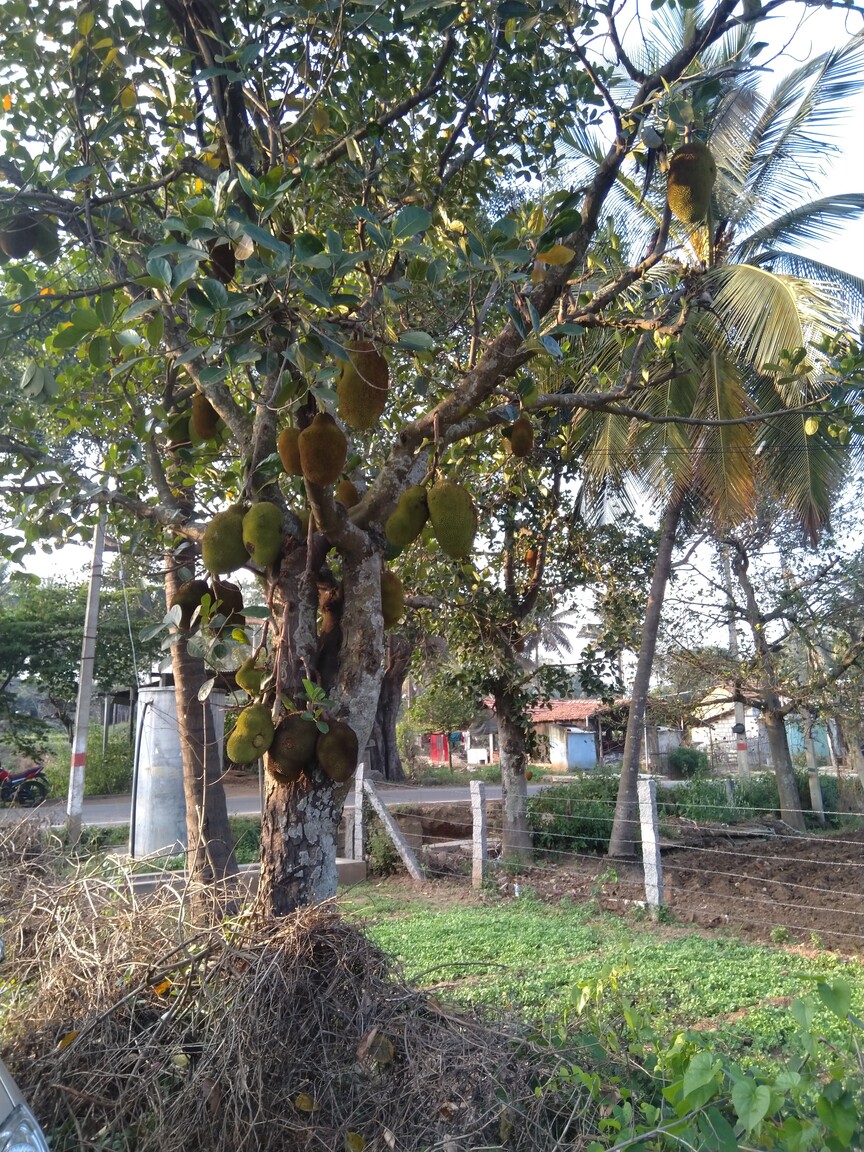
Max and I set out along the road to Urdigere. The difference in our cycling experience soon became clear - while he pedalled along in a leisurely manner, I struggled to keep up on the slightly uphill road, and soon had to stop to rest my legs. I didn't want to hold him back, so we discussed the route displayed by OsmAnd on my phone, and he went on ahead while I continued at a slower pace. Soon he disappeared around a turn, and I was by myself as far as my eye could see.
After the left turn heading towards Devarayanadurga and Urdigere, the road took on a significant incline. Many a times, I would dismount and start walking the bicycle uphill. Gears can only go so far in compensating for lack of muscle, after all.
I kept pushing myself to continue, but eventually realized that at this pace, it would soon be dark before I got to Urdigere, and the bicycle had no lights of any kind. I turned around and began the downhill ride back to Hālekote. The bicycle reached terrifying speeds of over 30kmph, and I had to modulate both brakes carefully, maintaining a balance between going too slow, going too fast, burning out the rear brake from prolonged downhill use, and flipping myself over with overapplication of the front brake.
(You could say that 30kmph is a common speed for a car, hardly qualifying as "terrifying". And I could say that it's quite another matter when it's a bicycle with a rigid suspension15 While this bicycle had a telescoping front fork, it was for some reason so rigid as to have no effect at all. I didn't think too much about it back then, but now I wonder…was due to my weight? , where a single ill-maneuvered pothole - there were quite a few of them on this road - could send you flying head-first without a helmet onto the asphalt. It also did not help that only a narrow middle section of the road was smoothly paved, with the sides unevenly breaking off into a mixture of dirt and broken asphalt.)
Crafter Space
I had made the right call - it got dark just as I reached the Crafter Space16 Another building in IruWay, but located downhill and right next to the road, rather than uphill like the other buildings. . I was relieved to see Max - whom I had no way of contacting - joining us some time later; he too had turned back on account of the darkness, if only at a farther point than me.
A crowd had gathered at Crafter Space when I arrived - the sauce had been made, and the baking of pizzas was just about to begin. There was no power, and everyone relied on their phones for light. I cut up the vegetables I was given - I recall carrots, cucumbers, broccoli, and olives - for the others to add to their pizzas. While I was feeling pretty frustrated with my failure to acquire any vegan cheese17 Tanya actually offered me some tapioca powder she happened to have, but I did not want to use up what little she had for herself. - mostly because it was a missed opportunity to test and demonstrate an alternative ingredient - my cheese-devoid pizza was loaded with extra sauce and vegetables, had a healthy sprinkling of salt, oregano, and red chilli powder, and tasted pretty decent.
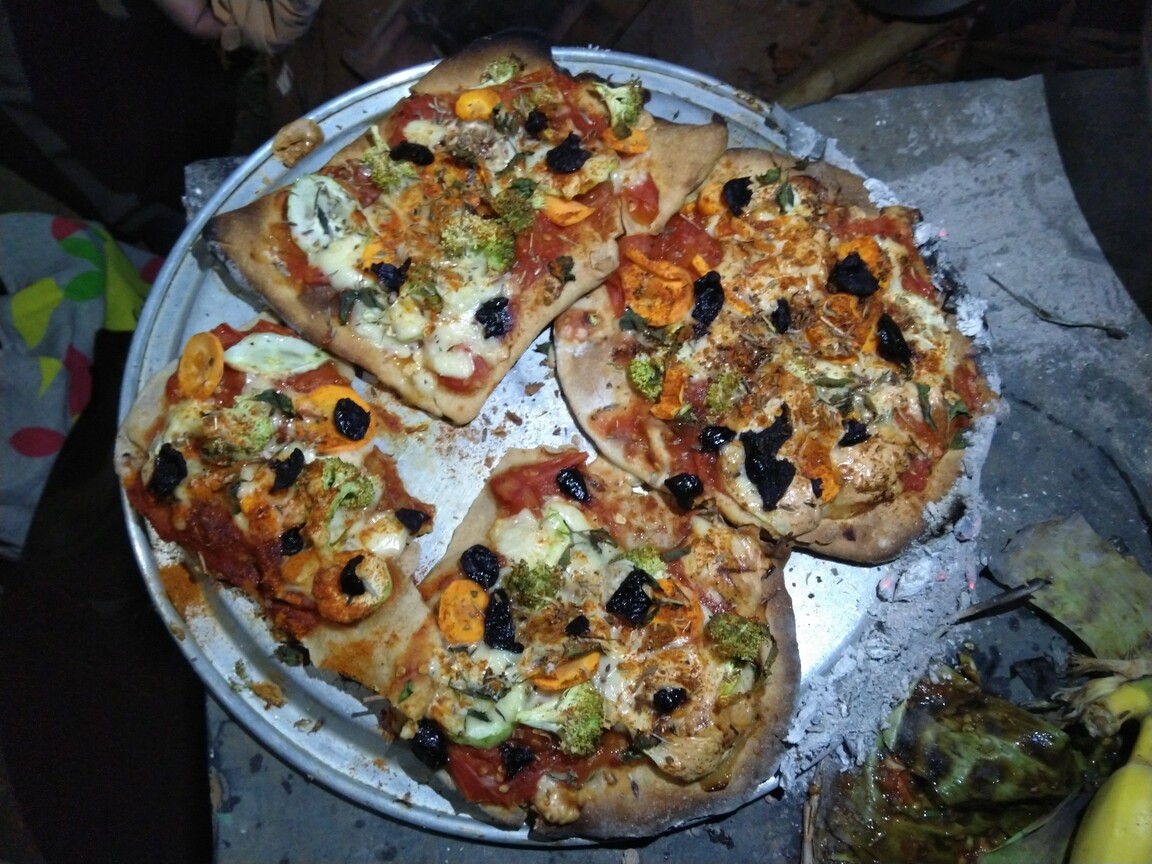
The crowd gradually thinned as people called it a night and went uphill to their residences. I was still waiting for my second pizza, which was the last one to go into the oven. There wasn't any dinner made that night, so the pizza was all there was to eat, and I was pretty hungry. Things became a little unpleasant when I took my pizza entirely for myself, rather than sharing it with remaining participants—I learned later that they hadn't got to taste any pizza at all. This was an unfortunate and entirely preventable situation—with some planning and foresight, there's no reason for anybody to miss out or go hungry.
Day 5 (20th): Gender and technology • Singing session #2
I was looking forward to hosting another singing session, but learned that it wouldn't be happening at its scheduled time today. The board I wrote its announcement on had been wiped clean, and prepared for use in the session that had been scheduled in its place.
Alice held a session on gender, culture, and technology in the Gazebo. The turnout was great - there were some 40-50 folks in the audience, and the Gazebo was almost packed to capacity. A significant number were from PGSOC18 Participatory Guarantee Systems Organics Council and Zerodha. I was pleasantly surprised to see some of the participants identify as FOSS proponents - I never expected to find others like me.
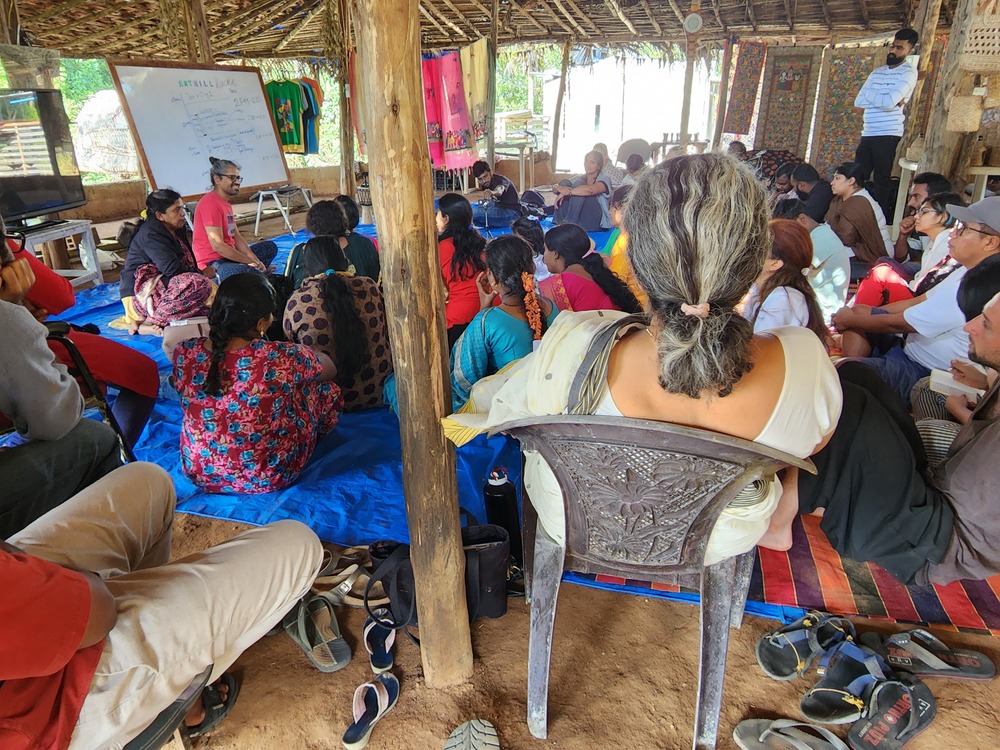
I was looking forward to new insights, especially on how gender norms affected the use of technology, and how UX design may compensate for the same - but the first half kind of got hijacked by introductions (despite Alice requesting midway for them to be kept short), and I took a nap after lunch, missing out on the second half. Derp.
Over the past few days, I had seen Tuisha - who was researching gender, technology, and a number of related subjects - holding private discussions with people. Unexpectedly, she approached me today, and we hung around near the White House, discussing music, technology, and theatre.
In the evening, Max and Ms. Sarbani asked me about the second singing session. I was somewhat reluctant - the talks had just ended, and the participants were standing about in groups in the Gazebo, talking about the subject matter. I was also not sure if my sessions were too important to the others, since the one in the morning was cancelled despite assurances that there wouldn't be any scheduling conflicts. But their urging encouraged me to make it happen.
This session proved much more difficult to begin than the first. I went about calling everyone I knew, including participants who were not there for the previous session. A surprising number were just plain scared of singing, even though I reassured them that this was a session suitable for absolute beginners. I had hoped the crowd remaining from the talks would disperse after I began with the singing exercises, but that was not the case. I requested for them to move away, but when I got back, some of the participants had gotten up and wandered off. The whole thing was a bit like herding cats, honestly.
We did eventually manage to get the session off the ground, and I was fairly satisfied with the results. Most of the talking crowd dispersed after some time, and some joined us. The turnout was larger than the first session, and I was happy to see a greater number of my acquaintances among the participants. Finally, in course of the rest of the event, I heard people singing the songs I taught in this session…including the ones who were initially scared of singing. That's the kind of thing that makes all the blood, sweat and tears of teaching singing worth it. 😄
Day 6 (21st)
Today's session was the PGSOC hackathon, but the thought of attending did not exactly appeal to me. Besides, I had a project that needed tending to.
Project XMPP
Throughout the event, I had seen Matrix and Telegram being used for communication, but I strongly prefer to replace them with XMPP in almost all conceivable cases. For one, the resources an XMPP server consumes are an order of magnitude lower than Matrix, from what I've heard (e.g. a Raspberry Pi to serve thousands of users). Secondly, Element (the client everybody was using) did not support multiple accounts, whereas just about every XMPP client did. Lastly, Telegram has centralized and proprietary servers, which makes them unworthy of being entrusted with anybody's communication.
Thus, I thought of setting up an XMPP server on the COWMesh. Rām, Sanketh, and Amudhan were all very supportive of the idea, which was heartening.19 Rām had an account on Quicksy already! My first XMPP contact from the event. 🙂 (Unless we can count Vivek.) Sanketh directed me to Shālinī for a Raspberry Pi. I spent a lot of time going through resources about the Raspberry Pi, trying to figure out how to do a headless install, and borrowing Amudhan's card reader to format the microSD card20 I discovered at this point that my fairly pricey Lenovo Legion 5 did not have a card reader. How odd for a laptop which I chose for its otherwise-impressive array of I/O! …only to realize that the microSD card was already flashed with Debian and I had toiled for naught. Oops.
Eventually, I realized that my self-hosted XMPP server wasn't going to run the way I expected it to - I wanted people to be able to use the account I set up for them to both communicate within the village (without being connected to the Internet) as well as with the wider global XMPP network. But Amudhan and Rām patiently explained what I later realized was pretty obvious - the COWmesh was less like an ISP, and more like a residential WiFi mesh network spread across a really large area (i.e. a few villages instead of a single residence or building). Simply put, the network did not have a static external IP - I would have to set up a dynamic DNS for it. I kind of lost motivation at that point. Still, it was my first time having a Raspberry Pi at hand, and it was valuable experience in networking and administration. I also never had a friend working with me on something like this in person, which was another first.
I really appreciate Amudhan's patience. Given how much demand there was for him (in both personal and professional capacities), I always admired how he never once cracked, lashed out, or showed a hint of exhasperation to my sometimes-silly queries.21 Or perhaps he was always exhasperated…? He always sounded tired. 😁 He ended up setting up his own XMPP server, so I guess my project wasn't entirely fruitless 😄
Provisioning the Bamboo Tower
The consequence of this XMPP server project was that I started spending a lot more time around the Red Cottage. That was where I learned of today's plan to go down to the Bamboo Tower and install a LibreRouter on it. I'm not sure if I volunteered to help or if Amudhan requested it, but I headed down on Sanketh's bicycle, being tasked to take photographs using Amudhan's frighteningly expensive camera.
I didn't dare climb the tower (it had no ladder, for one), so my photographs were all taken from the ground. Admittedly, that restricted the possible angles a bit.
Triple Agent
In the Gazebo, Rām introduced us to a game called Triple Agent. It's implemented as a proprietary Android application, but only one phone is required to play it. In essence, it was similar to the game I know from theater workshops as "Killer" - players are secretly assigned to certain teams, and you have to figure out which team they are part of.
We played a few rounds, and for that duration the air was thick with (playful) accusations, deceptions, and laughter. The game is not too complex from the perspective of implementation - the complexity arises from human interaction instead. That makes it a suitable candidate for someone looking to make a simple Android application.
Afterward, Ruchikā held a session on gender and assumptions. This was more fun than I expected it to be - we wrote down some ways in which assumptions were made about our identity. For her, it was people assuming she was a boy because of her short hair; for me, it was people assuming I was a girl because of my long hair. Michael spoke about people assuming his nationality from his facial features, and Sanaj, I think, about people assuming his religion from his beard. It was followed by some improvisations (AKA roleplaying) by the participants, depicting their experiences of gender stereotypes affecting their lives.
A school in Timmanayakanahallī
In the evening I went to a school in Timmanayakanahallī with a few others, where some of the participants helped kids with their schoolwork. It was a tiny, noisy room. I tried to do some singing exercises, and later tried going over some basic English with some students.
Day 7 (22nd): Hiure's birthday • Masālā oats
"Cooking…it has this way of giving port in a storm."
It was Hiuré's birthday today, and that of Manoj tomorrow. For many days, Alice had been working in secret on a web page for the two, containing wishes and messages from the participants. During the day, she called Hiuré and everybody else to the Gazebo, and displayed her website on a large screen.
There were plans to bake a cake in the evening. However, when I got down to the Crafter Space, I learned that the cake batter had eggs and butter in it. I asked if there was anything else being made for dinner this evening - there wasn't.
Having muttered something like "guess I'm cooking for myself, then," I walked back uphill by myself, feeling rather angry. At the Crafter Space, I may have imagined Tanya or Rithikhā asking me about some ways to accommodate me. On the way up, I ran into Hiuré (who was going downhill), who seemed to ask me something. But I was in too much of an angry haze to really listen to anybody.22 Almost sounds like something you might find in a Higurashi story.
In Jāgā, I ran into Lydia. She and her family hadn't had anything to eat either, so I offered to cook for them, too.
I remembered seeing two large bags of rolled oats in Jāgā recently, which gave me the idea of making masala oats. Lydia helped peel the tiny cloves of the garlic that we had. I couldn't find any zeera, so for the first time, I used mustard seeds for masala oats. "Let's see how this turns out," I thought. I couldn't find any tomatoes, so I borrowed them from Mr. Mukundā, an erudite gentleman living nearby. Lastly, I spotted a bunch of spinach leaves in the refrigerator. I had been missing having leafy greens in my time here, so I did a second thing I had never done before - that is, adding spinach leaves to masala oats. I usually like my food to be spicy, but this time I kept the heat low in order to make it suitable for the children.
As I cooked, I found myself feeling less angry. Was it merely the passage of time? The endorphins from the walk uphill? The act of cooking not just for (and by) myself, but also for (and with) others? Or just cooking itself, a little act of seizing my own culinary destiny for dinner?
The result was a big pot of masala oats, much of which was left over after I ate. By the next day, many had tasted it and expressed appreciation for the cooking - felt good to hear it. Rithikhā asked how I "got it to taste buttery without using butter"…honestly, I hadn't a clue! I handed a box of it to Mr. Mukundā in the morning as thanks…I hope he liked it, too.
Day 8 (23rd)
Natural farming
This afternoon we had a talk about natural farming. The speaker was Mahesh, a local farmer who had practiced it for the past 15 years. This talk was, fortunately, translated into English by Sanaj and Sanketh.
Sanketh cited Subhash Palekar as being the originator of the techniques being discussed. It's interesting that Mahesh advocated mulching over composting, saying that the heat generated by composting destroyed necessary bacteria in the soil.
Other changes I found noteworthy -
- neem twigs (dāntun) and tooth powders to replace toothbrush and paste
- multāni mitti (AKA Fuller's earth; a kind of clay) and lentil flours (e.g. besan - gram flour) to replace soap
- These were things whose cosmetic use I was familiar with as a child, but their popularity seems to have waned into obscurity since then.
- removal of sugar from the diet; using dark jaggery instead of white jaggery
- a simpler lifestyle, with less technology
I don't buy the claims outright, but it's something I wouldn't mind exploring through the scientific method.
Cooking with Ruchikā
This was another of those evenings where there was no dinner, so we banded together to cook in the community kitchen under the direction of Ruchikā. I think we made bisi bele bhāth. A great number of people pitched in, limited only by the equipment available.23 If there remained any question as to the utility of the knives I got along, it would now be firmly laid to rest. We had two or three tiny cutting boards, and large quantities of ingredients. It was hectic, but it was quite satisfying to see how readily we cooperated, and the result was fairly appetizing.
Celebrating on the mountain
At night, we went to a big rock some distance from Jāgā, where we set up a bonfire and music to celebrate Manoj's birthday.
I had caught a cold over the past few days, which was perhaps to be expected with the cold mornings. What was not expected was Rām getting me a drink called kashāyā, made with ginger, garlic, salt, pepper, and the leaves of a certain plant. It was green in color and the taste was unpleasant, but what really touched me was that somebody gave me that much thought and effort. After the events of the previous day, I was all the more grateful for it.
Day 9 (24th)
Trek #1
The day started with the first trek I managed to join in the course of the event. Dinesh and a number of people walked into the Srī Vidyāshankara Temple, but took the path heading into the forest instead of the temple. Dinesh would often stop and talk about certain rocks, trees, anthills, temples, mythological tales, and historical events.
On the subject of anthills, I have to say that the anthill I saw on the trek was far from what I had in mind when the AnthillHacks website talked about "anthills". I was thinking of a little pile of dirt, which is what you see in cities. I was absolutely not prepared for a giant red structure almost as tall as me!
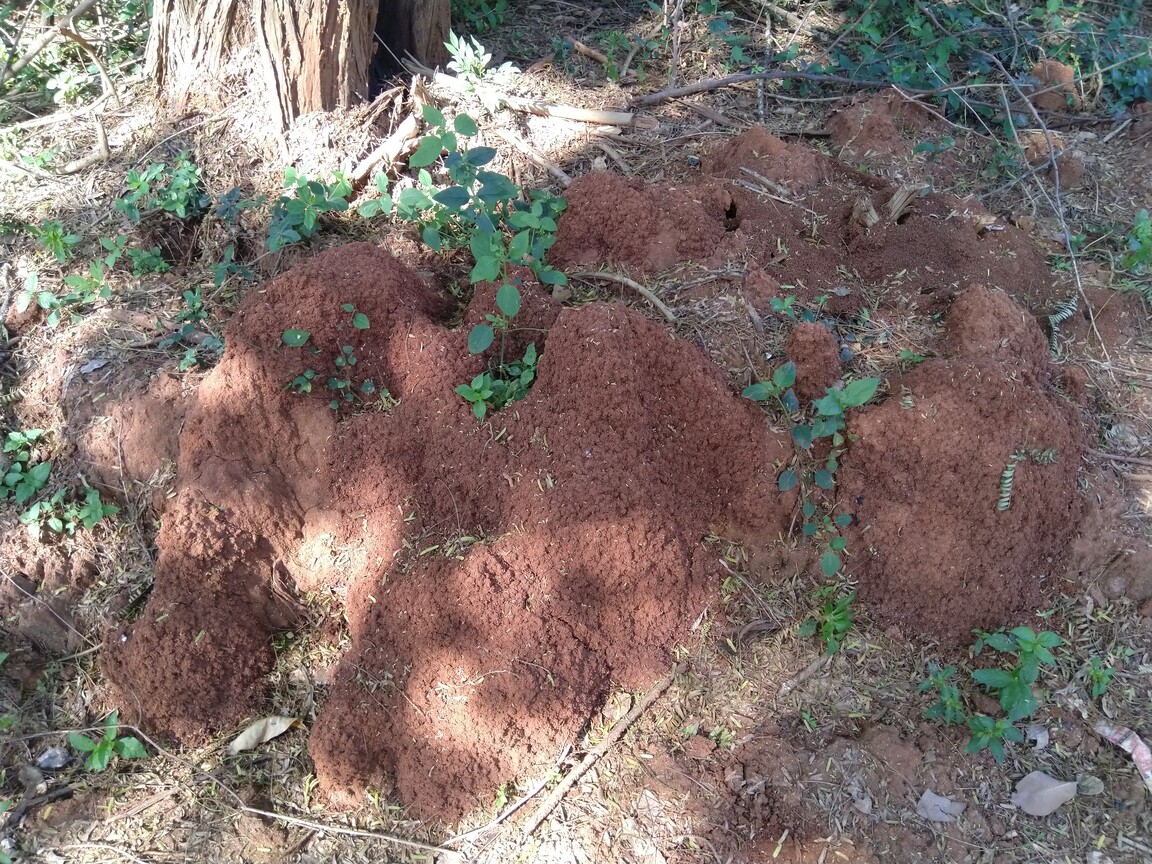
Another lake
Our trek brought us to the Kumbarahallī Kere ("Kere" means "lake", somebody told me), and quite a few people decided to take a swim. (Dinesh set the stage by going in while everybody else was still gawking.)
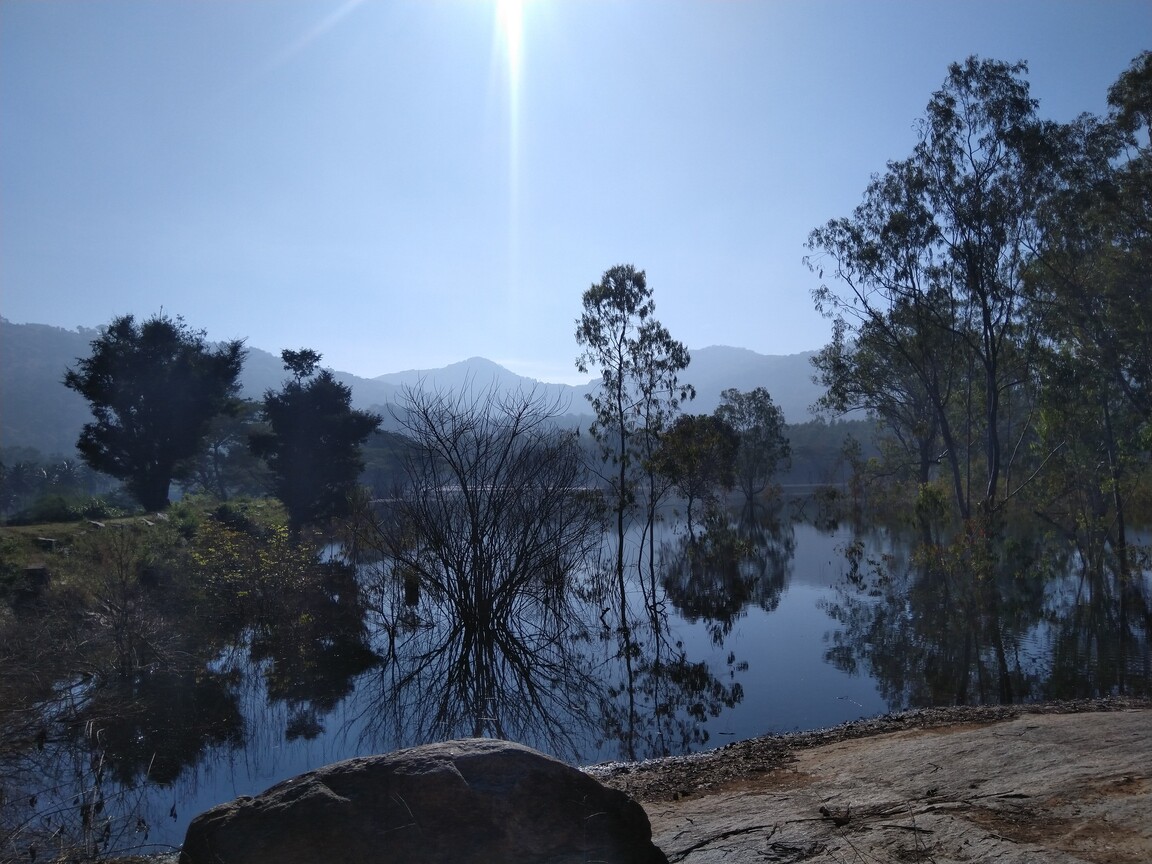
I desisted from swimming. I had lessons as a teenager, but that was also the last I had the opportunity to swim. Additionally, I really don't like the appearance of my body, and therefore didn't want to undress before the others.
I executed the tricky maneuver of taking off my undershirt - which was suited to the morning cold, but was now sweaty from the walking we had been doing in the sun - without removing my T-shirt, and ventured alone into the forest to do a survey of the trail.
Around 500 meters in, the trail became ambiguous, so I turned back and joined the others.
Watching them swim about, I cursed my body for looking the way it did, for making me miss out on participating…but when some of the girls went in without taking off their clothes, I realized that I could do the same. Max was appointed lifeguard as I tried to recall my skills in the chilly water. I managed to do a few strokes and not inhale too much water in the process.
I'm glad that I was able to swim, and I look forward to doing it again. In Delhi, you can only ever swim by forking out dough, and (unless you're filthy rich and have your own pool) only for a limited time…swimming in a lake was relatively liberating.
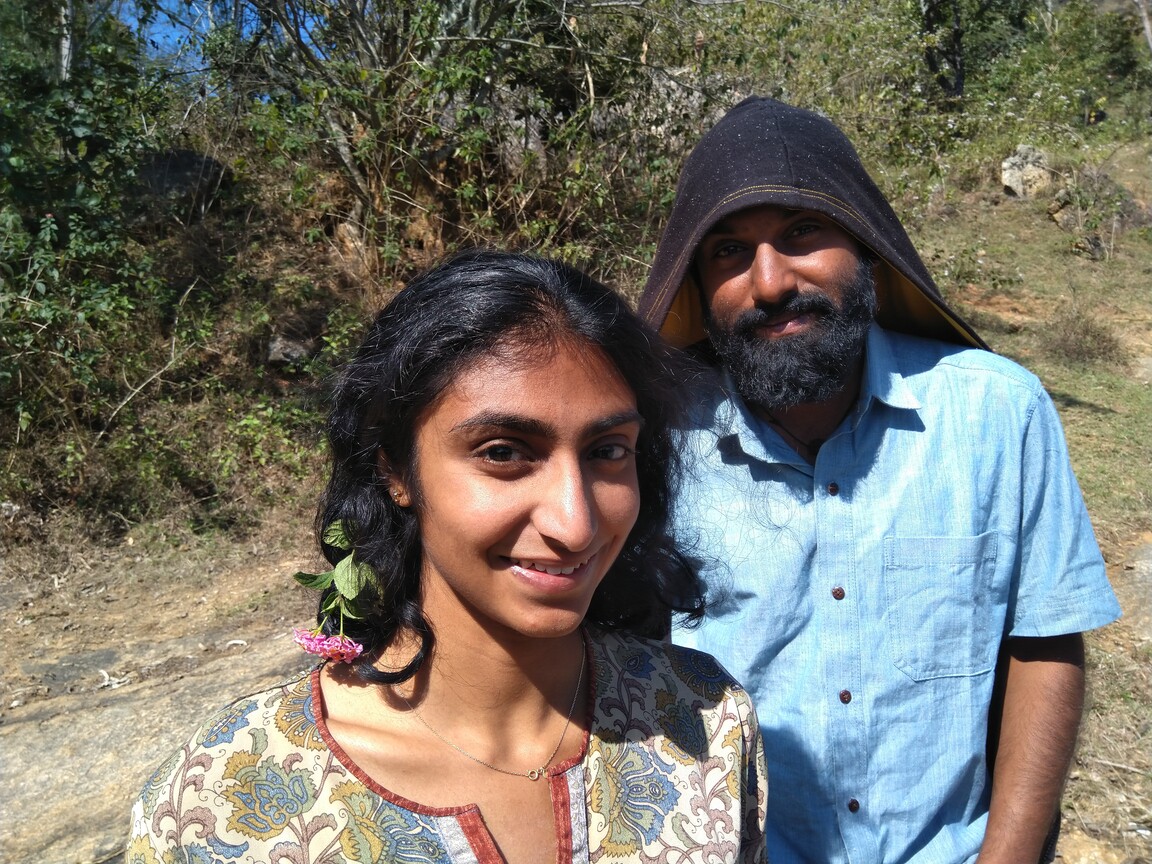
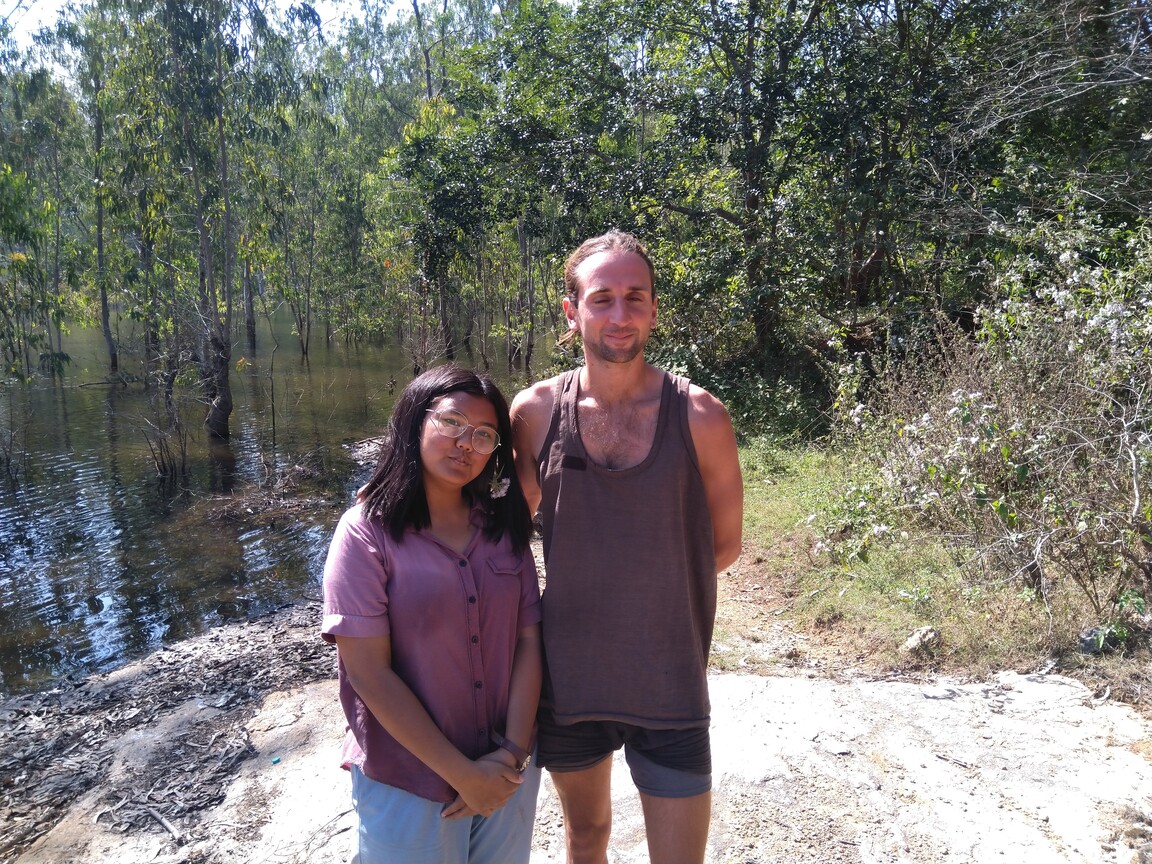
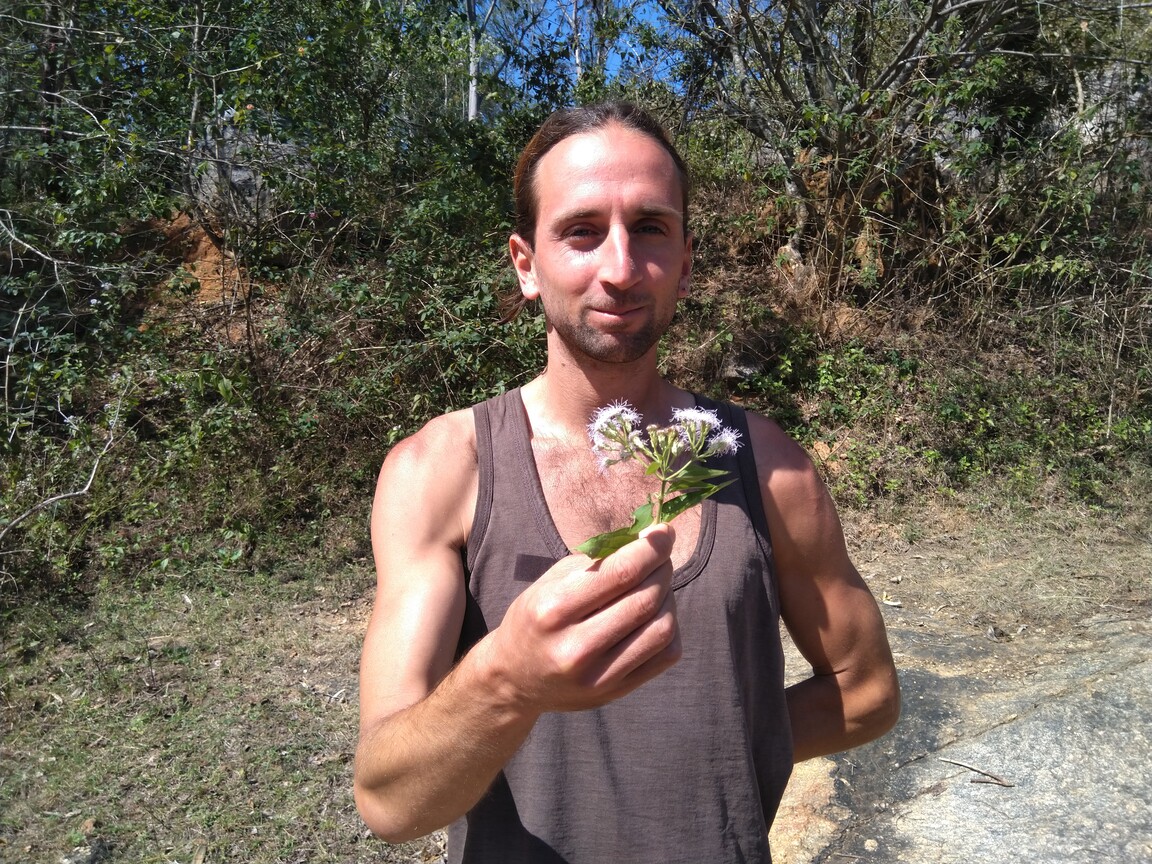
On the way back, Max and I sang songs for the others. It was one of those rare occasions that I was in the presence of a German speaker, and could thus sing all the German songs I knew. I started off with the first song from from Die Winterreise ("The Winter Journey"), which was an accurate reflection of my state at that moment24 I was feeling strangely depressed at this point. Don't ask how, why, or when it happens - I don't know. 😕 …but it started to seem a little unusual for a happy gathering on a warm sunny day, so I switched to the much brighter first few songs from Die schöne Müllerin ("The Fair Miller-Maid").
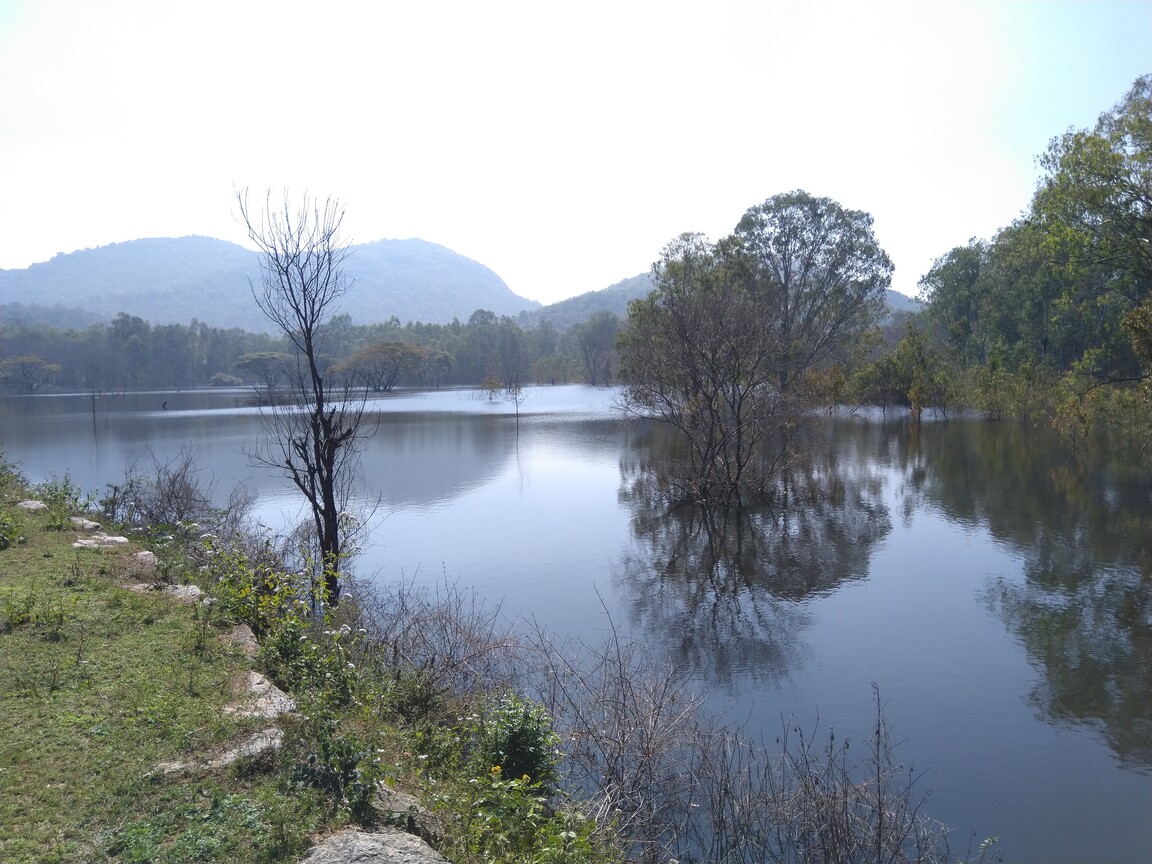
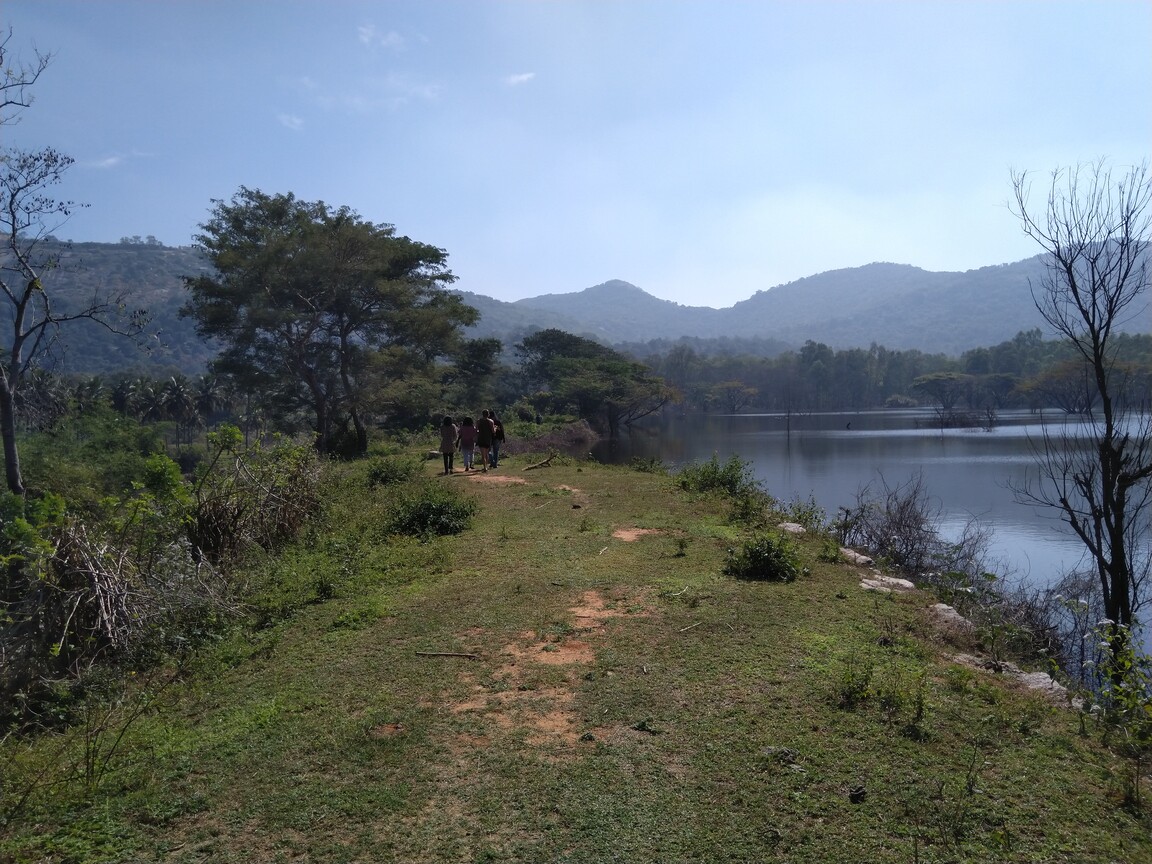
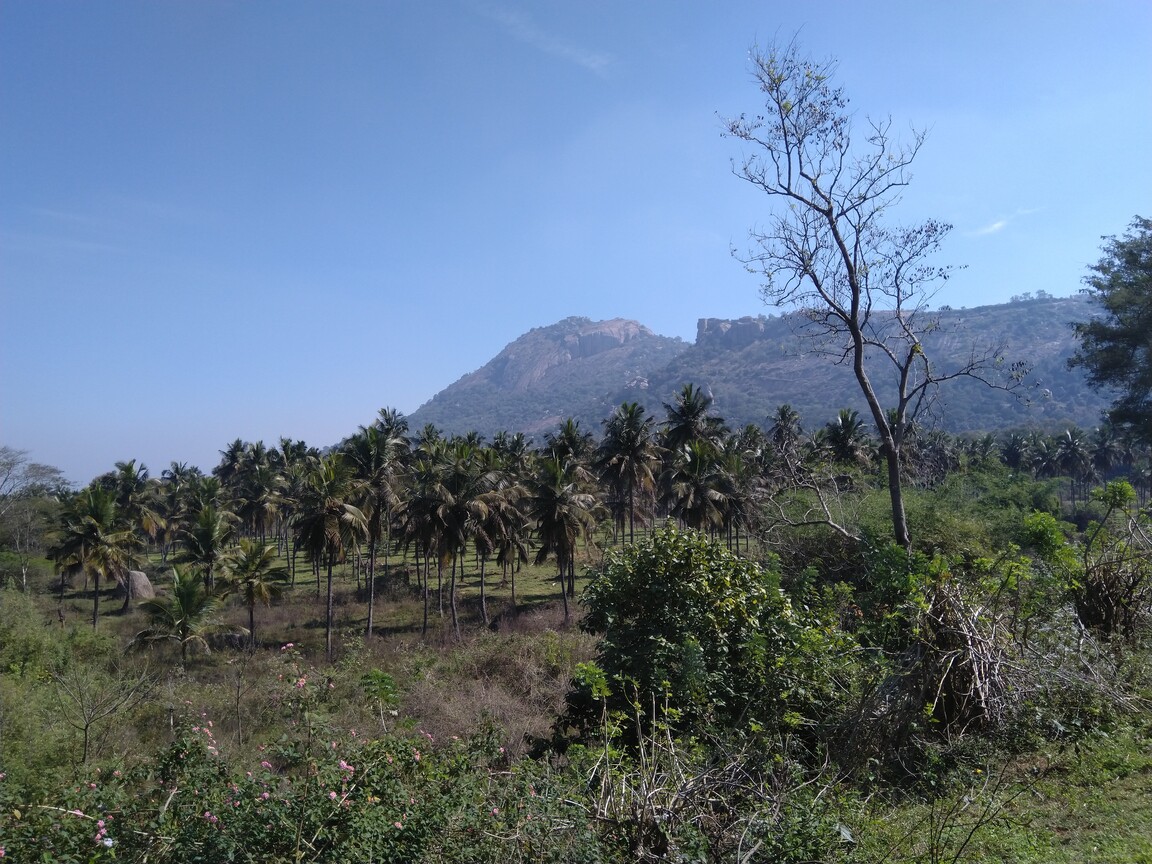
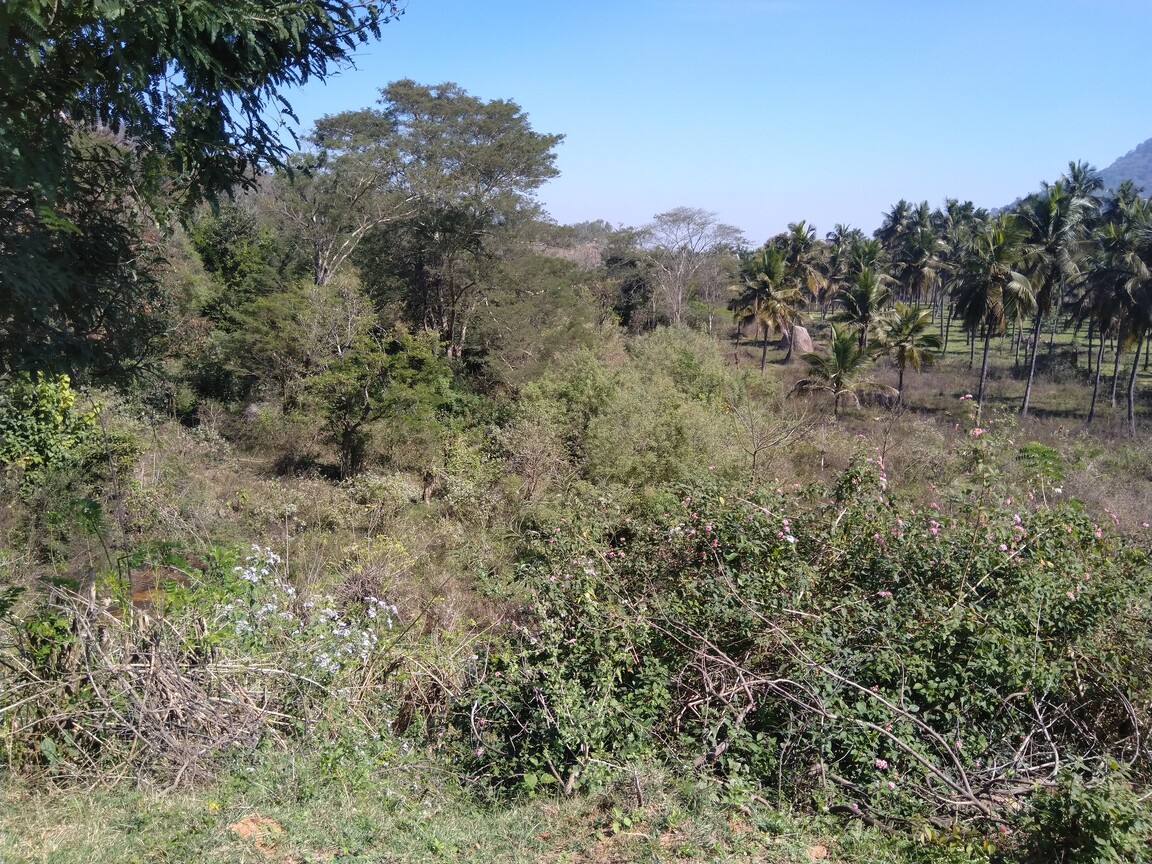
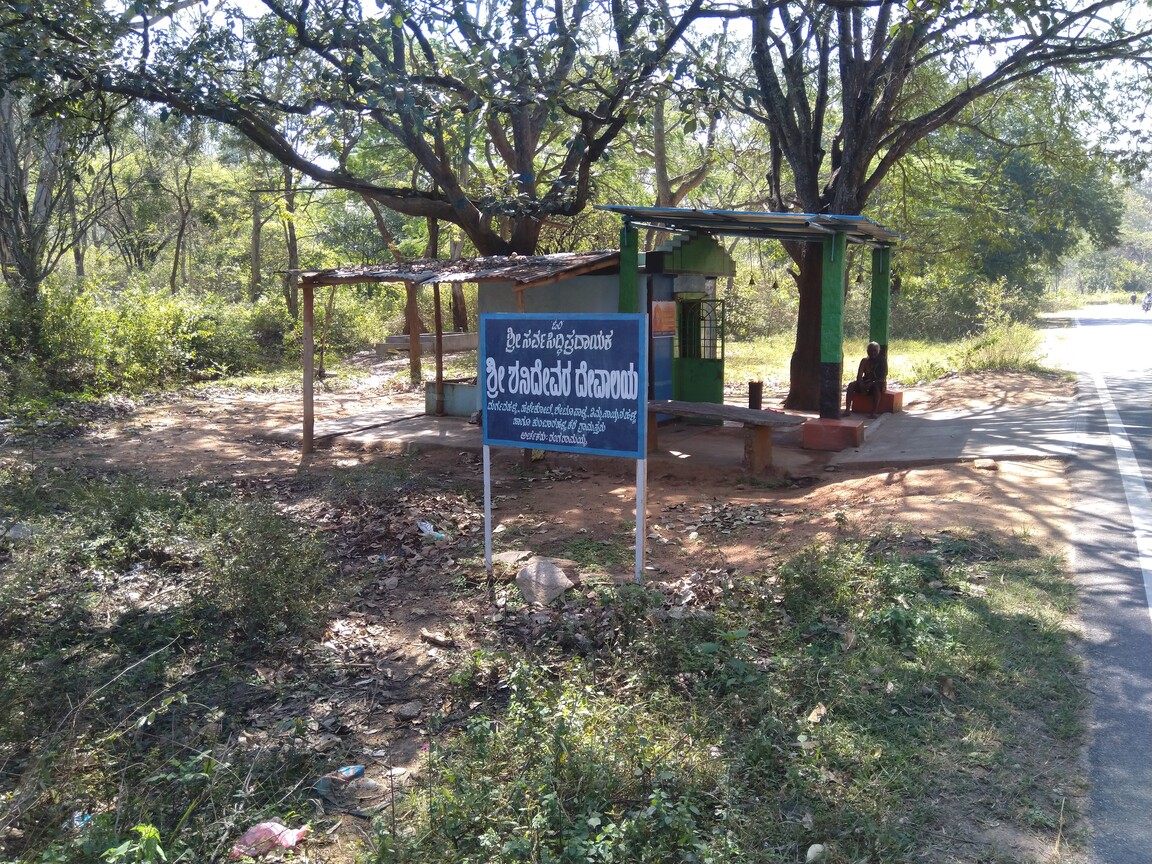
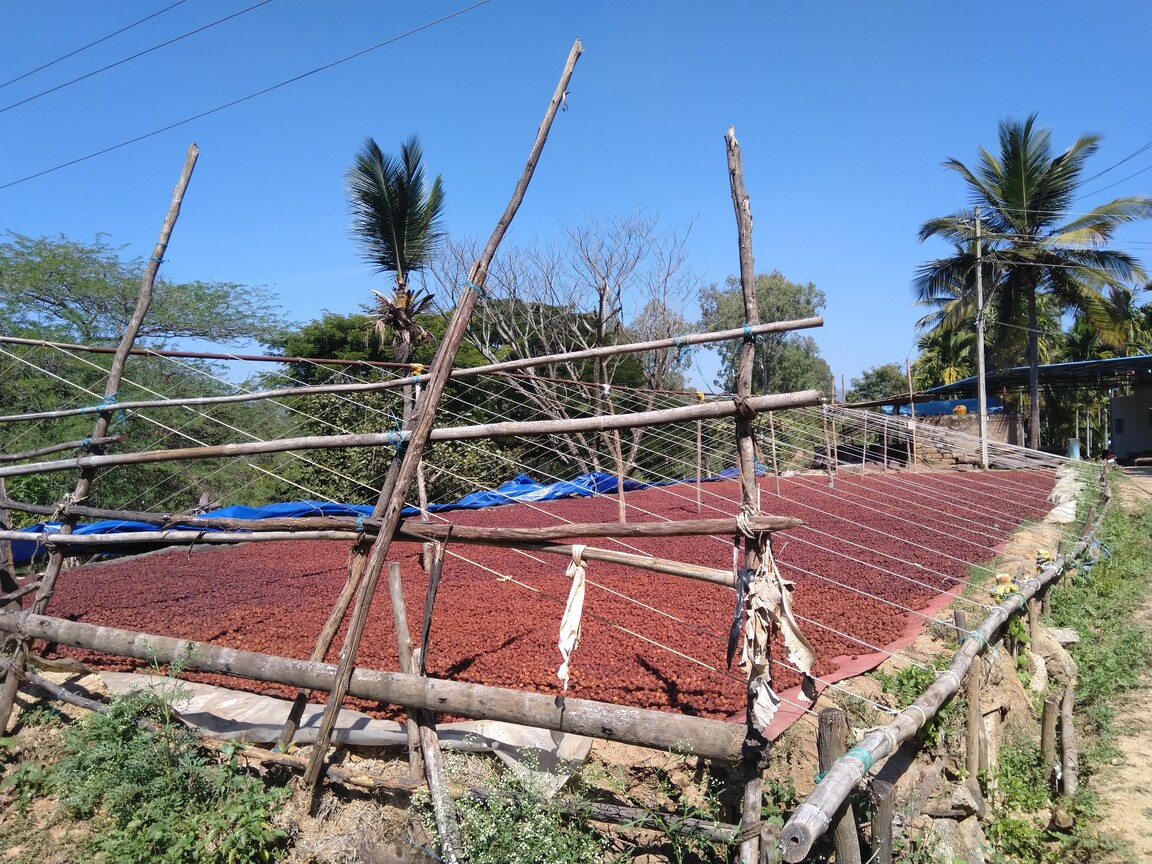
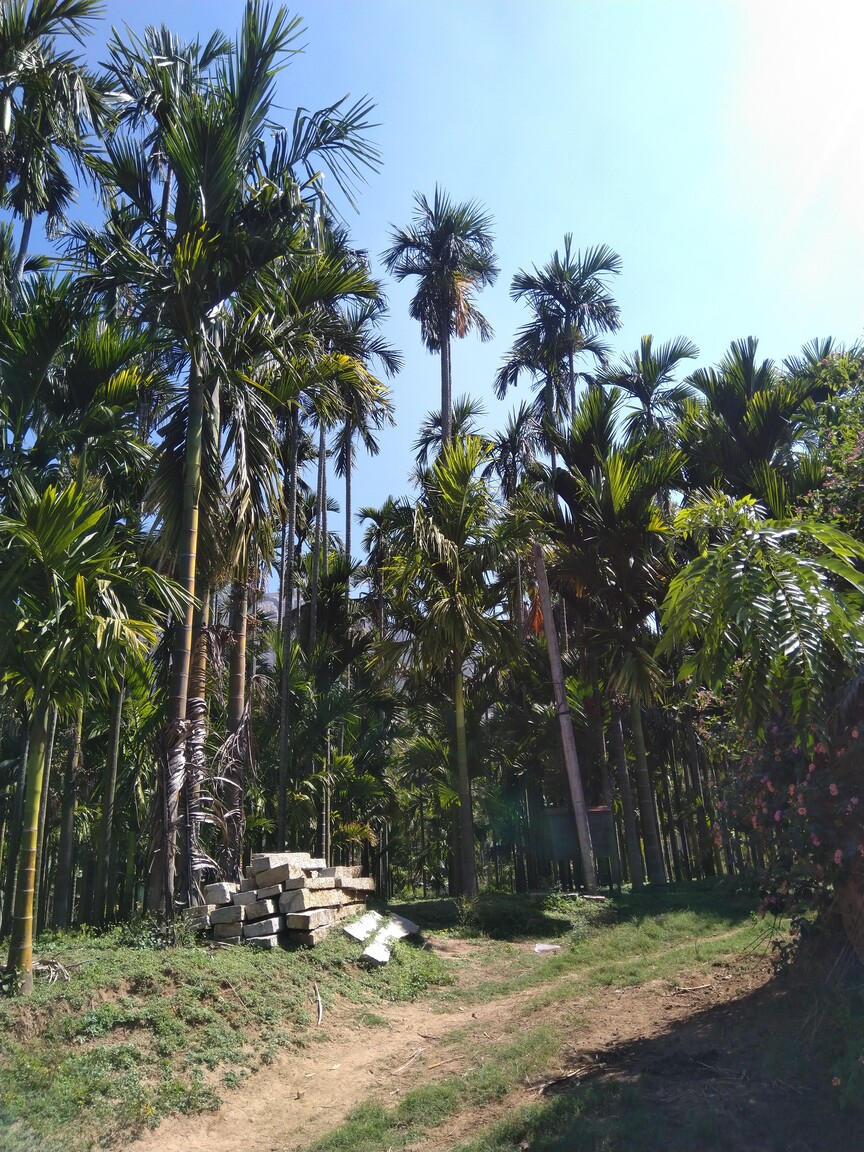
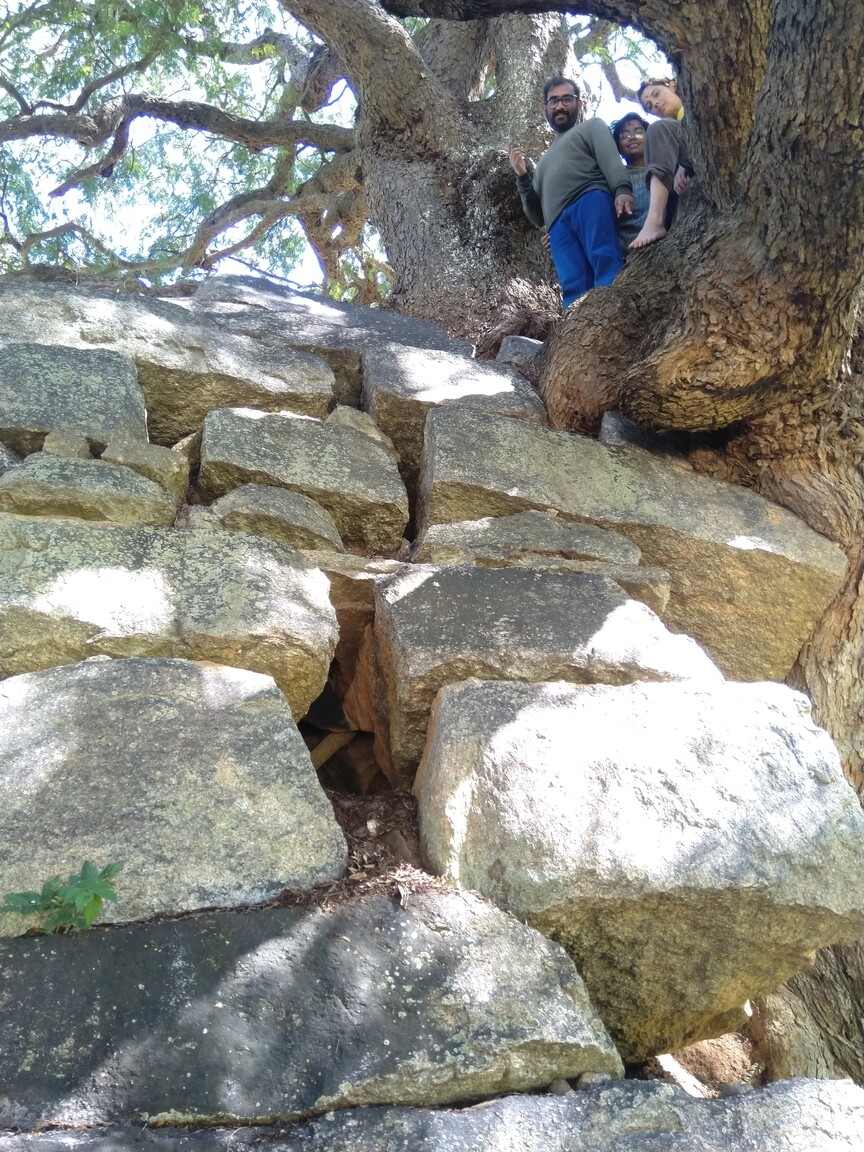
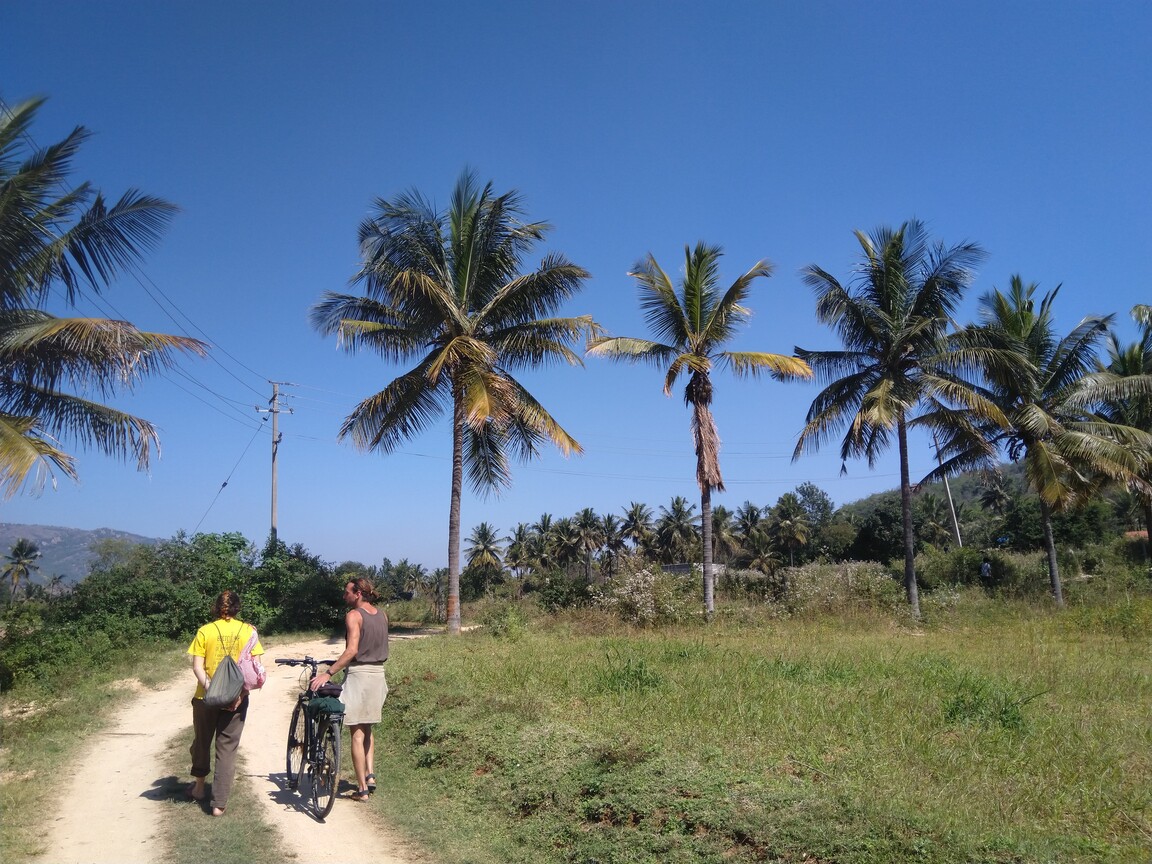
Rupakā
In the evening, I met Rizmā - a software engineer in her 20s, leading her own startup. With her remarkable energy and enthusiasm, she told us about her project to translate the Fedora GNU/Linux distribution to Kannadā…oh, and she holds the position of being the first person I've met who insists with a straight face that you say "GNU/Linux" rather than Linux. As a fellow FOSS proponent, that kind of conscientiousness has my respect…and yet, at that moment, why did I struggle to withhold my laughter? We talked about the need for localisation, the different dialects of Kannadā, and how she reconciled running a proprietary-software-oriented startup with her strong preference for FOSS.
I was told that today we would be going down to eat at this restaurant called Rupakā. We were about to get into a car outside the Red Cottage and leave, when Ivy said she wanted to go and get her sweater. I thought it would be a good idea for me to do the same - I told the others to wait, ran up to Jāgā, hurriedly took out a sweater, and ran back…only to see the car disappear around the bend before my eyes. Possessed by some strange obstinacy and anger, I ran downhill after it, but did not manage to catch up. I did not stop running until I reached the Bamboo Tower and saw the car turn onto the main road.
They had mentioned "Rupakā" - I clung to the word in my memory as though it were my last hope - but I didn't know where it was. The road was deserted, I had no cell reception or Internet connectivity, and OsmAnd did not show me any place by this name. Fortunately, I ran into Sanketh along with a few others at Crafter Space, where they seemed to be dealing with a power outage. He gave me a rough idea of where to go, and thanks to my previous episode of cycling around the villages, I understood readily.
I set off towards Timmanayakanahallī. Soon, the roadside houses and shops ended, and so did their lights - I was on my own, in complete darkness. There were no streetlights between villages, and I relied on my phone's torch. Sanketh had told us about leopard attacks, and I was especially wary of being out after dark ever since. It was not even 8 o'clock, but if you were to go by the lack of people, cars, and light of any kind, it may as well have been midnight.
The anxiety-inducing walk in the dark notwithstanding, I made it to Rupakā easily enough. It was an Indo-Chinese restaurant set up in a house, with plastic chairs and tables set up in the verandah. I chided the others for leaving me behind - I had gone back to get my sweater, but now (in spite of the cool winter air) I was drenched in sweat and quite hot from the running and walking. The others pointed out that I could just have waited a few minutes for another car going down 😅 I had a meal of fried rice with cauliflower manchurian, a single serving of which was the only (probably-)vegan food left at that hour.
A ceremony
It was dark when we set out from Rupakā, with our phone torches lighting the way as we walked, talked, and goofed around. In a teashop on the way, we saw some men were playing carrom, and I was surprised to hear Ivy say that she did not know about the game. Felt good to be the one telling someone about it.
With dinner out of the way, I figured we would be going to sleep, but today had more in store. A little bonfire25 The fire was set up in a device I had never seen before - it looked like a gas stove, had knobs like a gas stove, but was fueled by wood. "A gas frontend for a wood fire", quipped someone - probably Dinesh. was set up in the Gazebo. Somebody had acquired two packets of marshmallows and some crackers. We stuck the marshmallows on twigs to heat on the fire, and ate them by themselves; others made s'mores with the crackers. Marshmallows were something I had always heard about, but never had the opportunity to try - which is why I was glad that somebody thought of including a vegan variant. Another first for the day.
Tanya had received news that her friend Isabella had passed away today, and she held a ceremony in her memory. A drink - whiskey, if I remember correctly - was served for anyone willing to drink. In her speech about her friend, Tanya mentioned the custom of tipping a bit of the drink into the soil, to share your drink with the one departed. Most were sitting on the carpet and thus did not try it, but I, standing on the ground outside the carpet, was able to. It's an interesting rite - you tend to think of your friend as you do it. For one last moment, your friend is brought to you again. It reminds me of the ending of La Maison en petit Cubes, where an old man pours an extra glass of wine for his late wife, and clinks his glass with hers.
Before the ceremony, I had noticed Tanya copy out a poem for Isabella from her phone to a notebook paper. She now read that poem off the paper, and then, with her voice gaining intensity as the poem reached its end, threw the paper into the fire. I exclaimed softly, but in the silence of the moment, it was rather audible. I felt pretty embarrassed to see that everyone else was silent.
After a moment of silence, Tanya said she did not want to make it a sad occasion - it would be contrary to what her friend wanted - and the gathering returned to its usual chatty self. I played Piazzolla's Oblivion and Soledad26 Seems like an odd choice, now that I think about it - these are pretty sombre pieces, hardly fitting her request. on my phone for everyone to hear, and Tanya and I talked about bereavement.
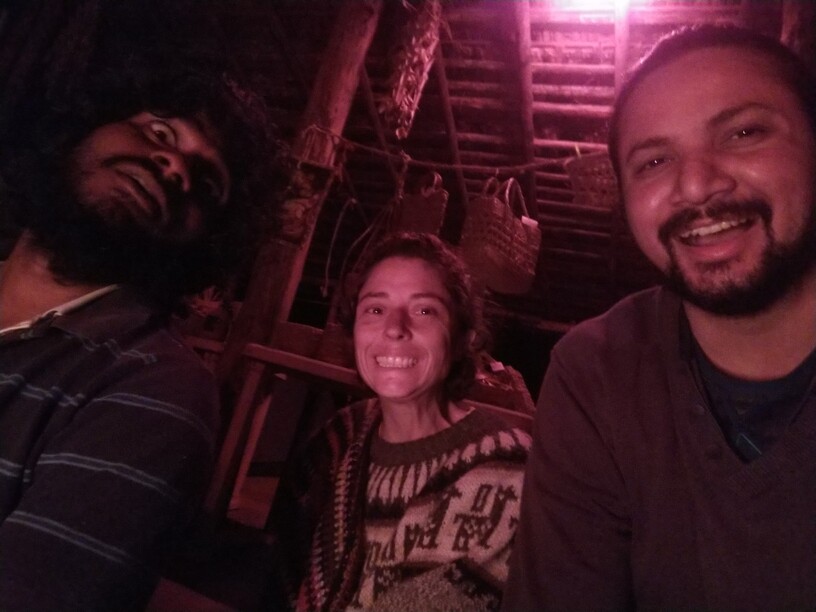
By and by, people went to bed and there were fewer of us left at the Gazebo. Ādityā - an Indian classical flautist who arrived earlier today - got his flute, and we engaged in a few rounds of improvisation with me on the guitar and others on the djembe. Eventually, however, the exhaustion of the day caught up to me, and I retired to Jāgā, delirious from sleepiness.
Day 10 (25th)
I never felt magic crazy as this
I never saw moons knew the meaning of the sea
I never held emotion in the palm of my hand
Or felt sweet breezes in the top of a tree
But now you're here—
Brighten my northern sky
Trek #2
As yesterday, we left on a trek within an hour of me waking up. This time, we were headed to Devarayanadurga.
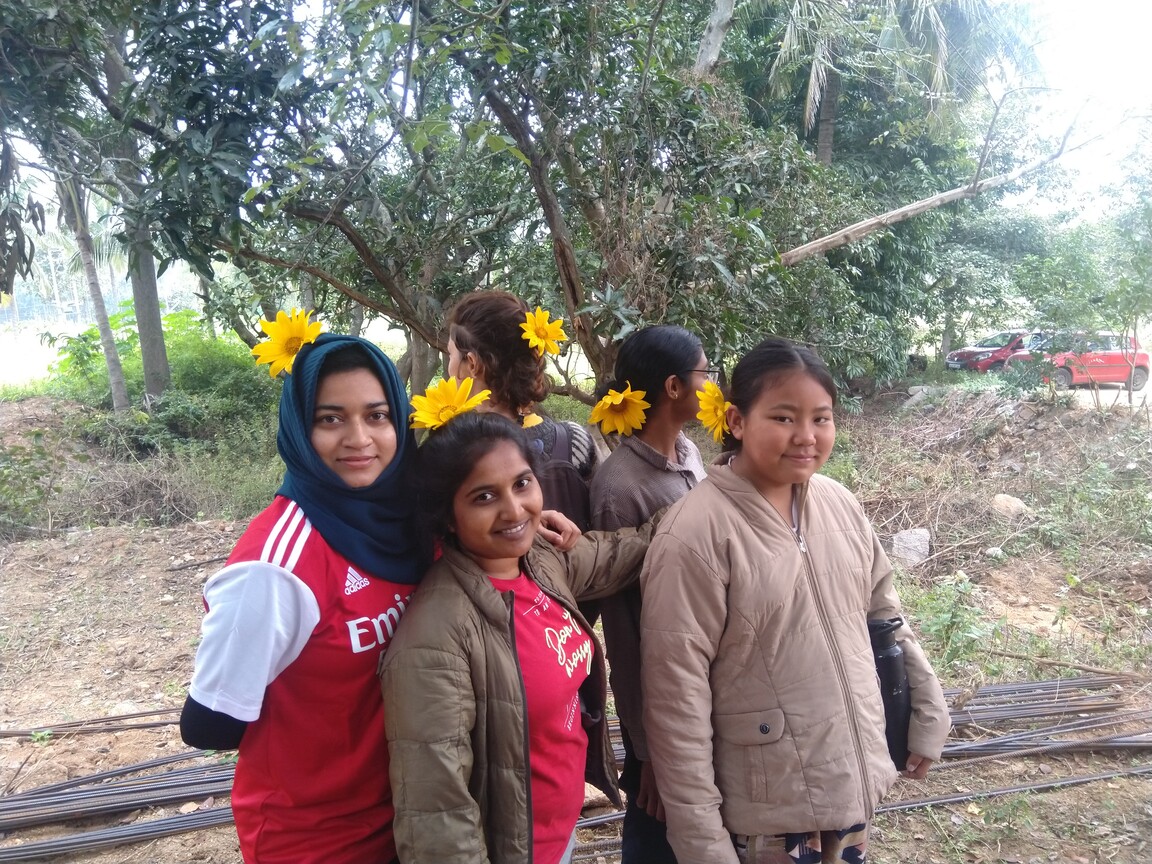
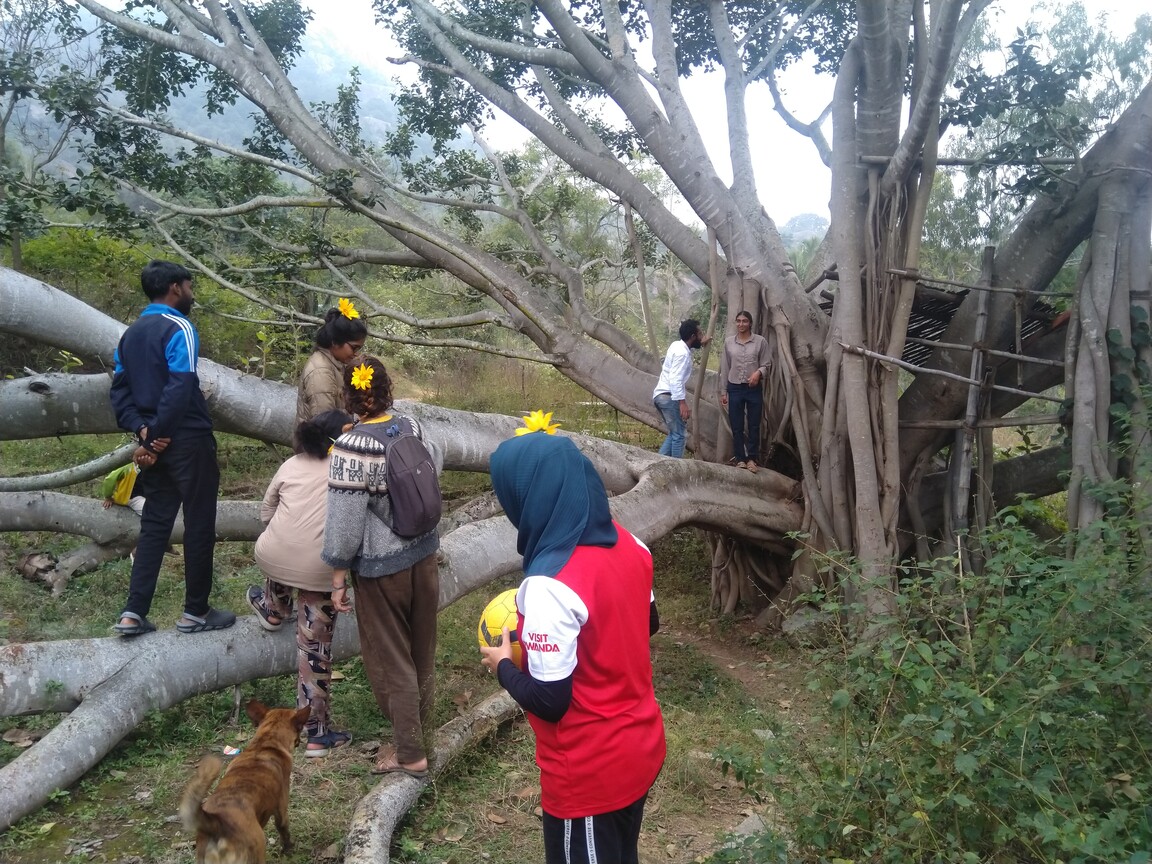
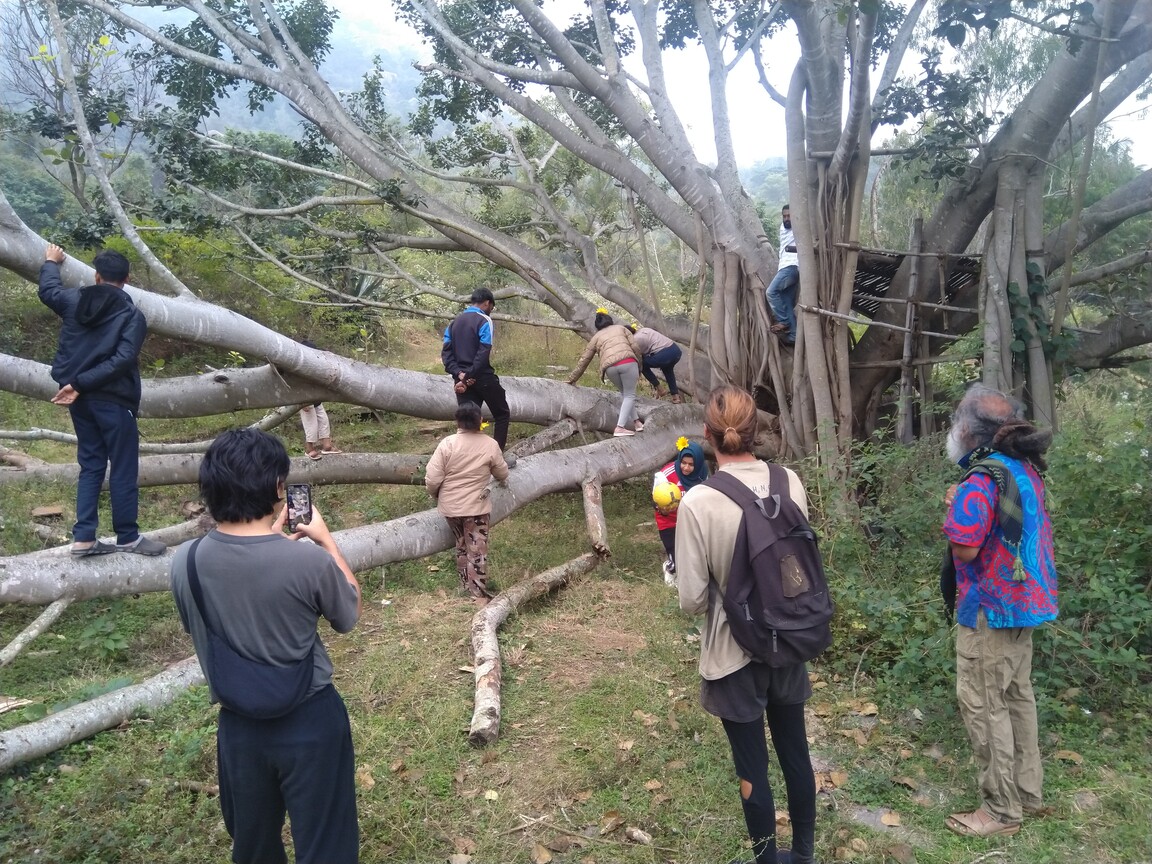
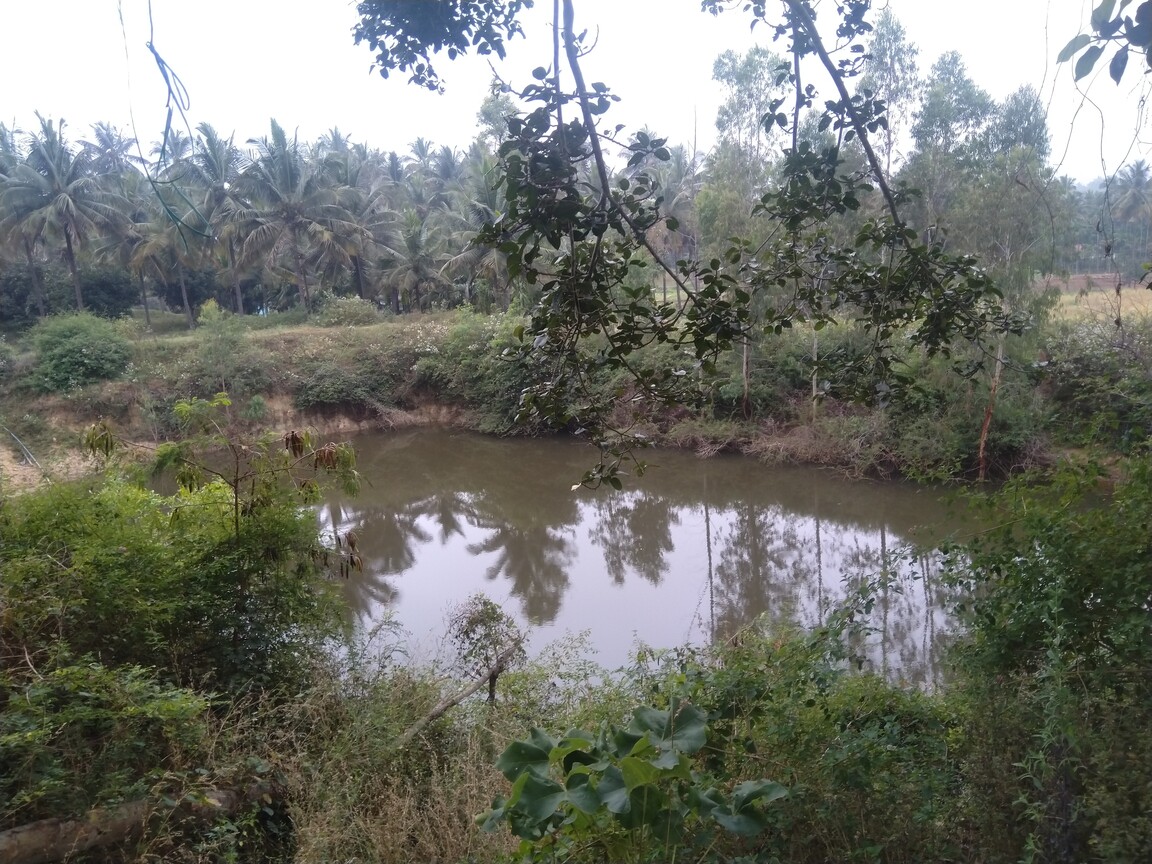
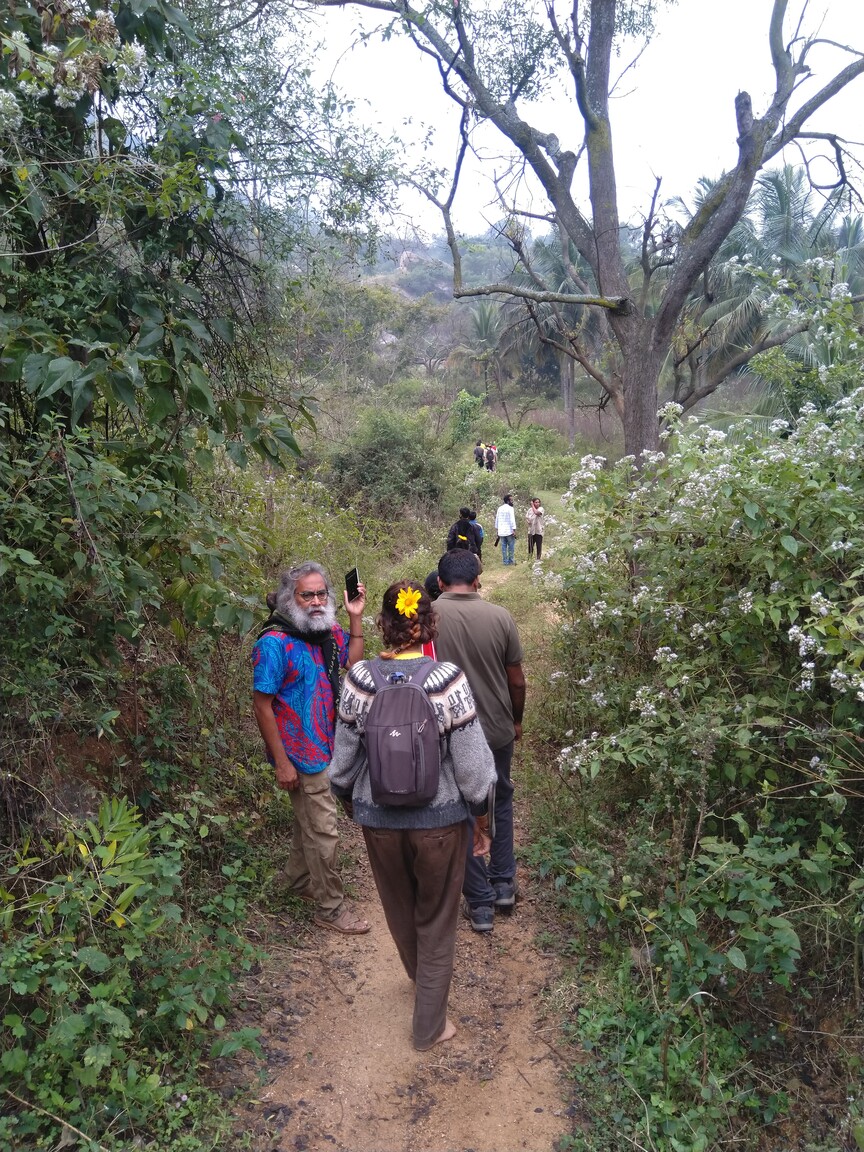
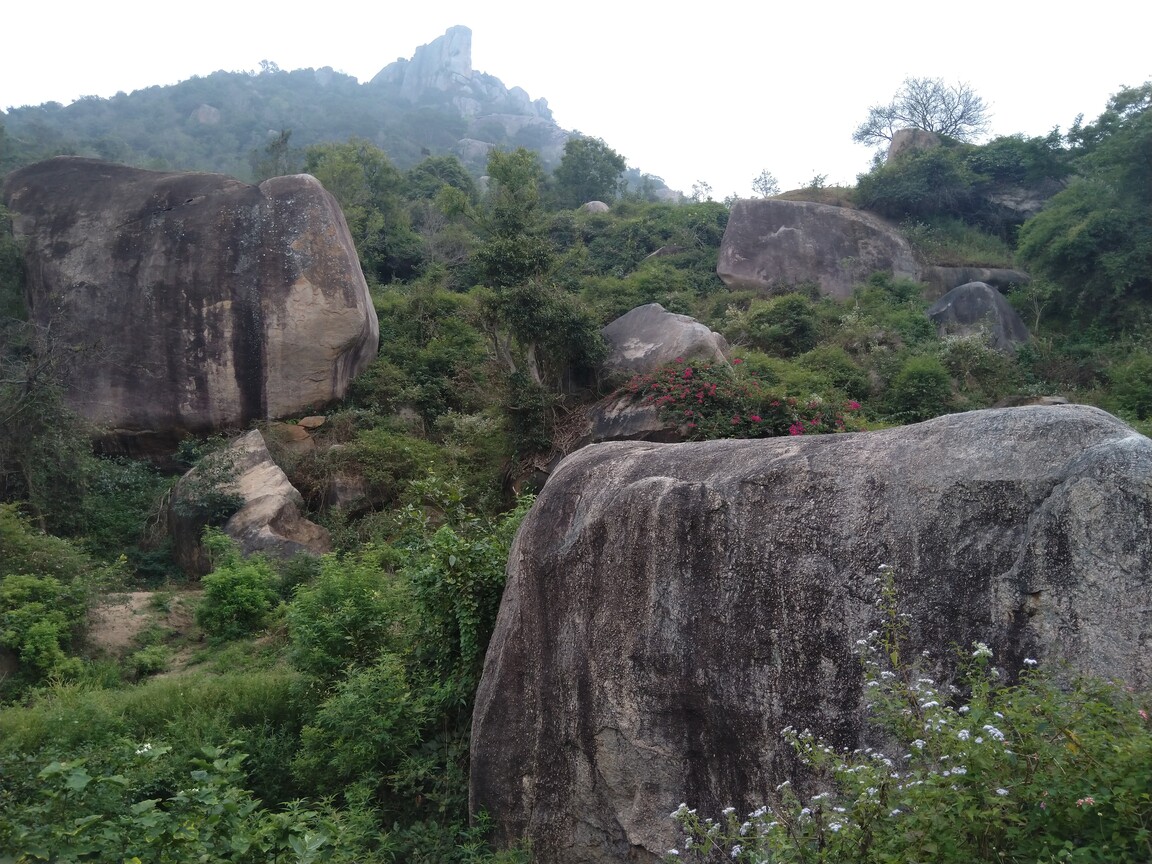
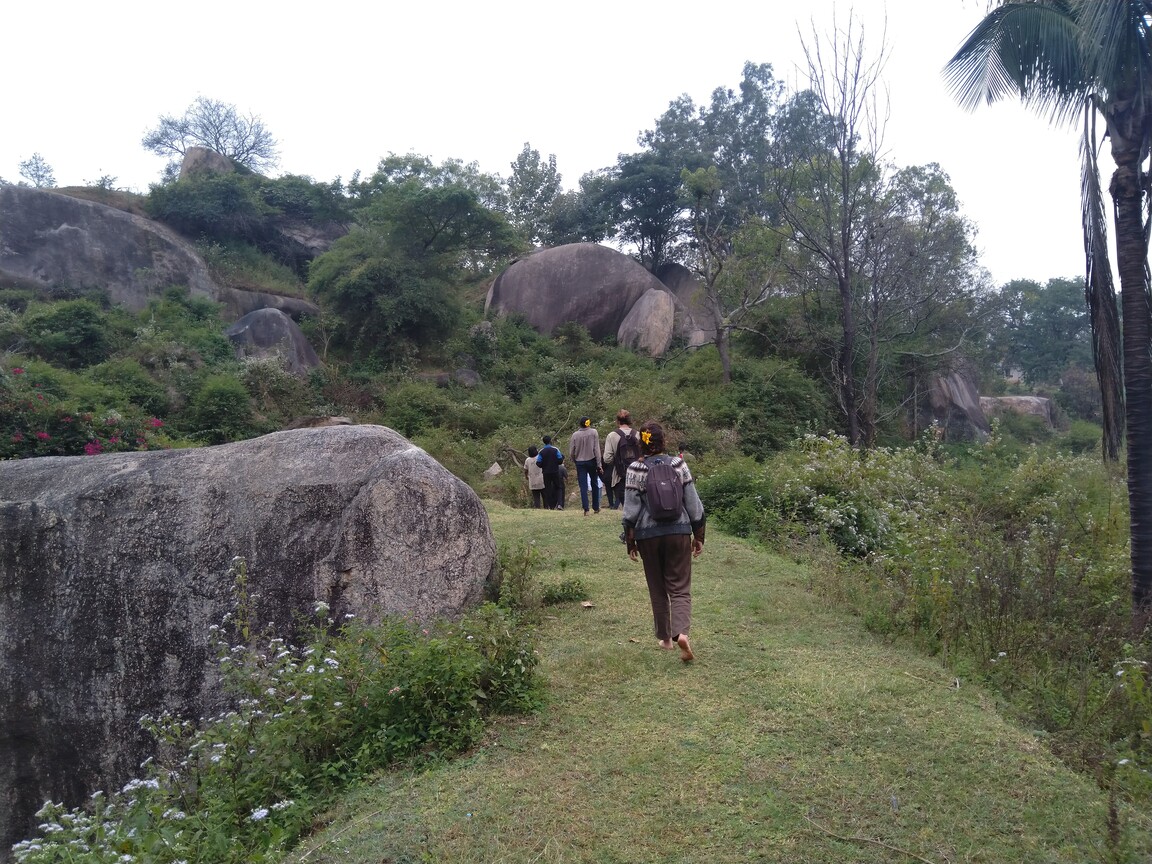
As before, Dinesh would stop every now and then to talk about features ranging from rocks, trees, or local customs. As Dinesh talked about a certain tree at a crossroads in the path, I ran off onto one of the forks, and found myself exploring the campgrounds of The Nomad's Camp…somewhat hastily, so I could cover as much ground as possible and still get back before the others moved on.
Terrifying steps
One of our stops was a broken shivalinga, which we put back together with significant team effort. Behind this shivalinga was a huge rock, many times taller than me. It will be cumbersome to attempt to describe it in words, so I'll let the pictures do that.
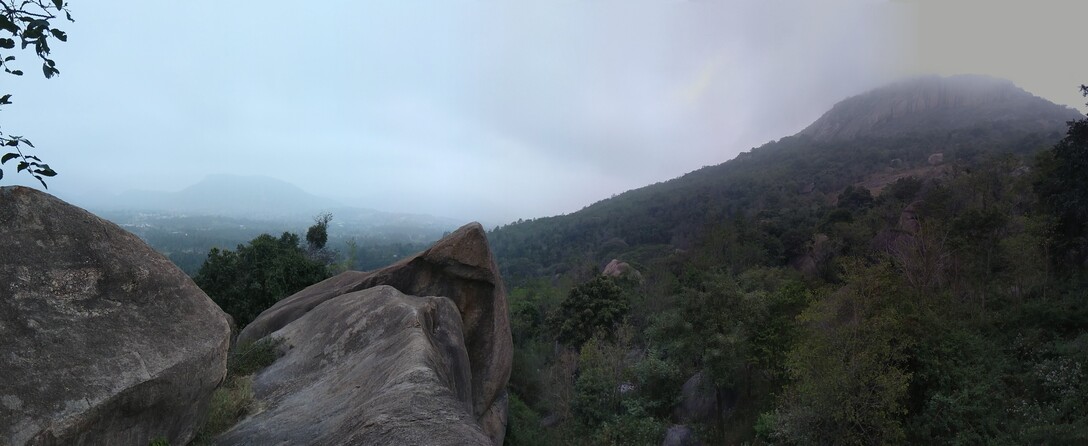
It was Rithikhā who first noticed this rock, I think. She went up to it and, with no footwear nor a shred of hesitation, climbed the edge of the outer slope and strode over to the tip of the pointy rock. I brought up the rear by climbing with the assistance of a tree that grew near the edge, but didn't go too far from the tree.
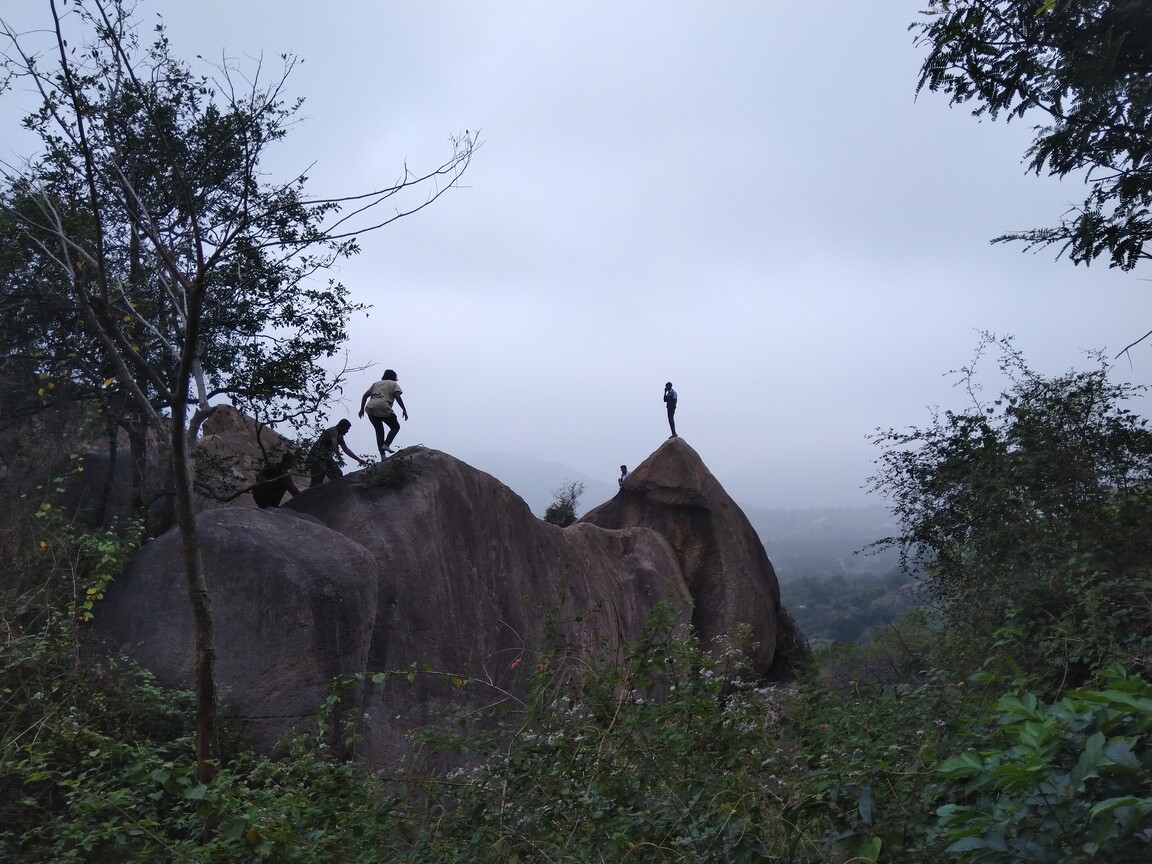
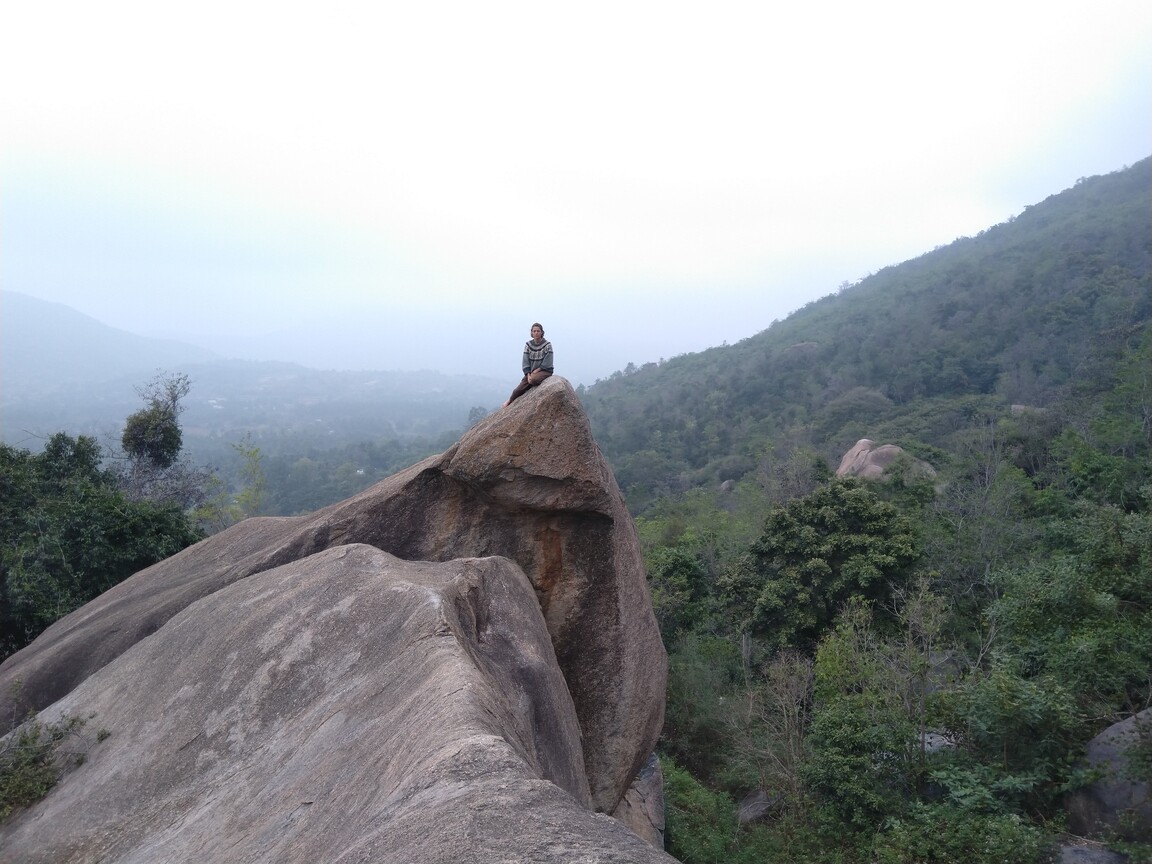
As the rest of the group walked a few paces away and the rock was silent once more, Tanya climbed up and walked over to the tip of the rock. This time, I followed suit…but when it came to crossing that crack you see in the pictures, I hesitated. The crack was roughly a foot in width - nothing I couldn't easily step over…and yet, there I stood, frozen and staring at the crevice. The real scare lay in the prospect of failure - it was at least a few meters deep, and falling in would, at best, entail getting stuck quite literally between a rock and a hard place.
We opted to sit down there - me on one side of the gap, Tanya on the other - and I carefully removed my shoes and socks. Carefully, because it would be quite tricky to retrieve them from the dense brush that concluded the bottom of the slanting rock. I stood up to try the surface with my bare feet. Even now, the smoothness of the rock did not exactly reassure me. Once again I stood there, staring down at the gap as Tanya tried to encourage me in her quiet way.
"Don't look down," she said.
"How can I not? How can I take a step over something like that without looking where I'm keeping my feet?" I found myself thinking, but merely nodded in response.
In a bid to overcome the terror, I tried to make sense of the mess that was my mental state at that moment. Part of me really wanted to, and another part really didn't want to. Move, I urged myself. Move, move!
Frustratingly, my body did not budge. At some point, I heard Tanya say, "It's okay. You don't have to."
With that, we both sat down again in our respective places. My breathing and heartbeat were rapid, as though I had been running. As I carefully put on my shoes again, I related to Tanya the story of the time our apartment flat burned down - how, from the safety of the ground, we looked on in detached, dispassionate silence even as people around us screamed in fear at the sight of the blaze emanating from the balcony.
"It's funny how I could be so calm in that situation", I said, "but a mere gap like this has me so terrified."
If you expected this to be a story of overcoming fear, you are probably as disappointed as I was then - disappointed that I couldn't overcome a challenge, disappointed that I appeared so weak.27 And now I'm putting it online for everyone to read. But I felt rather relieved, too.
We sat there for a few minutes, conversing amidst the green mountains, open sky, and cool, clean air. Eventually, the rest of the group yelled for us from a distance, so we hurried over to join them.
Reunited with the group, we followed the path uphill until we reached this steep and slippery face of rock, along whose side began a series of stone steps. Most of the group frolicked about on the slope, but I stayed within the relative safety of the steps - "relative", for they had their own share of danger. The smooth stone steps were also slippery, the incline was significant, there was no means of steadying oneself with one's hands, and if you looked back, you saw that a slip had the potential to take you quite a long way down.
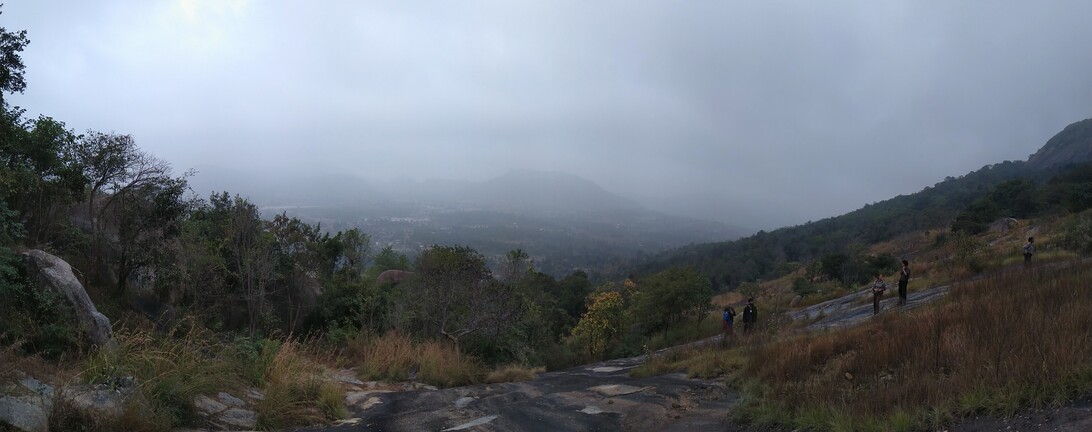
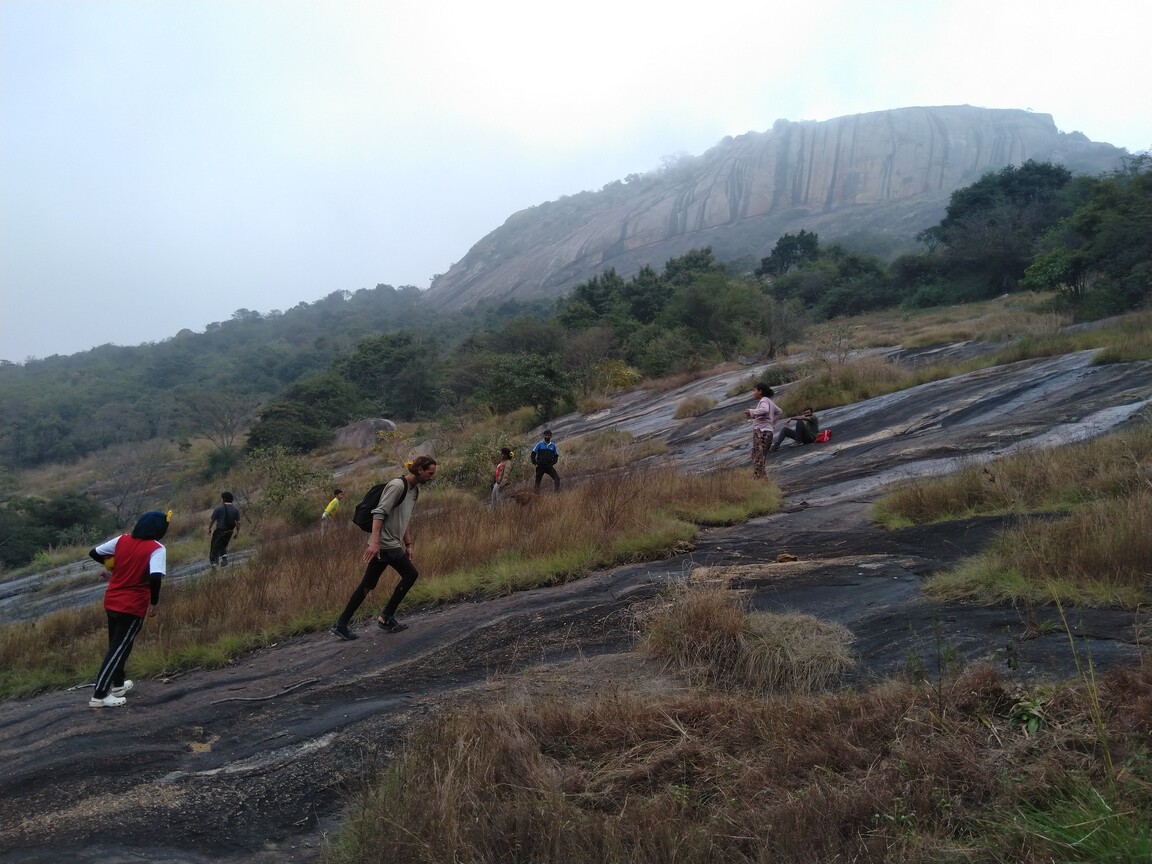
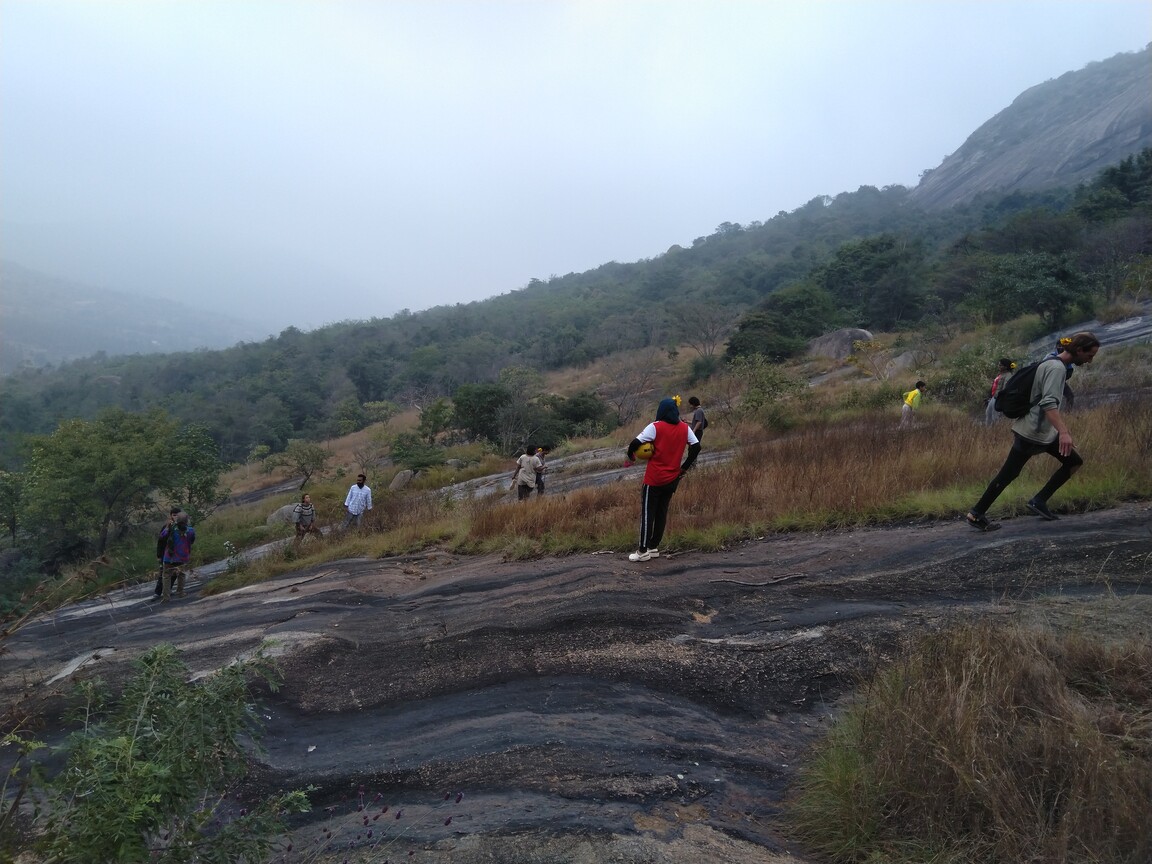
The steps led me to a stone structure - a gateway of sorts, part of an ancient fort. This dark, damp spot had an air of mystery and magic to it - an air which the arrival of the rest of the group diminished, but could not eliminate. I was reminded of the train station entrance in Spirited Away.
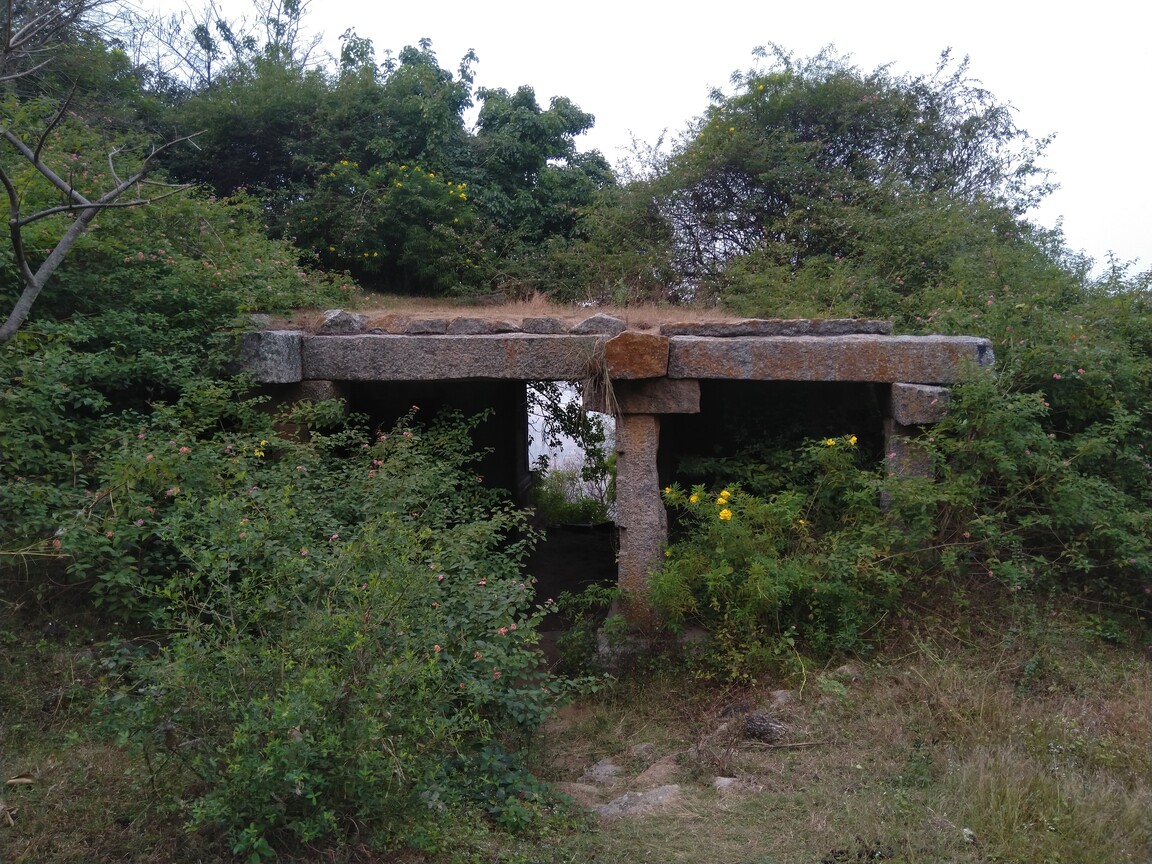
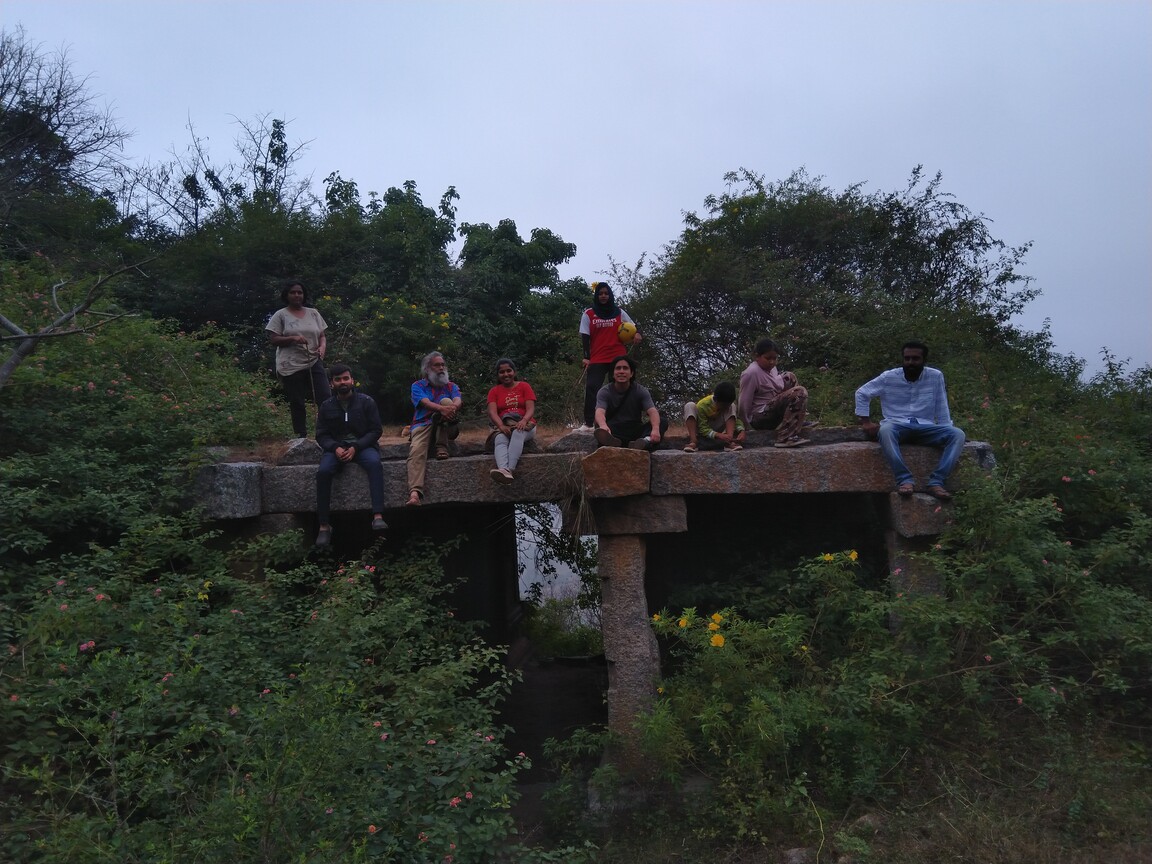
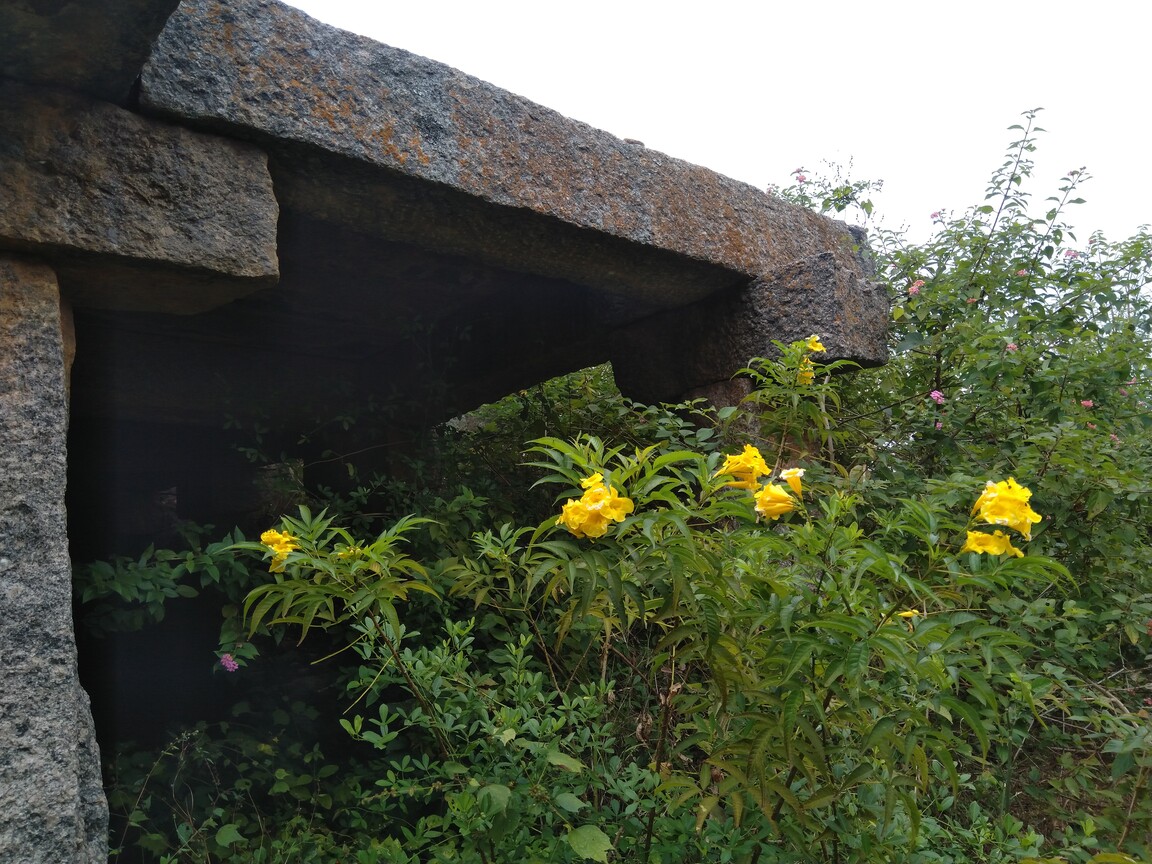
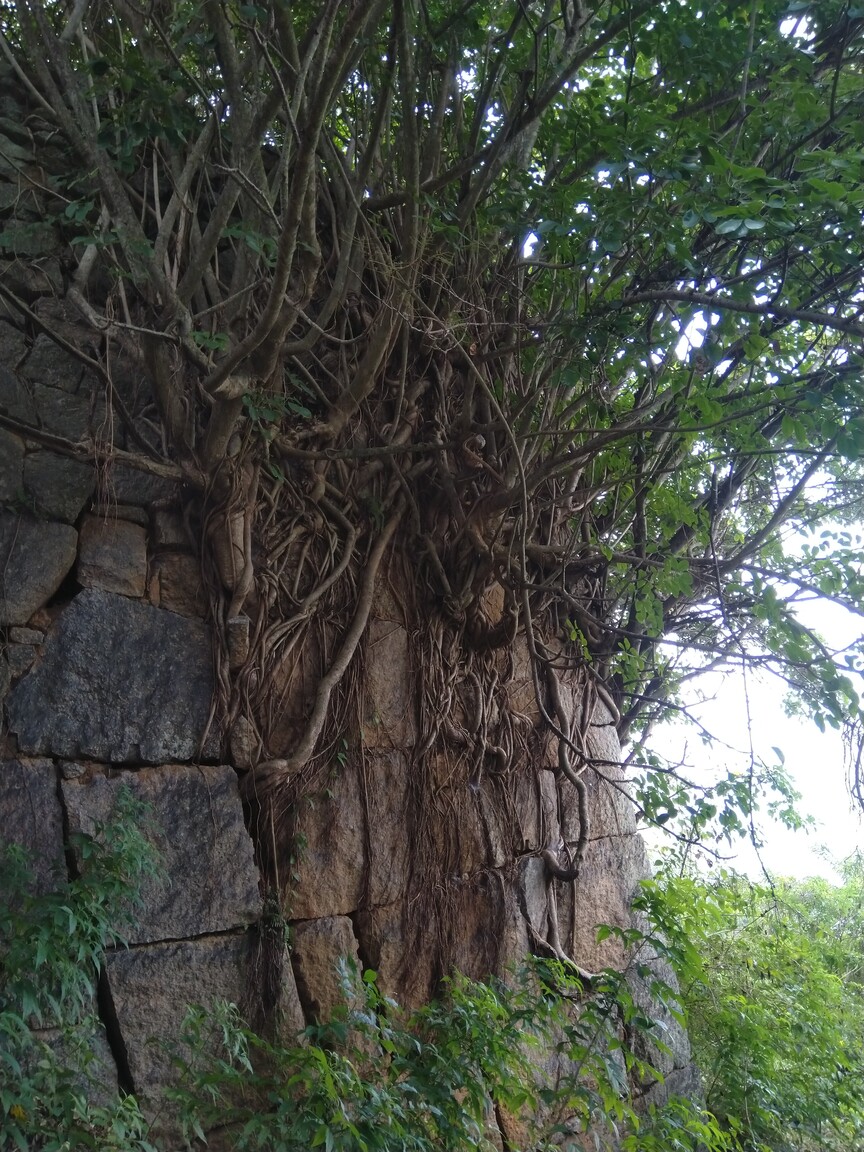
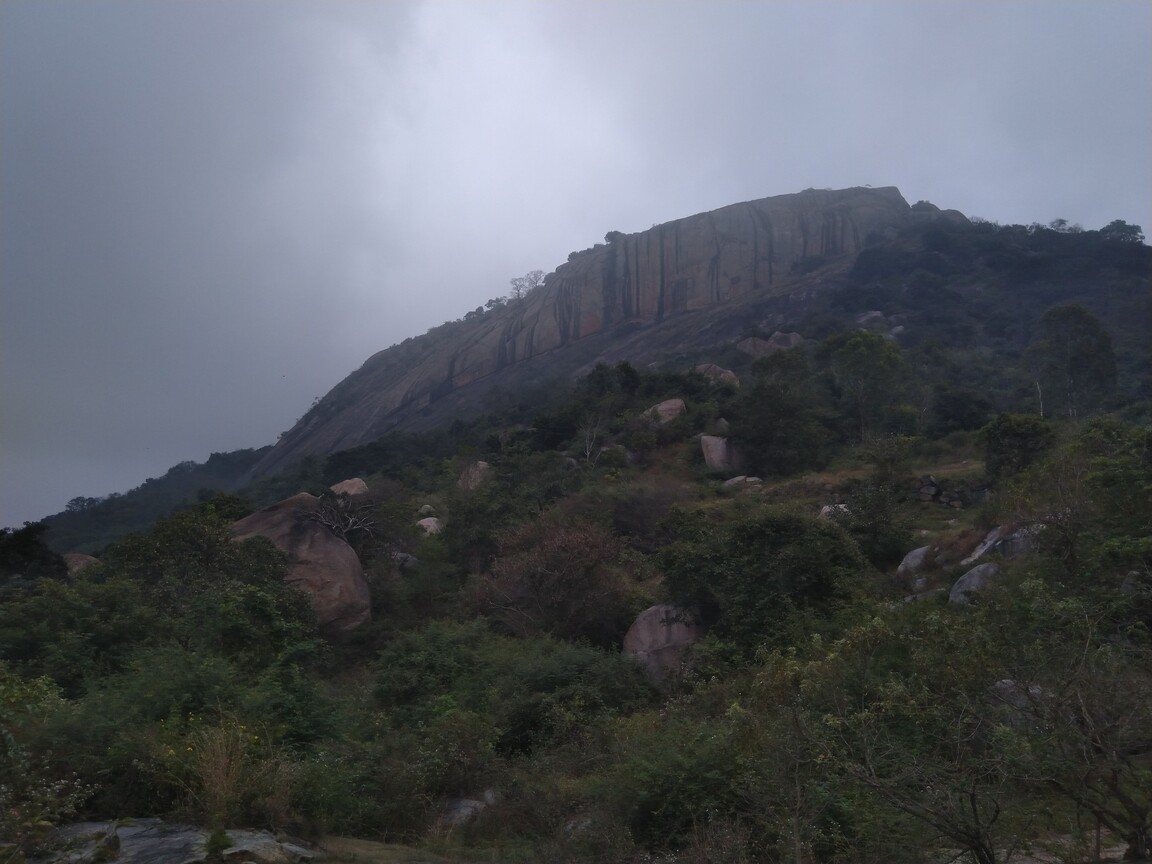
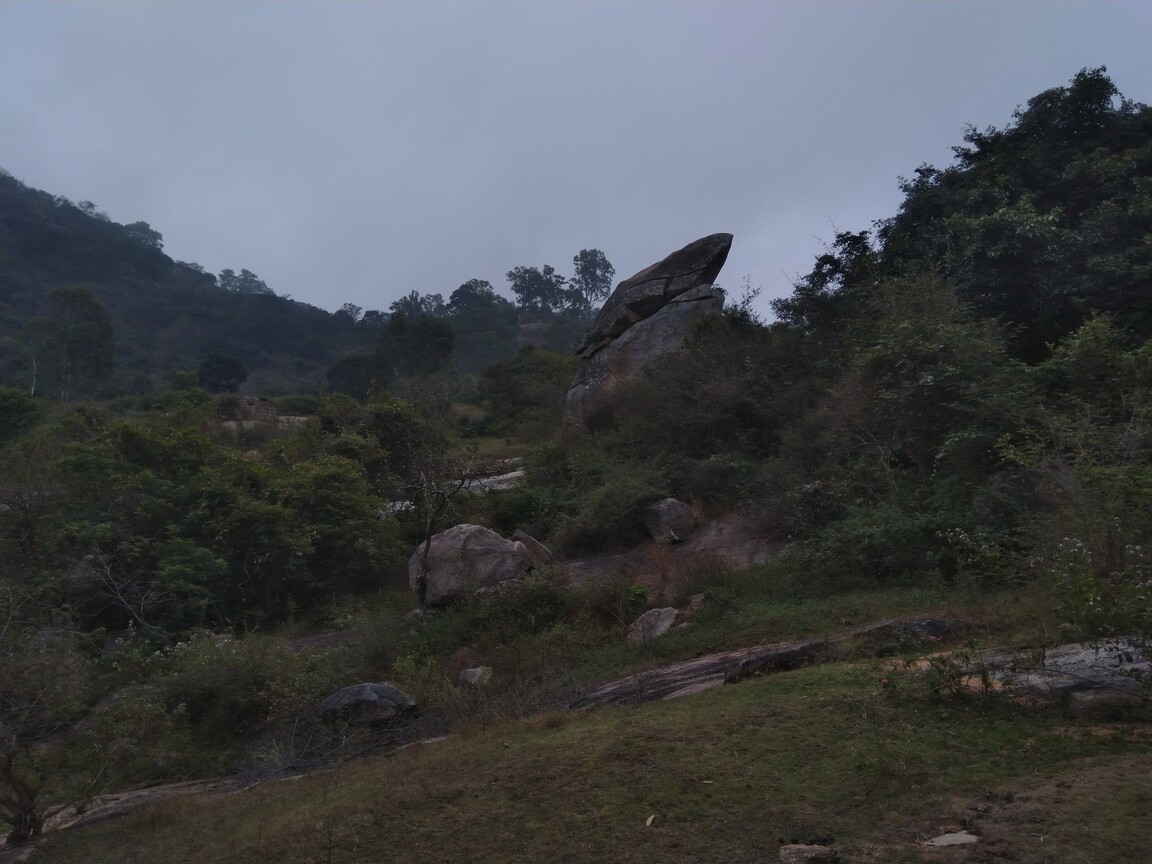
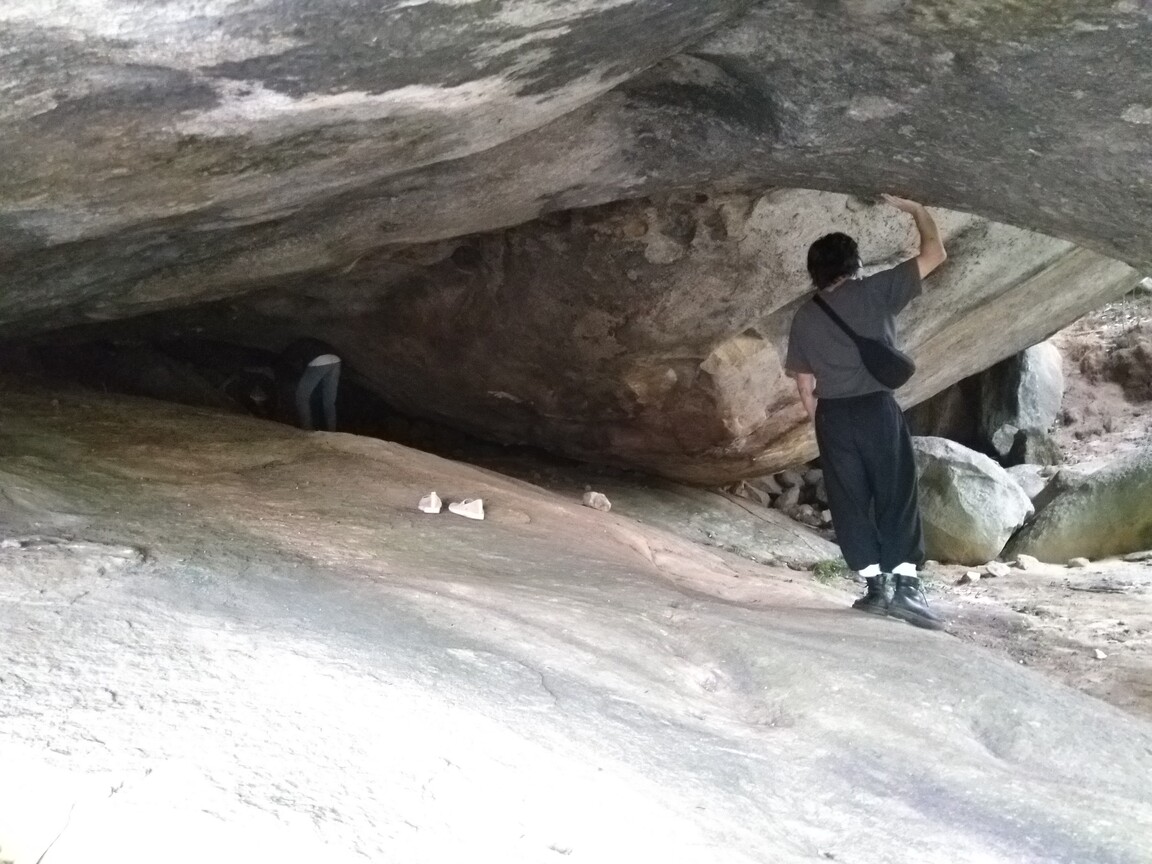
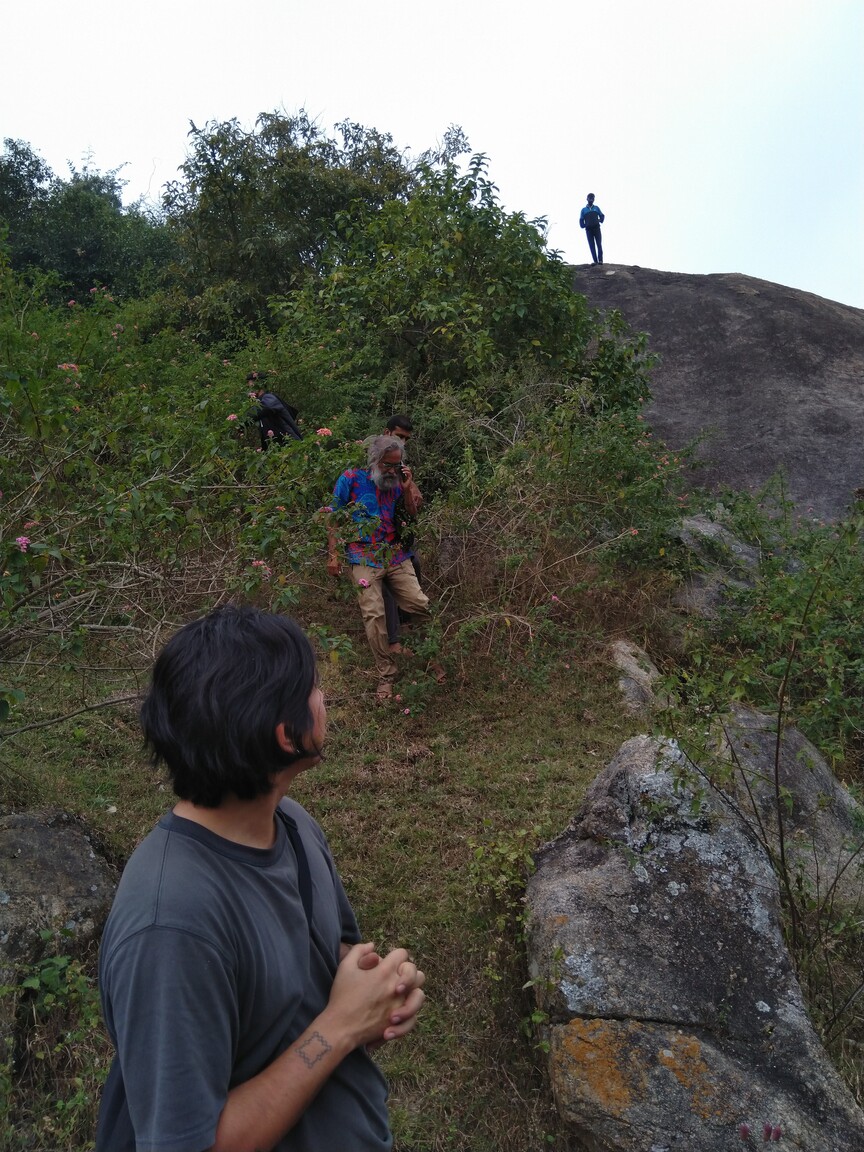
Here, I was stunned to see us run into Sanketh and a few others, coming down the mountain we were climbing. It's still a mystery to me how they got there before us. Was there really another route, as Sanketh said? Or did they perhaps drive to the peak and walk down, and he was merely yanking my chain?
Farewell
We had set out from IruWay at around 8 AM, and it wasn't until noon that we reached the top of Devarayanadurga. We were naturally all starving, and Dinesh treated us to a variety of rice dishes and pakore (green pepper, and I think I saw one with paneer).
With the meal taken care of, we walked some distance away to a small building which housed one of the antennae for COWmesh. It had been a really fun day - full of laughter with Dinesh and the group, complemented by quiet and serene private moments - and I hated the thought of leaving…but I had a train to catch in Bangalore that night.
I bade everyone farewell. Some goodbyes left me surprised and bewildered with their tepidity - I thought we were closer than that. Other goodbyes left me surprised, grateful, and full of emotion with their warmth - I couldn't believe we had gotten that close in such a short time.
I walked away from the building and the others with a burning sensation in my throat, singing the rather apt Leaving On A Jet Plane to myself along the way.
Survey IruWay
I came back to IruWay to pack up my stuff. Here I met Ruchitā, who mentioned being, among other things, a poet in Hindī and Urdu. After all these days in rural Karnātakā where hardly anybody knew Hindī28 And even if they did, I would prefer to speak in English so others may understand and be included into the conversation , it was quite a change to meet someone who spoke it fluently. It was quite a strange experience speaking Hindī after a mere gap of nine days - I almost had to consciously change gears to speak it. I was intrigued by the prospect of hearing poetry written by a professional who is roughly the same age as me - it's a pity she did not come sooner…or that I did not stay longer.29 I feel terrible enough already, brain.
When I first arrived at IruWay, I noted the sorry coverage for it on OpenStreetMap. One day during the festival, I attempted to rectify the situation by adding some data, only to realize that Vivek had beaten me to it and had added significant details to the map. Bless that industrious fellow. Still, there was work for others to do. On one of the last days of AnthillHacks, I had shown IruWay on OsmAnd to Dinesh for confirmation, and he told me it was much larger than that.
Thus began the idea of surveying the boundary of IruWay. I asked Dinesh to tell me about the outline on a map, but between how busy we both were during the event (so much to do for me, and so much to manage, I imagine, for him), it never happened. In my last few hours in IruWay, I asked about it again.
Dinesh did better than show me the boundary on aerial imagery30 Mapping using only aerial imagery from the comfort of your room is called "armchair mapping" in the OSM community. The term may sound pejorative, but armchair mapping is actually preferable for some kinds of data, people, and regions. Still, many of us - myself included - prefer to map on the ground whenever possible. - he arranged for Sanaj, Satheesh, and Māhādev to accompany me around the boundary of IruWay. Satheesh, Sanaj told me, was the previous owner of the land IruWay was based on. Sanaj acted as translator between me and Satheesh, for the latter knew as little English or Hindī as I knew Kannadā.
We started off on the same path as the morning trek. Satheesh would frequently inform us about what constituted the boundary - this line of bushes, that line of trees, this rock, that milestone - and Sanaj would relay this information to me, as well as my questions to Satheesh.
As usual, my phone had no Internet. That meant no mobile editing in Vespucci.31 Vespucci can edit offline, but it's so much trouble that I avoid doing it. No problem - I relied on OsmAnd's offline maps and GPS trace recording facilities, and added waypoints to make geotagged text notes. But the lack of Internet also meant that I did not have satellite imagery.32 Usually, I can use existing map data as a point of reference, but the map data for IruWay was too sparse to allow this. Thus, adding a point with any assurance of accuracy entailled actually going to the spot where I wanted to add the point (rather than eyeballing it on my phone).
We passed by the same large tree and path, until we came to a fence. From here, we turned to walk along a narrow farmland ridge which formed the edge of a plantation of palm trees (coconuts? dates?). The surface was uneven and half-dried mud, covered with a layer of weeds and grass.
The plantation ended, but the farmland continued. We reached a deep ditch - the boundary went across, but we, being incapable of flight, had to take an alternate route. This route took us to a steep, narrow, and slippery section of the path, conveniently situated at the edge of a deep reservoir of water - indeed, the very path I struggled to drag my luggage across on the day I arrived. What a poetic way to start and end things…I was full of nostalgia.
Having indirectly traversed the ditch, we headed back towards the Gazebo, and passed it by to enter an area I had never been into before. The earlier limitations meant I had to go off the beaten path, and maneuver through dense overgrowth and uneven ground - areas no sane person would normally venture into. And I had to be fast - I couldn't take too long, or I wouldn't reach Bangalore in time for my train.
Eventually - after climbing halfway up the slippery boulders of the mountain to reach a survey mark, as a cadenza of sorts to our crazy venture - we circled back to where we started. But this was only half of the survey. The next half began in the farmland to the west of the Red Cottage. We took shortcuts through rough terrain rather than safer and more comfortable paths. At one point, the three of them together pulled me up a vertical embankment of mud which was as tall as me (6'), if not taller. Shortly afterwards, the second leg of our survey was finally complete.
I had told somebody in the festival - it may have been Max - about my hobby of contributing to OSM. They asked me what the craziest thing I've surveyed was. Back then, I thought of my surveys of entire bus routes in Delhi which took me from one end of the city to the other and back, but now I had a new candidate. The survey of IruWay was almost two hours of adventure, with challenging terrain, technical limitations, a language barrier, and the pressure of a ticking clock. But we prevailed - or perhaps even succeeded. Fun!
Epilogue
And that brings us to the end of my AnthillHacks 2022 diary. Dinesh tells me that AnthillHacks went on past New Year, albeit at a slower pace, and shares this video of a concert on New Year's Eve.33 I think that's Ādityā from Day 9 on the flute.
I know a participant who did not like the event…listening to them prompted some introspection.
Yes, it's not as organized and tightly-run as the only other event I've attended for anything - the Calcutta International Classical Guitar Festival. This occasionally becomes a problem - see the pizza incident, or conflicting session schedules. Perhaps this is how it goes with unconferences, or perhaps it would have been better if I had been on Telegram like everyone else at the event. I don't claim to know.
Yes, the language barrier frequently left me in the cold from conversations - me asking what people were talking about became a meme by the end 😄 I also tried learning bits and pieces of Kannadā. By the end of the event, however, I had found people I was able to not just converse but make true connections with, so it worked out.
Yes, the lodging is nothing fancy and missing certain amenities, unless you can afford the expensive resort. You may also not find the food to your satisfaction. Even if you wish to cook for yourself, acquiring ingredients can be an issue, unless you can find somebody going to a nearby town, or have the means of transport to do so yourself.
But despite these issues, at the end of the event I found myself wishing that I had stayed longer. Hālekote is a lovely place, especially coming from Delhi. AnthillHacks' system of not demanding payment is a rare one, very much in line with my own values and similar to what I practice in teaching guitar and singing.34 I nearly ended up not going for AnthillHacks at the last minute, when a professional assignment that showed every indication of being greenlit was delayed - I was low on funds and was relying on the advance payment to cover travel. If AnthillHacks had a system of mandatory payment, I wouldn't have made it. That's one of the many reasons why I value voluntary payment systems.
I admire the Janastu team and its aims. It reminds me of Khilonā, the theatre company I worked with for many years - a group of people with a genuine and compassionate drive to improve the world around them. It's one of those rare organizations I wouldn't mind working for myself.
The issues I mentioned force you to improvise. That's a fun activity to occasionally engage in, if done in a forgiving and friendly environment - and the people at AnthillHacks have been nothing if not forgiving and friendly to me.
The issues are also in line with the DIY and somewhat anti-consumerist ethos of the event - or perhaps those are the ethos of Dinesh himself. It's like a FOSS project - it might not be the glitziest thing out there, but it's yours - the provider-consumer dynamic is significantly diminished, and everybody can contribute voluntarily in their own different ways. That's something different from an event like the CICGF, and I admire it.
Lastly, I had a great number of first-in-my-life experiences. The people I met ended up being significant sources of inspiration. Even as I write this a month later, I look back on the experience with fondness and gratitude. Now that I have a better idea of the area and how the event works, I look forward to attending again this year.